#I seem to be creating a recurring theme here. I promise I do more than draw SMG4 characters in dresses. although at this point idk anymore
Note
We've had Smg3 in a dress....
We've had Smg4 in a dress...
Now, for the only logical next step
Mario in a dress!
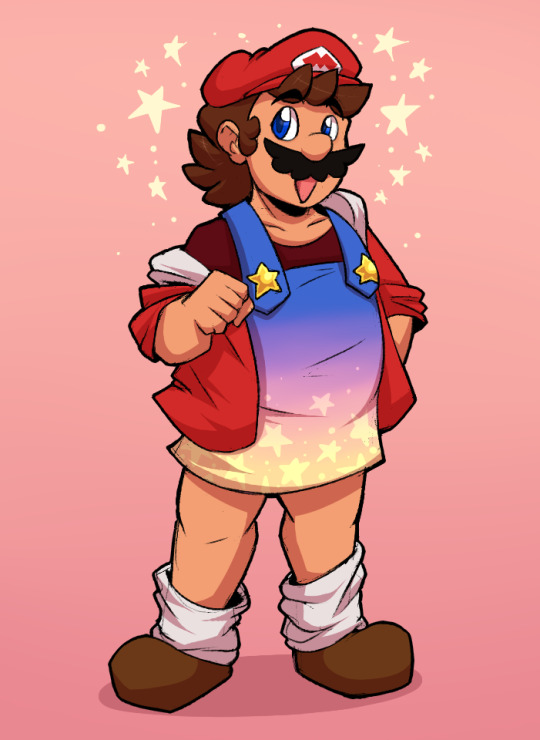
Mario already has his own canonical dress but designing outfits is fun so, he gets his own special dress just for him, because I love Mario.
#mango art#mangos mystery ask box#I seem to be creating a recurring theme here. I promise I do more than draw SMG4 characters in dresses. although at this point idk anymore#what can I say. it's very fun and I love doing it
162 notes
·
View notes
Note
I'm intrigued by Love is Science? but know nothing about it. Can you give me a run down on what kind of thing to expect and who it might appeal to? Thank you!! 😁
Ooooo boi *gremlin smile* I'm glad you asked. You've entered the dragon's den, broken the dam and thus this post turned out to be a monster so I'm gonna link here another post from @accidentallyadramablog which imo gives a nice (and short) overview.
That said let's get into
Love is Science?

Summary :
Yan Fei is a the CEO of the Love is Science marriage agency, that matches people based on scientific data. Hsuan Yu, 8 years younger than her, is a promising young hairstylist who has been in love with her thoughout their entire childhood when she has only ever seen him like a little brother.
Unexpectedly they meet again. Between the way they've each built their lives and how Yong Yan Fei's ex husband still looms over Yan Fei's life, how will their relationship develop this time around ?
Now,
just reading that summary I know what you're thinking.
Indeed, if you have some experience with dramas, you might recognize some TYPICAL TYPICAL tropes – let's get them out of the way :
love triangle (though we all know who she is going to end up with don't we)
childhood friends
'noona romance'
And they are every bit as present and as trope-ey as you would expect.
However, as they say, the devil is in the details.
And particularly, in the side characters. Let me give you a quick rundown of the lot of them :
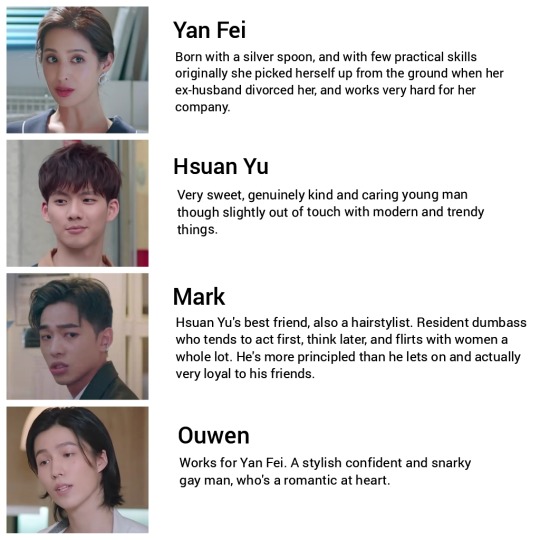

As such, we follow the stories of multiple relationships that develop parallel to one another.
The relationships

• Yan Fei/ Hsuan Yu : Not much needs to be added I think. Their storyline might be the most predictable but they are pretty sweet and heartwarming. pining for like 12 years though poor Hsuan Yu. Anyway you can enjoy it or find it boring or but you can't hate it.
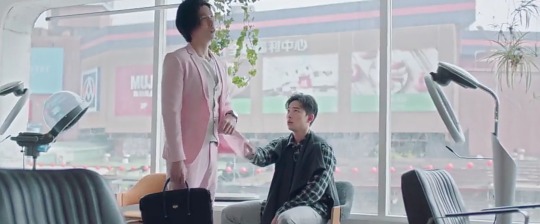
• Mark/Ouwen : Noooow we're getting to it. Their dynamic is so... Refreshing and unique. Confident gay with a soft heart and dumb disaster bisexual I mean *chef kiss*👌delicious
After the disasters of their first meetings, it's a cat and dog relationship where Ouwen is the hsssssss don't touch me– cat and Mark is the golden retriever trailing after him not really realizing the rampage he's creating in Ouwen's heart. while Ouwen is like "Remind me why the FUCK I caught feelings again ?".
IDK it just has everything 'Enemies' to friends to lovers, (not actually) unrequited love, pining, sweet moments, jealousy, feelings realization, snarky banter... What more could one want.
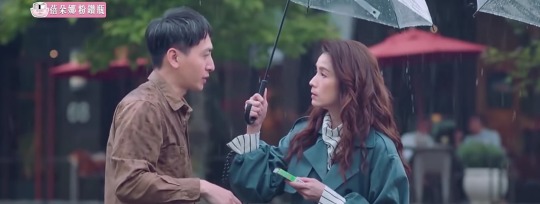
• Cho Nai Hui / You Fu : they are. So. So sweet. Both are older and have experience, and as such they are not so naive or stupid as the youngsters. Them sharing their life experiences and going on dates like typically teenagers (in movies or TV shows anyway) would is refreshing to see and really really heartwarming.
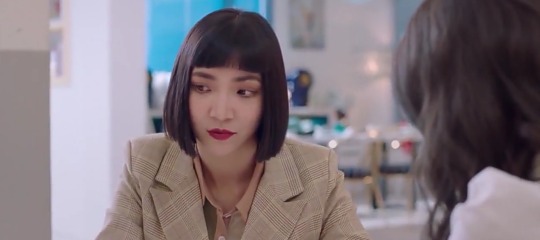
• Liu Sheng Ying/ ??? Her ex ? : The show hinted at a wlw storyline and this arc seems to have JUST begun. Basically Sheng Ying's ex comes to Love is Science as a client and requests Sheng Ying as an advisor, while Sheng Ying still seems heartbroken over her. I can't WAIT to see how it develops.
The friendships :
Something I greatly appreciate is that both the romantic relationships AND the friendships have a great importance in the drama.
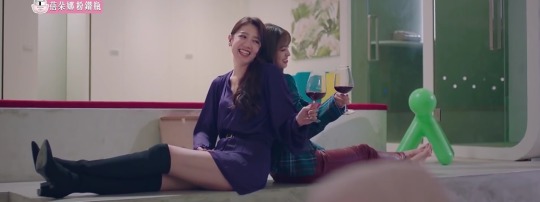
• Joanna and Yan Fei : Jo, queen Jo 👑. She's just here to gossip, get all the gossip and be the voice of reason and we love her for it. You can see how comfortable they are around each other and how they were there for each other during tough times and still are. Kudos to the actresses because I believed the characters were besties in a heartbeat.
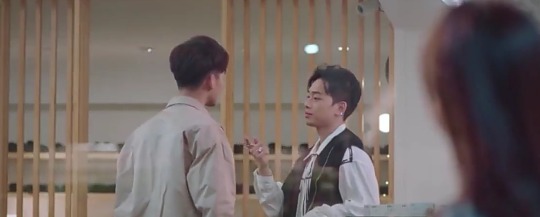
• Hsuan Yu and Mark : they are honestly... Such polar opposites you kinda wonder how they became friends but they are and it works perfectly.
Hsuan Yu still hasn't gotten he maybe shouldn't take Mark's advice, and Mark still hasn't gotten that he, definitely should take Hsuan Yu's. It also enables to develop a more playful and mischievous side to Hsuan Yu, giving him more depth?
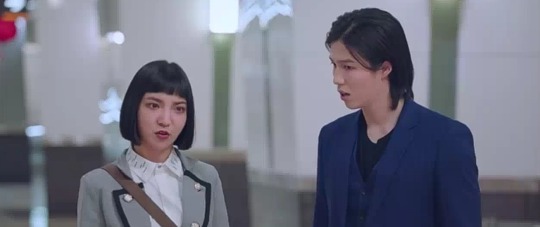
• Ouwen and Sheng Ying: rivalry to reluctant solidarity to friends-but-i-will-deny-it-if-asked to just friends. IT'S GREAT
I also ejoy the fact that these multiple storylines are allowed to coexist. The romantic ones, the friendships, older, younger, m/f m/m and f/f like take your pick !! And tbh a WLW storyline ?????? These are so scarce I will take anything.
The recurring themes :
The show more or less subtly touches on some topics/issues, to which the dating aspect contributes to.
A non exhaustive list would be
Divorce, and how divorced women can be viewed as failures for some reason
How successful men over 30 are sought after but successful women after 30 are somehow deemed undatable
Preconceived notions and homophobia
And beyond the topics, there's just things like... Joanna not being interested in long term relationships nor wanting to get married, reporting sexual harassment, older people going on dates.... I'm not saying it's a groundbreaking activist drama –which is not really what I was looking for– I just appreciate the fact that it is a pretty mainstream drama and that these things are there.
Mad respect if you've made it up to here ! but we're not quite done yet.
The cast and crew :
The other element that made this drama stand out for me besides the side characters is the cast.
It might be weird that such a meta thing impacts the appreciation of the show but it did, for me at least.
📣📣TMI WARNING 📣📣
For me what happened is I stumbled onto Mark and Ouwen cuts on YouTube, then somehow onto the behind the scenes. They weren't subbed at the time so I could barely understand a word of what they were saying, thus I'm not sure what but something about how the rest of the actors, the director and the crew were interacting just told me it was a show worth watching or at least checking out.
📣📣END OF TMI📣📣
The cast honestly seems to have a blast and to have, how to say it, come together really well. It seems like most of them have become genuinely friends, or despite differences in personality have truly enjoyed working with one another and with the rest of the crew, and it shows.
Where it's lacking
In my opinion the show does have some aspects where it underperforms.
As previously mentioned, the main plot is kinda tropey, furthermore, in a drama typical fashion when something is about to get resolved, immediately something else happens. Nothing unexpected from a drama though.
The pacing : Some moments of the main plot especially dragged on, so I admit I skipped through some parts.
Because I feel so strongly about all the characters though, I don't really mind the previously mentioned points. I just think it's a shame because I feel like if it had been crafted a little bit better it could have made the show go from an 8/10 good drama to an 11/10 friggin amazing drama easy.
Lastly, there is a pretty unequal time distribution so Yan Fei and Hsuan Yu do tend to occupy the most part of an episode. However some episodes are more centered on some pairings (like ep 11 that will probably have an important Mark/Ouwen part).
Overall
it's a drama that warms my heart, as simple as that. It's not that deep, it's pretty funny, the acting ranges from good to excellent and I have taken a liking to a lot of the characters, which is what I think fuels my interest for the drama.
And I feel like it managed to attract a wide range of audiences because the romances and relationships are so diverse. Whether you watch the show for its entirety or for one aspect/storyline/character is entirely up to you and I feel like the creators of the drama are aware of it as well : and you can easily find subbed compilations about each specific pairing on Settv's official YouTube channel.
Take that aspect that you like–if you find one of course–and enjoy it, that is all ¯\_(ツ)_/¯
What's left to say besides.... 🎉🎊 Congratulations for making it to the end of this lengthy post !
#I add a tmi warning in the middle as if this entire post wasn't one lengthy tmi lol#long post#love is science?#戀愛是科學#lian ai shi ke xue#tw drama#taiwan drama#taiwanese drama#honestly thank you for this opportunity to talk about it#it made me happy heh heh heh#oh and if anyone else of the 15 people who like the show want to add stuff share your thoughts or highjack this post go ahead#lis?
87 notes
·
View notes
Note
This is gonna hurt, but “Why can’t you just look at me for one god damn second!” and/or “Let go of my hand” for cleon :’)
So this story is completely self-contained and is not affect/doesn’t affect any of my other stories or the “canon” universe that I have created in my own little brain.
It does take place in the time period after Leon’s mission at the beginning of Vendetta but before his mission with Chris.
He’d known about her upcoming mission for a while now. He should have had time to come to terms with it. All things considered, it wasn’t that bad. Terrasave’s work was mostly done after all the fighting and bloodshed had ended. With the amount of armed, trained guards patrolling the area, Claire probably couldn’t be safer. And yet, his mind still ran rampant with images of monsters and men and traitors. All of them always end in the same way - Claire bloody and lifeless on the ground.
So, when it came time for her to leave that night, Leon couldn’t find it in him to let her go.
“Stay” he’d said. One simple word that held so much weight.
“Leon, you know I can’t. I’ll be back in no time.” She’d responded candidly, leaving a gentle kiss on his lips before attempting to pull away.
Claire was used to dealing with a pouty Leon when leaving for an assignment. She assumed this time was no different. He’d complain, they’d go back and forth for a bit, she’d kiss him and then he would let her go so she could do her job and return to him. Sweet and simple. This time, however, was neither sweet nor simple.
This was the part where Leon was supposed to let go, except he didn’t. Confusion flooded Claire’s features while Leon’s hardened with seriousness.
“I’m not joking Claire. Stay. Don’t go. It’s dangerous.”
“It’s always dangerous Leon but that’s never stopped us before.”
He was resolute both with his words and the way he was holding her - like if he loosened his grip at all she’d be ripped away from him forever.
“Well, maybe it should.”
Claire stepped as far back as his tight hold would allow. Looking up at his face Claire saw a look in Leon’s eyes she’d never seen before. Hearing the great Leon Kennedy talk this way was unsettling.
“Leon, you don’t… you don’t mean that. You’re just tired from your last mission -”
“No, Claire, I mean it.” his arms moved from around her waist and up her arms until he was holding her just below her shoulders.
His grip was tight, squeezing as if he could forcer her to understand without words.
“I’ve never meant anything more in my life.”
“Leon,” Claire began slowly as if talking to a wounded animal and, in some ways, Leon was.
“Leon, let me go.”
“Not until you tell me you’ll stay.”
“Let me go.” was all she repeated.
He huffed but let go of her. Immediately she turned her back to him and, for some reason, that only seemed to agitate him further.
“You know I have to go. It’s my job to help..”
“Then help from here. Help from home. I mean, stuff like this probably comes with a shit load of paperwork right? Why can’t you do that? Stay here where it’s safe - where I can keep you safe! Please”
Claire turned to speak over her shoulder but she still wouldn’t look at him directly. Leon could feel a part of himself breaking - he knew what was coming next.
“You know that’s not possible Leon.” Claire sighed, “ We all know it’s more than just a job,” Leon knew that the all she was referring to were the people that made up their little family of survivors, “It’s a duty. It’s our duty to put an end to this. This assignment is my duty, Leon. You know I have to go. I can’t believe you’d ask me not to.”
Claire began to move around the room gathering her things. Leon watched silently as she put on her signature red jacket and a pair of sneakers. He called her name when she moved to grab her purse, checking it for her phone and keys. He begged her to turn around but she only made to move towards the door and the small suitcase that awaited her there.
“That doesn’t sound like you, Claire. That sounds like something Chris would say.”
Claire paused at the mention of her brother but still refused to look at the broken man behind her.
“And what if it is. If Chris said it or not it doesn’t make it any less true.”
At that, he snapped.
“Look at me Claire, look me in the eyes and tell me this life is what you want and not what Chris is making you believe you want.”
She didn’t turn around. Instead, she continued to stare at the door as if it were personally insulting her.
“Why can’t you just look at me for one goddam second!” His cry was loud and desperate. He saw her flinch at the severity in his voice and, quite honestly, he’d scared himself a little too. He’d never talked to her that way before.
That seemed to be a recurring theme tonight.
“I can’t look at you, Leon, because I know if I did I’d be too weak to do what needs to be done.”
“You mean to leave. You’d be too weak to leave. The world doesn’t need you to save it all the time Claire. Please, don’t go.”
At that, Claire turned to look at him. He’d hoped when their eyes finally met there would have been love and understanding flowing through those blue irises. Instead, it was a burning determination, and immediately, Leon knew he should have chosen his words more carefully.
“ Oh, so the world doesn’t need me? But you and my brother, it needs you? You get to keep risking your life, right? It’s ok for you but not for me. “
Claire abandoned her spot at the door and made her way towards him still firing off questions she had no intention of allowing him to actually answer.
“Why are you so adamant I stay Leon? Hmm? I never try to stop you when you get a new mission. I never tell you how much it hurts to see you walk out that door every time never knowing if it will be the last time I see you. I never tell you because I know how much your job means - to you and for, well, everyone! So I let you go despite how much it scares me, despite how much it hurts!
“I thought you were proud of me Leon, I thought you supported me! What happened to what you told me during Harvardville? Why -”
“Because I just lost my whole team, Claire, and I can’t lose you too!”
The sudden outburst sent her into a bout of silence.
“I can’t - “ his voice broke, “I wouldn’t be able to survive it.”
He felt heavy and tired. Leon couldn’t hold back the tears anymore as he fell to the floor, crumbling in on himself.
“I can’t” he whispered over and over, “I can’t.”
“Leon,” in an instant Claire was at his side.
“Is that what - you never told me. I knew it was hard but…” Claire didn’t know what to say.
“I didn’t want you to know. How could I tell you I failed, Claire. How could I tell you I let all my men die when I’m supposed to keep you safe?”
“Leon.” His voice was solid, the pillar that he needed right now to lean on.
Claire grabbed his face, pulling him up to look at her this time.
“ I’ve never doubted one moment that you wouldn’t do everything in your power to keep me safe. But it’s also my job to keep you safe. Let me help you, Leon, open up to me.”
“I’m sorry,” was all he managed to get out through the tears.
“It’s ok.”
Leon opened his mouth to speak but was interrupted by a shrill sound coming from Claire’s bag by the door.
“Shit!” she cursed, as she got up quickly to silence the offending object.
“Fuck, it was Neal. He’s probably wondering where I am.”
“It’s ok. You need to go.”
“Leon,” Claire turned to see Leon was now leaning against the couch, still on the floor but now upright.
“I can’t. Not right now.”
“The world needs you.”
“You need me!”
Her protest died at Leon’s signature smirk. It didn’t look quite right on a face red and swollen from tears.
“Funny how the tables have turned.”
“I’m serious, Leon. This is serious. I’m going to call Neal back and tell him that something with family just came up and I can’t go.”
“No, you’re going to call Neal back and tell him that you’re running a little late, but you’re on your way.”
The look Claire gave was unamused. Leon knew she wouldn’t want to leave him, not after what had just happened. But, she was right earlier - this was her job, her duty. She needed to go.
After a long moment, Claire seemed to have come to the same conclusion. With a sigh, she made her way back to him.
The kiss they shared was long and slow, filled with all the thoughts and emotions that were both said and unsaid. When they broke apart, Claire rested her forehead against his. Leon closed his eyes, relishing in her presence as long as he could before she inevitably had to leave.
“I love you, ok?”
“I know. I love you too, Angel.” Leon felt more than heard Claire sigh at the use of his favorite nickname for her.
“I’ll be back. I promise. And you better be here when I get back.”
“I promise.”
They shared another kiss before being interrupted by Claire’s phone again.
Claire was able to answer this time, repeating the message Leon had told her to earlier. When the call ended, Claire made her way back to the door.
“See you later, Leon,” she called as she turned the knob.
“See you later. Claire” he answered before the door closed behind her.
Neither mentioned the fact that Claire chose ‘see you late’ over ‘goodbye’. They both knew why though, and Leone was grateful. He wasn’t sure he could handle a goodbye; see you later was just bearable. And still, neither mentioned how, as Leon promised, he couldn’t look Claire in the eyes.
Eventually, Leon made his way to the bathroom to clean up. When Claire did return because that was the only option - when - he’d never be able to admit that he couldn’t even look himself in his own reflection as he called Hunnigan. Some time away would do him good. At least, that’s what he told himself as he requested Hunnigan make him a reservation somewhere far away and secluded. Somewhere no one would be able to find him.
#Cleon#Cleon fic#resident evil#resident evil 2#Leon Kennedy#Leon S. Kennedy#Claire Redfield#Claire/Leon#cleon is canon#My writing#angst#angst prompt#this was fun#it also hurt a bit
56 notes
·
View notes
Text
A rebuttal against common Hamilton criticism.
As Hamilton is released on Disney+ a lot of people are talking about why it is problematic. Now the first thing I will say is that it is your right not to like this show just as it is other people’s right to like this show. It may not be what you want from your media. And maybe the reason you dislike it is cultural, it doesn’t talk about the issues you want it to talk about enough, it doesn’t address your view of that time period, it isn’t accurate. Your reason for not liking something is valid, even if it’s just that you don’t like it. My problem is when this conversation becomes a moral issue. When it becomes “if you like Hamilton you’re racist”. At the end of the day, one play, no matter how good, has very little significant impact on peoples lives. It’s just a play.
My second caveat is that I don’t interact with the fandom so I can’t address concerns about it.
1. Hamiton doesn’t address slavery.
My biggest problem with this criticism is that it does. Frequently. A major aspect of the recurring line “you have no control/who lives who dies who tells your story” is that Laurens died, the biggest advocate against slavery in the play. The fact that he is a slave owner is used against Thomas Jefferson in the cabinet meeting. In fact “What did I miss?” shows Jefferson coming home to all his slaves. In many ways Jefferson is shown as a bigoted rich person when compared to Hamilton being an “orphan immigrant” because he owned slaves.
The fact that Lin-Manuel did not come out on stage and say “hey guys, I know we’re all having fun here at Hamilton: the musical, but let’s just remember that slavery is bad and a lot of these guys were slave owners” does not mean that slavery was not addressed. There is literally a line in the play “We’ll never be free until we end slavery”
2. Hamilton is not accurate.
Amazingly I see this a lot. Hamilton isn’t accurate. Honey, of course it’s not. In the same way that Drunk History isn’t a reliable source, neither are Broadway musicals. Of course artistic liberties were taken, did you not see the cast. The whole point of Hamilton is that it is a retelling of a story that traditionally did not include people of color. This leads us to our next point.
3. Hamilton “romanticizes” a multifaceted history.
“Romanticize” is a critique that is perfect for taking a moral high ground because it is as vague as it is subjective. I don’t think the play shies away from the problems with the founding fathers. As I said before, Jefferson is 100% represented as a bigoted slave owner. The fact that you liked him, that he is charismatic is because that’s how people are. Do you really think every racist is like Donald Trump? The history of the world is the history of charismatic people getting away with murder. A character can be both likable and a bad person.
Hamilton himself is shown as a rash, impulsive person who frequently makes bad decisions that hurt not just himself but his family. Washington is shown as heistant and reticent to change. Eliza is shown as loving but weak and in need of protection. Angelica is shown as outspoken but betrays her ideals when she actually has to make a choice for her personal life. Every character is both good and bad, flawed and likable. Welcome to humanity, that’s kind of our whole deal.
When we look at the play as a whole and the major themes people seem to be salty about the fact that it’s not all about how trash America is. I don’t understand the need on the far left to say that the promise of America--that we should have a say in our government, that we should have freedom of speech, that everyone is created equal--is a complete lie. The truth is it’s more complicated than that. Yes, this play shows America as a “Great unfinished Symphony” and the revolutionary war as a major shift in culture. But it also portrays the founders as narcissists who argue and bicker over every little thing and compromise their morals frequently. Because both things are true!
Once again, the fact that Lin-Manuel did not step out and explain to you that America isn’t a perfect country and we still struggle with inequality today, does not mean that that message was not in the play.
Final note
If you look for problems in any media you will find them. Especially when you pick and choose what matters. If Hamilton is not your thing that is totally fine, but it does not give you woke points for hating it. I know it’s popular now to have “hot takes” that involve shitting on anything popular. Take that energy and please put it into protesting, organizing, and voting.
510 notes
·
View notes
Text
TW: Sorry, I’m in a mood. Talk of Suicide. Abuse of prescription medication. Underage drinking. Hints at abuse
It was quiet here in the bones of the old house. Cold. Drafty. Wildlife feasted on the general decomposition of trim. Faded tile and decaying drywall dangling at odd angles. Bricks lay uprooted by greenery. Furniture slowly losing its form was arranged haphazardly throughout the house. Winn could see her breath hang in the air, curl in a tight spiral before dispersing into the night. A single electric lantern kept watch beside a nest of her own making: a bedding of dried leaves, her favorite crochet blanket, and a little radio faintly playing an upbeat tune.
Oh, and a bottle of whiskey and every fucking antidepressant and mood stabilizer those bastards had ever prescribed for her.
Playing eenie meenie miney mo, she uncapped a half-empty bottle of citalopram and popped all of it into her mouth. She took a swig, throwing her head back to ensure she swallowed. Looking around she supposed it was a fitting epitaph. Her end would be here, in this broken mausoleum, a showcase to humankind’s fundamental need to create something sublime but ultimately fail in its maintenance. To conceive something beautiful but become indifferent and bored with it, letting it fall into ruin. Wreckage that is only redeemable by nature itself. It would be nice, she thought, if something productive, beautiful even, grew out of her decaying life too.
Then maybe everything would have been worth it.
Absently plucking at weeds poking through fractured flooring, she huddled over on herself waiting for the drugs to take effect. Her stomach turned as she tried not to think. Tried not to repeat the same question over and over in her head.
How many times did she have to lose everything to take the hint? How many times did she have to hit rock bottom before her knees buckled and her legs snapped trying to stick the landing as she broke herself to please everyone?
For her, the answer was four. Not that that matters now. Cause now it was too late. Now she finally gets it. Now she gets why her Mami was so unhappy. Why Miami's boyfriend, Leonard, wasn’t happy. Why her doctors weren’t happy. Her teachers, her friends. Everyone. Why the world was unhappy. Maybe her death would make them happy again.
A breeze picked up, whistling through the gaps. It sounded like someone was whistling and walking around the house, wooden planks creaking. That should have terrified her but her mind was starting to feel a pleasant, sleepy haziness. She took another half-empty bottle by her feet and downed the contents, choking on her own saliva and the aftertaste of the alcohol.
Thoughts continued to rush in, unabated, like a broken dam. Each empty bottle held its own story, mostly of the times Leonard lugged her to another shrink, to “fix” her while her mother sat in the car, finding solace in a glass bottle wrapped in a brown paper bag. Finishing it before Winn’s hour-long appointments were over.
None of it ever seemed to satisfy Leonard. Not that he ever waited for her to finish her prescription before shoving the next pill down her throat, deeming the previous one ineffective when she would have another episode. Promising that the next drug would be it. That the next one would work. And she believed him. Each and every time, she believed. Whatever was wrong with her, these next pills would fix it.
But they never did.
Soon it turned into, why can’t you be like x? Why can’t you just do x? Your attitude is why x is happening to you. Do you even want to get better from x?
She could put anything in for x. The equation stayed the same, with one common denominator:
Her.
Winn.
She was the shared numerator whose value was always zero. And anything that is multiplied by zero forever equals zero.
Another half-filled bottle, another swig. Her heart started slowing down. So did her breathing, face becoming flush. She was having a hard time keeping her eyes open.
Another floorboard whined under stress, and a voice followed it. “That is an especially painful way to die, dear one,” someone called out to her. “Overdoses can be messy affairs when attempted through the unpredictability of drugs.”
A surge of fright course through her. Who was that? A ghost? Leonard? She didn’t know. They remained out of sight. She looked up through the smog of her mind, unaware that anyone had breached the house grounds. She curled more into her nest.
It couldn’t be Leonard. At least she didn’t think it was him. It was hard to tell right now. It didn’t sound like him. Her chest wouldn’t stop stinging, though, at war with medical sedation and her adrenaline. Trying to play it cool, she schooled her tone, wishing she had a taser on her. Cursing how stupid she was to come here without one. “You lost?” she called, scrubbing her face with the bottom of her palm, her coordination clumsy. “The main road‘s that way.” She pointed, not exactly knowing if that was the right direction anymore. “House gone to be destroyed in the morning. The bots won’t check to see if anyone’s in here before they start smashing.”
“That’s why you’re here, isn’t it?” he asked, coming into view. It sounded more like a statement. “Because you don’t think anyone will find you before they start demolition.”
She squinted at the man in an impeccable blue suit, refusing to answer. Definitely not Leonard. But…
“Mmm, I know you,” she said scrunching her eyes, fighting to place the face, fighting to find a name. Yes, she has seen him somewhere, but her mind could only remember one location in which she encountered him. A place shrouded in metaphoric perception and youthful symbolism. A place that is both romanticized and villainized oftentimes in the same breath. A place she could only visit when she closed her eyes at night and slipped from this reality to another.
“The man of my dreams. How—?” She swallowed, thoughts tripping over themselves. Her speech started to slur. He squatted in front of her, full weight on the balls of his expensive shoes, keeping his immaculate attire away from the dirt of the house. He moved gracefully, and though his smile looked concerned it was still every bit disarming.
“Uhh, I mean man from my dreams,” she stammered. “Uh, how is this?” It dawned on her. The part of her mind that was still intact. “Hallucinations. I’m dreaming. I-I’ve passed out.”
“You have not,” he said, making no move towards her. Simply staring her down with hooded eyes. “At least, not yet. And though I am, how did you put it, ‘the man of your dreams’, I’m not some figment of your imagination, Winnifred. I am quite real, and I’m here.”
Winn barked a laugh, “Oh my gods, for real? ‘I’m here’?” she mocked. “Everything’s good, I’m here.” She grabbed the bottle, his eyes following, and took a sip. “Fo sure, like that would really matter now. You can get your damn hair swirl outta my face with that.”
She made a move for his hair, uncoordinated and choppy, catching herself when she leaned forward too much and fell onto her hands. It took a while. He remained still for her, attentive, but unmoved. She was able to ruffle his dark blond hair out of its slicked-back position, wrapping a finger around the bit of lock that fell over his brow without falling again.
Their eyes met.
Realizing what she was doing she yanked her hand back as if burned. Confusion swept through her. He raised an eyebrow, the corners of his mouth twitching. “Convinced?”
“I can touch people in my dreams, it’s just...” It’s never felt so real.
She reached for another prescription. Clearly, she was delusional. Clearly, this was a trick. She poured out the oval-shaped pill preparing to swallow it whole. It was quite possible that she was out cold, body slumped over like the furniture of this house. Quite possible she was unconscious and this was her mind’s last chance at providing her with a final comfort. A childhood sentential to keep watch as she fades away.
She tilted her head back, arm poised to sling the pills into her mouth.
The man moves.
He shifts to catch her wrist in a light but firm hold. The bottle slips out of her fingers, clatters to the floor, along with the pills, dropping between boards and out of reach. Winn curses.
“Don’t touch me,” she said pulling away easily. “You don’t know me like that.”
“Listen to me, Winnifred,” his voice held a command. “I have not moved heaven and earth—I have not rescheduled my life just to watch your throw away yours. I do know you. I’ve known you since you were four years old. I’ve visited your dreams since your first nightmare. I’ve watched over you the best I could from afar.
“When I said, I’m here now, it wasn’t meant to be crass or derisive. So many people have let you down in your life, I being the chief among them. But I am here now. Things will get better. Let me prove it.”
“That wasn’t real. And dreams isn’t knowing someone.”
He tilted his head. “I know that your father left you when you were six. I know that your mother has been bounding from boyfriend to boyfriend, looking for validation but never really finding it. Each suitor worse than the last. The current beau is a monster called Leonard.”
She gulped, running a hand over her face. Tucking a curl behind her ear. He watched, gaze overly familiar. Possessive without even touching her. Eyes extracting what he wanted. She imagined he didn't take no for an answer. She imagined he changed outcomes to fit his ambitions.
She felt unable to hide.
“I know what he’s been doing to you,” he said, voice changing.
“H-how?”
He let out a breath of air. “I know this because I’ve seen your dreams. I know you’ve been having a recurring one of Leonard assaulting you, and then ending your life. It may happen in different facets and different places, but the theme is resoundingly the same. You also have recurring dreams of your mother’s lifeless body lying on the side of the road while traffic rushes by. Sometimes hitting her, most of the time not.” He adjusted his cufflinks, before completely abandoning his position to sit on the grassy floor. “You’ve been having these particular dreams for a while. It is because you venture into Leonard’s dreams each night, before going to your mother’s. It’s not unusual for someone with your abilities since they are the closest people to you. You’re able to see what Leonard will do to you, whether he’s willing to admit to his own perverse desires or not. And you’re able to view your mother’s darkest fears. Of being abandoned by everyone.”
“You’ve always had a talent for dream wandering and precognitive dreams. You were once able to control your dreams, steer away from the nightmares with my help.”
“I can’t anymore. It’s too—” her voice cracked, and she was reminded of his face. His words. How Leonard taught her to hold her breath, to clamp down on her tongue. He taught her to hide truths, and keep secrets. To bear the scars without screaming, and conceal them. He showed her to shut up while her dignity—her pride—would rage beneath the surface while he was near.
“Those dreams are just dreams. That’s what Leonard said.” She needed to adhere to that. If anything could appease Leonard it was that. And she needed to appease him. Her mother was too weak, too afraid for her own life to safeguard Winn’s, and yet too desperate for a man to head out on her own. Besides if they ran, Leonard would eventually find them. He always found them.
“Trust me, like you once did,” his voice was soft, yet it cut through her racing thoughts like a well-crafted blade. He held his hand out to her, the gesture speaking of promise and nostalgia. Reminding her of how of a strong presence he was in her dreams. The one bit of sanity in an array of insane characters and worlds. He slew monsters, clothed her when she was naked, stopped her before she'd slip into a free fall. Laughed with her. Held her when she cried. He was kind to her. Above all, he showed her tenderness when no one else did.
“Remember me,” he went on, “as I was. I can be that for you again, in this waking land. You can still choose to come with me and leave all of this sorrow behind. Or,” he withdrew his hand when she turned her head, refusing to take it. “You can choose not to, and I will sit with you until you lose consciousness. Then I will carry you to the nearest medical facility where they will pump your stomach, and a physiologist will evaluate you. One not worth the paper their license was printed on. They will, in all likelihood, lock you away in a psychiatric ward, to be forever treated as a pariah. It’s your choice.”
Her eyes jerked back towards him. He said it like a threat. Winn supposed she was running out of time. She wanted to trust him, but… she hadn’t seen him in her dreams for two years. He said that he’s there for her, but he hadn’t been. And she’d learned that being alone felt safer.
She pulled back, making a move to stand. Maybe he’ll let her go. Maybe he wasn’t even here. His fingers didn’t act like a vice when he grabbed her earlier. She easily slipped him then. Maybe she can do it again. Maybe—
Her legs buckled under her, nerve endings on fire. She vomited, hopefully not on him. Gods, not on him. Her vision blurred, darkness edging the rim. She felt hands on her but wasn’t for sure. She was dazed. She needed to resist. Or maybe she needed to give in. She couldn’t open her eyes though was mildly aware of the feeling of being lifted, of a certain weightlessness.
Winn was heaved against a strong chest. Instinctively, her hands went up, fingers curling and uncurling around dream man’s lapel in a display of rebellion or surrender, she wasn’t sure. She wanted defiance but it was so easy to just give in. Darkness claimed her.
Like it mattered because he wasn’t really there. Right?
21 notes
·
View notes
Note
Questions to ask before you finish cql: (a) how do you think the series is going to end for everyone/their relationships with each other and the world at large and (b) what would your ideal ending state be for everyone?
Sorry anon, I keep avoiding this question and watching more of the show instead, and I’m not sure this answer is going to be particularly satisfying because... part of it is that while I definitely speculate on things as they occur to me or as they come up in some context, it feels weird to try to sit down and go ‘here’s what I think will happen’.
And part of it is that this close to the end I feel like it’s less a question of what will happen as... how? And the tone some of those pieces will take, if that makes sense. But the pieces themselves I feel like are kind of... laid out.
So... I think the central plot will be resolved, and Jin Guangyao exposed, and the truth of Nie Mingjue’s death revealed. I think to some extent Wei Wuxian may be exonerated, but I’m curious to see just how far that goes, given this recurring theme of... rumour and story and truth, and what is known and what is unknown, and what is created from those threads, and what people choose to see or remember.
I think some of the main secrets will have to be revealed: Sizhui’s identity, and the golden core exchange, almost certainly. Maybe whatever ‘really’ happened at Nightless City and Qiongqi path, or maybe that will be kept a piece of truth that it’s enough for only a few to know.
I think Nie Huaisang is more than he appears, and very probably has something (or everything) to do with setting much of this in motion.
I think Wei Wuxian and Lan Wangji will get something like a happy ending, given the genre, though it’s hard to say what exact form that will take, especially with the censorship question.
I think some things probably won’t be as resolved, or may be more bittersweet—I have a hard time seeing how this ends happily for Lan Xichen, for instance, and Nie Huaisang... hard to say, but if his motive is revenge, MXTX doesn’t seem to let that end with simple satisfaction, so that too could be bittersweet, or complicated.
I think in particular the relationships between Wei Wuxian and Jiang Cheng, and Wei Wuxian and Jin Ling will have to come to some kind of... maybe not resolution, quite, but there’s so much weight on those that it would be hard not to give them some kind of ending. On the other hand there’s just not that much time left, so maybe it’s that Wei Wuxian and Jiang Cheng finally hug in the end and there’s the promise of moving forward, or maybe they don’t and it’s left bittersweet, but somehow some of the tension currently there in the story has to be released, at least partially.
I think... I honestly have no idea what an ending for Wen Ning looks like; I’m not even sure what I want an ending for Wen Ning to look like, except for him... getting a chance to live for himself in some way, after so long being bound by force or by loyalty.
As for my ideal ending for everyone... they all get some rest? And a whole lot of therapy? I don’t... again, I both do and don’t have answers here; mostly they’d probably mirror the above, but I think this is the sort of thing where there might be some things I’d find particularly unsatisfying, but any number of possibilities I’d enjoy or find interesting.
#this is so indecisive i'm sorry#you'd think i'd be the sort of person who enjoys like#very specific speculation but most of the time?#i like to just see where the story takes me#and then just poke at interesting pieces of it either during or after#asks#anon#the untamed#neuxue liveblogs the untamed#i guess it sort of goes in there
26 notes
·
View notes
Text
Love dies in the city; or the romanticism v. modernism conflict on folklore
In my humble opinion, Taylor Swift’s 2020 album folklore is about the conflict between romanticism and modernism. It sets up the natural as a place of freedom and unrestrained love, contrasting this with the city (presumably New York) as a place of hiding and secrecy that ultimately dooms the integral relationship. In the end, Swift expresses her deepest desires to return to the natural world, to restart the timeline that began with her move to New York, something I will elaborate on when discussing “hoax” and “the lakes.” This storyline is the crux of the album, and the motif I’ve used to classify its songs into six distinct sections, which follow a vague plot that is not represented in the track list order.
the natural (seven, invisible string, betty)
I would argue that “seven” represents the heart of folklore, containing what seems to be the album’s mission statement (“passed down like folk songs / our love lasts so long”) and describing the earliest point in Swift’s timeline. This song is the one most directly linked to nature, describing a childhood friendship that takes place in the woods. One lyric, “before I learned civility / I used to scream ferociously / any time I wanted,” implies that Swift found freedom in nature, when her secrets were mere promises to friends instead of the pain she had since hinged her life on. In addition, this song is pure romanticism. The interest in childhood is implied, we can reasonably assume both main characters to be seven years old. To support this, the song states “although I can’t recall your face, I still got love for you,” implying that much time has passed since the events. There is awe of nature (the “beautiful things” are the creek and the trees), emphasis on the importance of imagination (your dad is mad because the house is haunted), and a celebration of the individual (“just like a folk song, our love will be passed on,” where the love is the individual she speaks of). This is the dream that Swift wants to return to, and yet her characters already face conflict (the keeping of secrets, hiding in the closet, an angry father). She romanticizes her past into something she can escape into, creating a sort of mythos around an upset childhood.
Our next nature-intensive song is “invisible string.” She again makes a callback to childhood, citing a park where she used to read in Nashville. It would not be incorrect to categorize this as a love song, perhaps the most lighthearted one on the album. Swift emphasizes time and fate, both recurring themes in her discography. Like “seven,” “invisible string” draws attention to nature as a freeing and healing space, which sets the stage for her romance. Lines such as “gold were the leaves when I showed you around Centennial Park” draw attention to the ‘invisible’ connection the song depicts. In the bridge, she notes that there was “a string that pulled me / out of all the wrong arms, right into that dive bar,” implying a protection from the dangers of interpersonal conflict. Throughout the verses, mentions of any city stay tangential (“your first trip to LA… an American singer”) while the focus lies on her freedom. It is a dreamlike song, which implies that the city can be glimpsed but not detrimental, and showcases an utter belief in things working out.
It is, then, rather ironic that the final song with unique ties to the environment highlights an unanswered apology after the foundations of romance have been shocked. “betty” is ostensibly narrated by a teenager, James, who plans to make up for her mistake in a garden. This perspective ties into the album’s greater focus on time, in this instance equating innocence (“I don’t know anything”) with a natural setting (the garden, which is explicitly removed from society). At first, James wonders if Betty will allow an apology, but wants it to happen without anyone watching (“if I showed up at your party… would you lead me to the garden”). She then casts this hope aside, dreaming about being able to broadcast her love to the world without fear of judgement (“will you kiss me on the porch in front of all your stupid friends”). It is also, then, relevant that the relationship is ruined when scrutinized (“rumours from Inez”). When considering how themes of secrecy and hiding come into the picture once the narrative travels to the city, it is interesting to look at how the hope of an public relationship prevails here. But in the end, James still dreams of going back to any relationship with Betty, no matter how private (“kissing in my car again”). Of course, Taylor Swift herself is James, and James is Swift, so we know that the secrecy dooms the relationship in the end.
the romance (august, illicit affairs)
“august” describes a doomed relationship, perhaps meant to be the affair James has that prompts her apology to Betty. However, the story of a love that was never built to last has been referenced multiple times in Swift’s discography (“Wildest Dreams” and “Getaway Car”) and even expressly linked to summer on 2019’s “Cruel Summer.” These songs show distinct lyrical similarities to “august.” Hence, I feel comfortable describing this song in the context of those, rather than within the storyline of Swift’s fictitious love triangle. (Which is flimsy as it stands, but that’s for another analysis.) While there is no set location, this song describes one kind of coming-of-age (“whispers of are you sure”) and delves into the hope associated with a short-lived romance. Here, there is no secrecy to speak of, but a fear of what will come when a return to society comes (“will you call when you’re back at school”). My contrast for this song is saying it is “Cruel Summer” without the ‘happy’ ending. There is a privacy here (“meet me behind the mall”) but it is the instability of the romance that dooms it (“you weren’t mine to lose”). “august” is a time capsule, a reflection on the love that always would’ve ended regardless of the locale.
The next song, “illicit affairs,” is another one that ‘visits’ the city (for lack of a better term) but places the primary conflict in a largely undetermined setting. In fact, there seems to be a rejection of the urban (“take the road less traveled by”). In the sorting of tracks as they relate to different sub-themes, “illicit affairs” is the first song that says, without preamble, that secrecy is the death of love. While the word ‘illicit’ simply means forbidden, the verses describe sneaking around in a way that has been attributed to cheating since album release. There is virtually no acknowledgement of another character outside of the two lovers, save for the ‘him’ referenced in the perfume line. But it is not this person that the narrator seeks to hide from, it seems to be almost everyone. It could be construed as a song about adultery, but taken in the context of the rest of the album it reads as a lament for having to hide a relationship (most likely a romantic one between two women, but this is extrapolation).
the city (the last great american dynasty, mirrorball, mad woman)
Now we approach the slew of songs that deal with the actual location of the city. The first song is “the last great american dynasty,” which seems the most removed from Taylor’s viewpoint and yet involves her directly (“and then it was bought by me”). We get an actual move to the ‘city’ (“Rebekah rode up on the afternoon train”) which is reminiscent of Swift’s own move to New York in 2014. Rebekah is immediately disliked by the people around her, blamed for her husband’s death to the extent where she flies in “bitch pack friends.” (1) Keeping with the theme of folklore’s similarity to a time capsule, one could see this song as Swift retelling her own purchase of Holiday House (and by extension much of the events from 2014/2015) through the lens of someone else’s life. Indeed, part of this theory is directly corroborated by the song through the lines “then it was bought by me” and “I had a marvellous time ruining everything.” In relation to the conflict between secrecy and survival of love, “the last great american dynasty” does not offer much insight. However, it effectively sets the scene for songs to come.
(1): I don’t know anything about Rebekah Harkness’ life, this is just how I interpreted the song.
After the initial move, “mirrorball” establishes the new dynamic between the lovers. In turn, it introduces the performative nature of romance in the city (which is referred to and combatted with the line “all these people think love’s for show / but I would die for you in secret” from “peace”). Swift expresses interest in a lover who is “not like the regulars,” who wants more than to watch her turmoil. Still, this song finds her drawn into the nature of performing, consistently showcasing her tragedy to let others see themselves to the extent where she cannot even let her guard down when “no one is around.” Even after the circus has been called off, she seems to have entirely integrated with the role of the mirrorball. This provides some introspection on her viewpoint: digging into insecurities under the viewpoint of desperately trying to save a sinking ship. Almost as a counterpart to “seven,” the lyrics to “mirrorball” show some characteristics of modernism. Individualism is represented through the focus on the person who is the mirrorball, while unrelated characters do not warrant much elaboration. In terms of formalism and experimentation, the format and structure of the song deviate from Swift’s usual manner. The concept of a person being a mirrorball (shown in the music video as a disco ball) is both a symbol and verges into the absurd. All the imagery in this track is based in large crowds; featuring a disco, a circus, and masquerade revelers. It both establishes the setting where love dies and assures that the relationship will end (“the end is near”).
“mad woman” is the final song which establishes setting more than storyline. It proves the city as a angry and dangerous place, one that is not sympathetic to “people like” Swift. We find her contemplating revenge on someone who has done her a great wrong, which is less attached to the general storyline but serves to depict the setting as actively hostile and worthy of contempt. When compared with other tracks, certain lyrics imply that the narrator is hell-bent on getting the last word (“they say move on but you know I won’t” / “you know I left a part of me back in New York”). There isn’t much else notable about this song in terms of what we are talking about, but it does frame several absurdist tendencies in the context of a destructive setting.
the death (cardigan, exile, my tears ricochet, epiphany)
In “cardigan,” Swift reminisces on a long-past relationship, which has been interpreted to be James and Betty’s teenage melodrama. This is the first of many breakup songs, which idolize what has passed and mourn the loss. We observe many signs of the city (“chasing shadows in the grocery line”) and individualism (“I knew everything when I was young”). As referenced in “betty,” the cardigan becomes a symbol for the relationship at large. Moreso, the idea that the relationship was cursed to end as it begun is elaborated on here (“I knew you tried to change the ending”) even if it is not ascribed to secrecy yet. In reflecting on Swift’s past work, we see many signs of her being accustomed to this thought (“I can see the end as it begins” from Wildest Dreams and “I knew (...) we were cursed” from Getaway Car), but “cardigan” comes across with deeper pain regarding the whole affair. In tying different lyrics together (“back when I was living for the hope of it all” from “august” and “I hope I never lose you” from Cornelia Street), we begin to paint a picture of the true narrative behind the love triangle. Swift knew her greatest love would end—desperately hoped it wouldn’t, prayed they could ‘get away with it’—and finally channels her anger and sorrow into this retrospective. She almost accepts it: love dies in the city.
Another reflection on a past relationship is folklore’s only duet; “exile.” This song discusses an inability to communicate, the concept of determined endings (“I think I’ve seen this film before, and I didn’t like the ending”), and plenty of ‘hiding in the city’ imagery. This sees one narrator (Swift) faking a relationship (“just your understudy”) to hide her true lover (in this context, Iver). Both agree on various facets that caused fallout (“didn't even hear me out... never learned to read your mind… couldn’t turn things around”) until the final disagreement (“you never gave a warning sign / I gave so many signs”). So while the song is fundamentally about a miscommunication, it is evident that much of the misunderstanding comes from ways of signalling the secret relationship. Presence of the city is acknowledged through lyrics such as “I’m leaving out the side door,” “out here in the hall,” implying that the narrators share an apartment. Nature also gets a brief mention here (“breaking branches”), but this usage explains that the freedom of the narrators is fading, just like their connection to the natural.
Most do not connect “my tears ricochet” to romantic fallout, but there is no denying that the song hinges around prominent death metaphors. Many metaphors used imply that the narrator has broken up with their lover, but still haunts the hope of what could’ve been. In the line “we gather stones, some to throw, some to make a diamond ring,” a connection to marriage is implied, divorcing the meaning from the loss of Swift’s masters. A crowd of people is repeatedly referenced (the ones in a sunlit room, for instance) and the lover must “save face” in front of them. This external pressure contributes to the greater theme of death of love in the city, which Swift equates to her own death. She describes herself as a recalcitrant ghost (“you know I didn’t want to have to haunt you”) but one her lover must have around (“when you can’t sleep at night, you hear my stolen lullabies”). This song is another one that recognizes Taylor Swift the writer within the lyrics; within this interpretation the “stolen lullabies” are the songs that the ex-lover inspired, work she can no longer look proudly on. While no explicit connections to the city are formed, it is obvious that some external pressure resulted in a damning betrayal, which was painful enough to describe as death.
The final song in this death theme is “epiphany,” which does not discuss the romantic timeline at all. Instead, “epiphany” is the culmination of two sub-motifs on folklore: water and war. In nature, water gains a passing mention in “seven,” but does not truly become relevant in this organization until “the last great american dynasty.” In “epiphany,” the water reference is “crawling up the beaches now,” which serves to distance it from the overall storyline. The song also deals with the war motif (evident in most of the songs, but “ease your rifle” is very literal) and contrasts soldiers at war to doctors during the pandemic. All of this builds on this section’s burgeoning theme of death. It fits in with the album theme, but does not display obvious modernist or romanticist hallmarks.
the chance (the 1, this is me trying, peace)
Opening the album is “the 1,” a frequently disliked song but a very telling one. It is similar to “cardigan” in that it reminisces on a past relationship, but the narrator feigns contentment with her current situation. If all of folklore can be considered a time capsule, “the 1” perhaps describes the headspace of the narrator before they begin reminiscing: convinced they are alright, but not holding up very well. This song involves much city imagery (“I hit the Sunday matinee,” “I thought I saw you at the bus stop”) and deals with the aftermath of many events in the album. It is interesting that this song was one of the last written, as one can imagine the narrator went directly from “it would’ve been fun” to “don’t want no other shade of blue but you” (as described in hoax). The love has died here; but there’s a desperate hope to return (“if one thing had been different, would everything be different”).
Much like “betty,” “this is me trying” is another last-ditch attempt to save a failed relationship. Both songs find Swift in a doorway, ready to apologize, but “this is me trying” bears the weight of experience and less expectation that they will have a second chance. The increased maturity finds acknowledgement of faults without excuse (“my words shoot to kill when I’m mad / I have a lot of regrets about that”) and an attempt to come to terms with the death of the relationship despite pain. This, of course, breaks apart in the bridge (“all I want is you”) but, as Swift consoles herself, at least she’s trying. Setting-wise, this seems to be in a smaller locale (“the one screen in my town”) which calls to mind the “the only thing we share is this small town” from “Death By A Thousand Cuts.” There is also what appears to be a bar (“pouring my heart out to a stranger / but I didn’t pour the whiskey”) and an influx of people (“it’s hard to be at a party when I feel like an open wound”). It is not necessarily the city, but rather a recovery period that does not go well.
If the painful instruction of “illicit affairs” acts as a foil to 2014’s “How You Get The Girl,” then the anxiety of “peace” complements 2017’s “Delicate.” While “Delicate” expresses the sufferance of an early, undefined relationship (“is it cool that I said all that”), “peace” begs the lover to reconsider the end one last time. As “hoax” makes undoubtedly clear, it wasn’t enough. We see the dangers of outside influence (“I’d sit with you in the trenches”) and the strength of the romance (“the silence that only comes when two people understand each other”). It is a final plea for someone to stay, a list of the success and a fatal acknowledgement of the worst. There is a declaration that sums up much of the album: “all these people think love’s for show / but I would die for you in secret.” As we’ve seen from other songs, it is the secrecy and the hiding that has doomed them. Swift sees this, she briefly suggests a return to the free and safe woods (“give you my wild”) but is ultimately stuck on the question of peace, which she wishes she could give her partner.
the return (hoax, the lakes)
The original album closer, “hoax,” finds Swift leaving a part of herself in the destructive city that has become home. She makes an attempt to return to her home, only to find that it is not the way she’s left it (“my barren land”). With her lover, she has gone through a journey that changed her too much to return to innocence (“I can go anywhere I want, just not home” from “my tears ricochet” contrasted with “you’re not my homeland anymore” from “exile,” where the lover becomes the homeland). She turns to a bleak setting, using sparse lyricism and simple constructs to describe her pain and betrayal. While Lover highlights themes of likening one’s love to a religion, the Swift we see on “hoax” has given up on any sort of healing coming from her romance. All she acknowledges is that the circumstances of her love have “broken her down” and “frozen the ground” (from which she hopes a “red rose” will emerge in “the lakes”).
In “the lakes,” Swift tries to move forward but still sets her sights on the natural world, citing a deep desire to escape the scrutiny that destroyed her romance completely. This is a call to action for her former lover, a final request for shared freedom that reminds the listener of the lyric “would you run away with me?” from 2017’s “Call It What You Want.” Swift continues to call on aspects of romanticism she’s referenced on reputation and Lover to make her point. It then tracks that she has been inspired by this muse all along, and is finally asking for a return; both to the early romanticism her albums are built on and to her lover’s “homeland.” Her desire for a new home is evident, her conviction that her former lover should join her too great to be overcome.
The response of the muse to this, of course, is unclear.
#arden speaks#my analysis#taylor swift analysis#this is more than three thousand words#arden's essays
134 notes
·
View notes
Text



You didn’t have to “kill” the son of your late dear friend to get the point across, but okay
I find it ironic that in his efforts to seek the truth, Kamijou denied revealing it to the person who needed it the most. Now it doesn’t mean Kento would’ve taken it well, but it’s possible he could’ve spent fifteen years making peace with his family history and heal, rather than suffer in silence. And maybe Kamijou would’ve found the Sword of Logos traitor faster, which makes Touma’s remarks on comrades all the more significant. Working by yourself results in a limited perspective, and your troubles will take the long road in resolving themselves. This also seems to be a recurring theme with the holder of Kurayami (if Kento’s indeed Calibur III)
To bring in how it’s inevitable to compare the newest installment to the previous series, I couldn’t help but think Saber ends its first arc on episode 15 - not unlike Zero One, which ended mid-episode 16. They even follow a similar structure of rushing through a hero’s journey and getting all those power-ups, though Touma makes comrades while Aruto gained respect. Maybe this means the second arc will build upon the themes the first arc introduced. The question of comrades, promises, the ending of one’s story, the corruption of an organization with history dating back to thousands of years (you could even say they’ve deviated from the source material, aka their original goals, and became something else)

I KNEW ABOUT THIS BUT I STILL GOT SCARED AGH

Sophia disappears in a cloud of smoke, Kurayami is taken by smoke, some Wonder Ride Books vanish thanks to smoke...if anything, Reika’s been planning this for a while. But for what? And how did she enter the Table of Contents without anyone noticing?
Here I thought Touma would take Kamijou’s body with him...but I suppose letting him rest in the place he sought for fifteen years is Touma’s way of respecting the end of his story also Ren would try to desecrate it because of Kento’s fate

And that’s arc one finished! Now for some overall thoughts
The opening is fit for a cute slice-of-life anime and definitely one of the slower paced toku openings I’ve heard (which fits the atmosphere of books), and the ED was unexpectedly very fun to watch! I never skip them
My favourite characters are Kento, Mei, Rintarou and Tetsuo. The latter in particular was a pleasant surprise, because of his awkwardness, practiced grace as a veteran and the sheer insanity that’s his rock-and-roll persona. I suppose Storious’ unsettling politeness makes him stand out from Zoous and Legeiel (who have really similar personalities), but otherwise everyone else doesn’t stir strong feelings in me
The circle on Espada’s head kind of resembles a crescent moon, maybe an eclipse...and considering how important Luna is to Kento...symbolism
I imagine the copious amount of CGI is meant to compensate for limited filming locations, and to give the Wonder World a sense of detachment from reality/otherworldliness without resorting to a Helheim flower. However, it’s a little too much for me. I do appreciate the Sentai flavor it gives to the henshin sequences and attacks, and maybe the element of fantasy is removed when you see the same bridge that’s been used for forty years instead of a colourful paradise, but I prefer henshins that aren’t against a green screen
Taking a moment here to talk about an alternate take with the book theme - not because I hate the Wonder Ride Books and how the system works. I'm just a book nerd who loves my book aesthetics
What if we went with the opposite direction - the stronger your sword aka the pen (the medium with which you write your thoughts), the stronger your book, the story you’re writing, is. Like, maybe each successor of a holy blade starts out with a base Wonder Ride Book. As they progress, they can write more pages for it so it becomes thicker. They can create spin-offs and sequels, the extra books needed for combos. If they go about their mission or motives wrong, they gain an evil upgrade. They then have to evaluate themselves, “edit” their story, until they can see where they went wrong and undo the evil upgrade - or cast it aside by ripping out the pages. Literally. Admittedly this idea is harder to execute, but I find it fun to think about. The saber in your hand....is a pen to write it down...the words to save this world ^^
A lot happens. Like, a lot. I can’t fault the writers for being obligated by Toei to cram in as many toy advertisements as possible, and the cast and staff are doing their best. Beginnings are hard to execute, so a series needs time to get a foothold and know what it wants - especially when Kamen Rider is the kind of series where every episode could change because of cast, popularity, resources, staff meetings, etc. I also approached the series with a mindset I developed from watching Zero One - appreciating what I get. And appreciate I did. Even so, my eyes glazed over a couple of times.
A shower of power-ups, a new Rider on the doorstep, a snippet of lore in the corner, character drama (mostly) vanishing as soon as it appears. Coupled with some odd scene transitions and awkward episode construction/build-up, even when they have the right pieces in place I found myself discontent rather than satisfied at some of the resolutions. Some brief examples I’d include would be the execution of Ogami distrusting Touma; there’s a theme of comradeship but I’m not feeling it outside the main four; Ren in general; Touma’s sudden fear of Excalibur and the subsequent Knights of the Round Table; and Rintarou’s one episode vengeance quest. The last one is especially jarring when, a couple of episodes later, Rintarou (who almost died to get a three book combo) scolds Kento for letting his emotions get to his head. That, however, is a conversation for another time
From what I gather, the second arc is giving the story a chance to breathe. Maybe it’ll be an opportunity for me to not feel so overwhelmed and underwhelmed
The fellowship has been broken up, which could demonstrate how bonds need time to go beyond shallow reassurance (not that I’m against characters instantly getting along, but *points at not feeling the comradeship*)
I also think there’s virtue in the first arc not dwelling on every character, if that makes sense. Most of them only had one episode to establish themselves before the next Rider came (though in Kento’s case he got a longer arc), and having unresolved threads would be a hassle. Not to mention the pandemic restrictions, which likely played a part in very separate character arcs that mostly didn’t intercross, and it’s better to save up your ideas than let the well run dry before the series ends
#14shyx#kamen rider#kamen rider saber#kamen rider ramble#kr.saber: episode 15#long post#there's probably some mistakes because i need to sleep now#i originally intended on writing overall thoughts at episode 10 but i decided to wait until kento got sealed#and then i waited until the first arc ended
12 notes
·
View notes
Text
TMA fic: Night Terrors
Summary: At first, Jon assumes his nightmares are just that: bad dreams. But it's only a matter of time before he is forced to acknowledge what it means to be the Archivist.
Cross-posted to AO3 here.
[Spoilers up to MAG 132. CW for canon-typical horror, unsettling dream/nightmare imagery (think MAG 120), some passive suicidal ideation, and some spider mentions here and there.]
Jonathan Sims has had the same nightmare since he was eight years old, with only slight variations.
Sometimes he is the fly in children’s overalls being offered up as a meal. He can feel the anxious buzz of the delicate wings on his back, a foreign and sickening vibration humming its way across his exoskeleton. Four feet rub together nervously in front of him in an uncanny, insectoid pantomime of hand-wringing. The looming form of Mr. Spider is made all the more horrifying by his hundredfold vision and his inability to blink.
Sometimes he is the larger fly, offering up a victim as sacrifice. He can feel his face contorting, features molded into the horror-stricken face of Mr. Horse that still haunts him on sleepless nights. He is forced to watch his offering devoured, slow and excruciating. After, the monster turns its eyes on him.
Most often, though, he is the spider. Or, rather, he watches from the spider’s perspective, a prisoner trapped behind the creature’s many hungry, glinting eyes, as helpless as a fly caught in a web. The dream sequence unravels in slow motion and he is forced to witness the weeping faces of his intended prey for what feels like hours. Enormous block letters bear down on him, announcing the spider’s insatiable hunger, its demand for more, more, more.
Finally, blessedly, he is allowed to close his eyes, but the relief is always fleeting, for when he opens them seconds later, he sees the aftermath of a massacre: smears of reddish-brown blood coating the walls, the floor, the wilting flowers in their vase.
Then, he hears a knock on the door. He sees many – too many – hairy black limbs reach out to open it. He catches a glimpse of a terrified, familiar, but still nameless face through the crack. He always awakens just as the victim opens his mouth and begins to scream.
Jon may have managed to wrench himself away from Mr. Spider, but the fear and the guilt still cling to him years later, like the wispy strands of a broken web. It’s only right that they follow him into his dreams.
~~~
Jon isn’t sleeping well lately.
Well, that isn’t new. But he’s sleeping even worse than usual.
It shouldn’t come as too much of a surprise, Jon tells himself. The new job is stressful.
The Archive is a monument to entropy. A tornado could have swept through and blown things into a more sensible order than the previous Head Archivist left them. The Archives contain nearly two centuries’ worth of case files, and they're scattered about with no discernible system of organization. Material isn’t sorted by format: cassette tapes are thrown haphazardly into the same boxes as loose leaf paper. It isn’t sorted chronologically: case material from the mid-1800s can be found mixed in with recent statements from the 2000s. As far as Jon can tell, it isn’t even sorted thematically; on a cursory perusal, the statements boxed together seem to vary wildly in content, comprehensiveness, and verifiability.
In fact, the conspiratorial part of Jon’s brain can’t shake the feeling that there’s an eerie sense of curation to the disorganization. The more rational part of him knows that Gertrude Robinson was simply elderly, set in her ways, and secure in a position that she had held for decades. Elias isn’t one for hands-on management in the best of cases; there was little to no risk of him actually making his way into the Institute’s basement to observe the way Gertrude ran her Archives, let alone to actually discipline her for lax work ethic.
Either way, though, the result is the same.
The first thing Jon had noticed when he walked into his new office a week previous was a stack of unmarked boxes against the back wall behind the desk. They were partially covering what at first glance appeared to be fingernail scratches on the floorboards, but he told himself that he didn’t have time to dwell on that and deliberately pushed it to the back of his mind. He could deal with it later – or, with any luck, not at all.
The first box he opened contained a handful of unlabeled cassette tapes, a stack of blank index cards in a plastic sandwich bag, an empty manila folder, a nonfunctioning USB thumb drive, and a mess of loose papers with no coherent theme: some fragments of personal correspondence (unsigned and handwritten on yellowed paper in nearly illegible cursive), the scattered typewritten pages of a statement (pages 2 and 7 of 10 missing, presumed lost), and a hand-drawn map of what looked like a labyrinth. The second and third boxes contained more of the same: scattered documents and a yawning void of context. The fourth box was completely empty. The fifth contained only a single matchbook with a faded spider printed on its surface, rattling around the bottom of an otherwise vacant box.
Unmarked boxes, improperly-preserved documents, no rhyme or reason, a layer of dust, and an ignition source. It wasn’t a good start – and, unfortunately, it seemed representative of what the job was going to look like, at least for the first few months.
But beyond that, Elias had been insistent that Jon begin creating audio recordings of statements as soon as possible. Jon had initially chosen to interpret “as soon as possible” to mean “as soon as everything is organized,” and after seeing how big of a task that was, he was careful not to promise a time frame. After the third email from Elias inquiring about Jon’s progress with digitizing the old statements, though, Jon was honest: every day, he found himself adjusting the project timeline as they found more and more statements misfiled or missing.
“I believe it would be best for you to begin recording the statements as you go along,” Elias said. It was obviously an order, but he masked it as a friendly suggestion. Jon hates when he does that; it feels manipulative and condescending, like a parent (or grandparent, in Jon’s case) presenting the illusion of choice to a child and daring them to call it out for what it is.
Jon never was good at keeping his mouth shut, though.
“My first priority is to ensure that everything is cataloged and stored properly. Digitization will go more smoothly if everything is in order before -”
“You have three perfectly competent assistants,” Elias interrupts. Jon bites his tongue before he can make a snide remark about competence. “I’m certain they can handle a bit of filing without your close supervision.”
“But we -”
“I want you to begin making audio recordings, Jon,” Elias interrupted, finally adopting a tone that brooked no argument. “It all has to be done eventually, and it doesn’t matter what order you go in, so you may as well pick a place and start.”
“Some of the documents are incomplete.” Jon couldn’t quite manage to keep his annoyance out of his tone. “I found pages of the same statement scattered across three different rooms -”
“Start with the statements that seem complete, then. If you find more related case material elsewhere later on, you can simply make supplemental recordings.”
And with that, Elias had walked away before Jon could protest further.
So, yes. He’s stressed. The Archives are an unmitigated disaster, Jon only has three assistants to help him put them back into some semblance of order, and Elias wants him to embark on a massive digitization project when they still haven’t even inventoried the contents of most of the unlabeled boxes piled around the place. It’s like standing in the immediate aftermath of an earthquake and being told to start construction on a new building before the damages are assessed or the rubble is cleared. Oh, and he isn’t given any blueprints for direction.
Sleep troubles are to be expected.
~~~
These nightmares are new.
It isn’t that all of Jon’s nightmares involve spiders. He does occasionally have standalone nightmares that are perfectly spider-free: finding himself back in uni and failing a class he’s never attended and doesn’t remember signing up for; being chased by something sinister and tripping over nothing, only to wake up just as its teeth puncture his throat; waking in an unfamiliar place surrounded by things just to the left of human, hiding behind names he knows well and faces he does not recognize.
But this is the first recurring dream he’s ever had where spiders do not feature prominently.
At first, all he can see is the fog, pressing in on all sides. If the dream lent itself more to cartoon logic, it’s the type of fog that could be molded like putty. He doesn’t make the conscious decision to move; the dream simply puppets him forward and he lets it take him. He doesn’t even notice the open grave until one foot is suspended over it, and when the dream loosens its grip on him, he throws his weight backward, swaying off-kilter and nearly stumbling into another pit that has appeared just behind him.
The fog recedes just enough for him to make out the dozens of empty graves now surrounding him.
Then it starts to move back in, tendrils reaching out to him like the myriad limbs of a living, breathing creature, coating his skin and filling his lungs, and all at once he is pummeled with the overwhelming revelation that he is alone. It’s not just that there isn’t anyone around for miles. It’s not even just that he will never again see another living person. No. It’s that he is, for all intents and purposes, an island. No one knows him. No one ever has, and no one ever will. And he has never known anyone else, either, only carefully constructed personas meant to mask the self – if there even is such a thing as the self.
He will die here, and nothing will remain of him, and no one will notice that he disappeared. And that’s… that’s okay. It’s right. It’s exactly as it should be.
Someone is screaming. Actually, he realizes belatedly, someone has been screaming for a while now, but only now does it manage to reach him through the haze.
Once again, the dream forces him to move. It maneuvers him around the vacant graves, drawing him ever closer to the voice. When he is finally brought to a stop, he is wrenched forward and his gaze is forced downward to behold a shivering figure sprawled six feet beneath him in the earth and mud. She looks familiar, but it takes a few moments before he can place her.
Naomi Herne.
She nearly weeps in relief when she sees him, another living, breathing person after so long lost in the mist. She reaches up to him, begs him to help her, but when he tries to kneel and extend a hand, he finds that he cannot move. He cannot speak. He cannot blink.
He can only watch, and so he does.
The seconds stretch into minutes stretch into hours, and the whole time she pleads with him to say something, to say anything. He watches as her fingers dig deep furrows into the walls of her prison and eventually her pleas dissolve into hopeless whimpers.
He wakes up in a cold sweat, feeling as if he never slept at all.
Untangling himself from the sheets, he stumbles into the bathroom, turns on the faucet, and splashes cold water on his face. As he stands and stares at his reflection in the mirror, he notices how pronounced the dark circles under his eyes have become. Naomi Herne’s statement had been unsettling, certainly, but apparently it’s affected him more deeply than he had initially thought.
It’s not all that surprising, he supposes. There have been a lot of changes in his life recently. The content of the statements he reads is… upsetting. He’s stressed. It would be strange if he didn’t have trouble sleeping.
It’s fine. It’s normal. He’s fine.
~~~
The next night, he dreams of Naomi Herne again.
And the night after that. And the night after that.
Every time, she begs him to say something, to take her hand. She needs to hear another human voice; she needs to feel a human touch; she needs an anchor, anything to chase away the isolation.
At some point, though, she begins to curse him. He is her jailor, her tormenter. She would rather be completely alone, to be left to suffer in dignified privacy, than to have her loneliness amplified by that unwavering stare. Why is he doing this to her? Why won’t he just say something?
As usual, he cannot make a sound, and he cannot look away.
~~~
Jonathan Sims and Melanie King rubbed each other the wrong way from the moment they met eyes, and she is no more pleased to see the Archivist in her dream that night.
They both watch as Sarah Baldwin pleads with an unseen, unforgiving assailant. They look on in revulsion as she staples her skin back together. The scene plays over and over and over again, and eventually Melanie wrenches her gaze away from Sarah and hones in on the Archivist. All of her fear transmutes into anger and she unleashes a torrent of accusations, railing against him for his arrogance, his callousness, his foolish conviction that he knows better than everyone else, that he understands anything at all.
He can’t open his mouth to argue with her, but even if he could, he’s not sure that he could counter her allegations.
Melanie is still shouting at him when he is pulled from the hospital and finds himself in the graveyard again. Naomi Herne is huddled in the corner of her grave tonight, knees hugged tight to her chest. She is utterly silent. He wishes he could look away, but the dream has his head locked in place and his eyes plastered open and he watches her for the rest of the night.
Jon wakes up all too aware of his skin and what lies beneath it.
~~~
The tables in the dissection lab are piled high with pulsating hearts, quivering lungs, and writhing bones.
Hand trembling, scalpel in hand, Dr. Lionel Elliott slices into an apple as if demonstrating how to dissect a human heart. The Archivist catches the glimmer of tooth enamel, the glint of a silver crown on one of the molars, and a shared wave of nausea crashes over both of them. The professor begs the Archivist to take the apple from him, but as always, the Archivist is immobilized. He can feel every ounce of the Elliott’s helpless fear as if it is his own.
The Archivist knows what Elliott is thinking. He wants to run. He wants to curse. He wants to beg. He wants to bury the scalpel in the Archivist’s unblinking eyes. Instead, his blood curdles and his limbs contort and his joints dislocate and he writhes like a live butterfly pinned to a board in front of an uncaring, ceaseless watcher.
The Archivist feels all of it along with him, and neither of them can scream.
It’s only a dream, of course, but Elliott feels so alive that Jon wakes up with a sense of pity all the same.
~~~
The Archivist wants to tell Helen Richardson not to open the door, but his jaw is wired shut with invisible thread.
The Archivist has lost count of how many times he has been forced to watch as the Distortion’s maze devours her, the scene playing recursively in its mirrored hallways.
Of course he dreams of her. She disappeared right in front of him and he could do nothing to stop it. In quiet moments, the scar that the Distortion gave him still twinges, and brings with it the deep ache of guilt. It’s to be expected that it would bleed over into his dreams.
~~~
Letter by letter, Tessa Winters consumes the keyboard. An eerie, cold glow highlights every detail of her pained expression. Although the Archivist’s mouth will not open, he feels one of his molars crack under the crunch of plastic, and as Tessa moves on to the monitor, a shard of glass slices into the roof of his mouth. The blood pools on both of their tongues, trickles down their throats, and they both wish they could gag.
The Archivist's thoughts unravel into acute angles and sharp edges, shredding his consciousness to ribbons. He is a collection of garbled text and rogue characters, of noisy pixels and castoff artifacts, of corrupted extensions and crossed wires.
It’s cold, and it hurts.
IT%’s/ côLd &&;t <<hurts>>.
I̴t̸'̴s̴ ̵c̸o̸l̶d̵, ̵a̵n̶d̴ ̸i̴t̴ ̸h̶u̸r̵t̸s̶.̸
Ï̵̡̻ͅț̴͘'̴̰̙͒̌͠ͅs̶̻̿̎ ̴̞c̵̮̒̾ơ̴̞͕̕͝ļ̴̱̅d̶̥̣͎̈ ̵̨͕̀̿̊a̵̗̪̽̆n̶͕̩̞͆d̵̦̮̳͐̏͗ ̵̢̻̑ȉ̷̪t̸͓̉͒ ̶̮͉̹̇͠h̵̳̻̞͝u̴̢̬̣̒ř̴̠́t̵͍̟͛ṡ̷̨̤͓͒̾.̸̦̭̓
I̶̢͚͓̤̗̹̱̠̱͚̤̾t̶̛̳̏̑͐͗́̍̈̿̄͒͗́̔̈́̈́̈́̚̕͠'̵̡̧̦̖͚͓͙͙͕̜̻̣̙̲͓̑͂͋̾̊̄͌̀̑͒̚ͅͅṣ̶̛̻͚͓̫̜̀̂͌͌̈̈́̃̽̏̐̔̌ ̵̗̫̓̊̾̇͆c̷̨̑̀̈́̇̊̇̑͊́̂̊̇͘̚͘̚̚̚͝ǫ̵̈́̎̿͑̔̔̑͛̀͋̉̋̓̾l̷̙̯͙͍͇̟̭̳͉̹̳̖͎͇̲͖̝̖͈̺̍d̴̡̫̼̗̮̹̎̌̽̏̂̐̑̈̏̀̃͆͗͂̓̚͝ ̴̧̛͈̭̼̭̰͔̥͓̟̲́̒̊̍̉̌͆̇̆̑͗̑̿̉̅̑͒̽̈̿a̵̳̰̽̌͆͂̏͒̌̓̔̈͐̆̿̕͝n̸̨̢̧̧̲̺͙̗̪̻͎̥͉̥͔͇̠͙̫͒̌̅̃͒́̌̈́͐̀̈͘̚͘̕͝͝ͅḋ̵̢̡̧̜͇̜̤̠̺̜̦̲̳͓̼̩̣̼̭̱͐̿̿̍̿̀͌͊̃̿͊̕͠ ̶̭̩̥̲͈͚̟͇̱̹̼̩̪̙̱͒́͑̌͒͐̕͜ỉ̸̲͇̬͓̫̪̞̜̱̪̻̲̎̿́̃̽̕͘͠͝ţ̸̗͙͍͍̫̞͚̞͓̙̼̝͚͕̮̋͋̏̌͂͗̈ ̵̨̟̗͉̯̘̙̫̱̹̱̲̘̪͖̤̱̟̦̘̹̟̎̐̌͗̾̋̿̄͜͠h̴̢̡̨̢̛̫͓̠̤͉̠̩̮͙̞̪̏̇͊̈͂̿̅͋͌͘̚͠ư̵̰͙̯͖̈́̄̊͌͐̾͐̃̈̈͒̑͠ͅr̷̨̛̗͈̣̰̘̲̩̦̙̅̃̽͛͒̈͜͠ͅṯ̶̮͕̺͖̹̺̺̦͈̰̮͚͇̳̘̺̤̹̭͐͊̏̓̅̊̏͌́̒́̚̕͘͘͜͝͝͠͝s̶̺̻͔̹̙̟̭̜̏̆͗͂̔̄̔͋́͆̀̋̈́͌͂̚͝.̶̘͚͚͓͕̝͖̪͔̼̙̲̞͎͉̩̳͍̙̩̋̆̅͒̇̅͌̆͗̉̋͊͒͐̔̅̏̕͜͝͝ͅ
~~~
When Jon finally bolts upright into wakefulness, he knows.
These are not his nightmares.
They are shared dreamscapes.
No, not shared. Invaded.
Just recently he had noted how long it had been since last he was the spider in his nightmare, but maybe that was premature.
At least the others showed up at the Institute to give their statements on their own. Tessa Winters, though, was his fault. He wrote the forum post that drew her to him. She wouldn’t be in his dreams if he hadn’t cast that net. He spun a web and waited for the prey to wander in, all because he needed to know and was willing to lure someone in under false pretenses just to get the answers he craved. It doesn’t matter that he didn’t intend this – the consequences are the same.
And Tessa Winters knows it. She meets his gaze, equally unblinking, baleful and accusing. He is a thing with too many eyes, gorging himself on her suffering, devoid of empathy or humanity. When she looks into his eyes, she sees a ravenous, pitiless voyeur, and even if the Archivist was allowed to speak, he would not dispute her claim. After all, the Beholding is the feeling that something, somewhere, is letting you suffer, just so it can watch, and the Archivist is its pawn and its representative and its instrument. Tessa's eyes pin him in place just as effectively as the ever-present Eye in the sky.
He is becoming – has become? – that which he fears, and he cannot look away.
It really isn’t all that different from the spider dreams after all, except this time there are witnesses to his sins.
~~~
The words on the paper are blurry and his head feels full of cobwebs. His eyes itch and sting in equal measure, making it ever more difficult to keep his heavy eyelids from drifting shut. He keeps nodding off, leaning forward and jerking upright as soon as the sensation of falling grips him.
“-n? Jon!”
“Wha-” Jon startles as Martin’s voice finally reaches him through the fog. “I – what?”
Martin has a concerned look on his face. That seems to be his default state these days, Jon thinks distantly.
“I kept saying your name but you were just… you weren’t answering.”
“Oh.”
Martin worries his bottom lip between his teeth. Jon can tell that he wants to say something, but he just stands there waffling, and –
“What?” Jon snaps, and then he and Martin wince at the same time. “I’m… I’m sorry, Martin. I – I’m just tired.” He rubs his eyes furiously, trying to chase away the haze. “I’m sorry. Did you need something?”
“I… Jon, when’s the last time you slept?”
Silence.
“Maybe you should have a lie down? I made up the cot in the storage room, and –”
“I’m fine,” Jon replies through gritted teeth.
“You’re falling asleep at your desk. Actually, um,” – a small, cautious grin crosses Martin’s face – “I don’t know what paperwork you used as a pillow, but you have ink on your face.”
Jon groans and scrubs at his face with both hands.
“You really do need to sleep, though,” Martin ventures again, gentle but firm.
“I… I don’t want to,” Jon says stiffly. As soon as the words leave his mouth, he curses himself for the honesty – Martin is going to want to talk about that now, and –
“Why?”
Jon is silent, steadfastly refusing to look Martin in the eye.
“Fine,” Martin sighs, exasperated. “But you can’t go forever without sleep, I don’t care how stubborn you are.”
He’s right, Jon knows.
Jon did manage a full 70 hours awake before he started nodding off in spite of himself. For the past few days, he’s been allowing himself short naps, setting his phone alarm at hour intervals to wake him long before he can enter REM sleep.
It isn’t sustainable, but the alternative is haunting people’s nightmares, looking into their eyes and Beholding what they see when they look at him: Cold, calculating predator. Unblinking voyeur. Too many hungry, prying eyes, feeding on their terror, stripping them of their dignity, soaking in their trauma with cruel fascination –
“Jon.”
“Fine,” Jon grumbles. “Sixty minutes.”
~~~
Whenever he slips into the dreamscape, Daisy promises to hunt him down. Finish what she started. Bury him in a shallow grave and leave him to become yet another mystery.
The Archivist wonders if being killed in the dream would wake him up, spare the other dreamers from his scrutiny for just one night.
He wonders how Daisy would react if he was able to tell her that he resents the absence of her knife at his throat just as much as she does.
~~~
Six months.
For six months, he wanders, an uninvited, hated guest in those familiar dreamscapes.
The Archivist wants nothing more than to throw himself into an empty grave, to turn the damp earth into a prison with six-foot-high walls, to break his legs in the fall so that even when his resolve crumbles and he tries to clamber out of the hole, he will be unable to do so. The other dreamers would be safe from him, then. There would be nothing for him to watch but unyielding soil and the chill, impenetrable fog above.
He Knows that the Eye is still there behind the veil of fog; he can feel its unceasing gaze, but at least in the lonely cemetery, he cannot see it.
There is an open grave in front of him, its waiting maw calling him forward, promising to shackle him, to hobble him with blindness and paralysis. He stands at the edge, knees locked and eyes peeled, staring down into a plot that he desperately wishes belonged to him, and him alone. The dream keeps him there for what seems like hours, taunting him, holding relief just out of reach.
Then, the dream turns him around and pulls him inexorably toward his true objective. Once again he is forced to watch as Naomi’s freezing, bloodied fingers scrabble uselessly on the walls of her prison. Her tears have left trails in the mud on her face, and when she looks up at him, she asks the same question she does every single time: Why are you doing this to me?
Eventually – after far too long standing statue-still, eyes locked on Naomi’s pained, desperate face – the Archivist is yanked onward toward the waiting carnage of the dissection lab, the mournful singing of the coffin, the undulating mass of ants.
When Jane Prentiss shambles toward him, he can feel the worms burrow into his skin all over again. He wants to scream, to scratch, to grab a corkscrew and start digging – Dig, comes the intrusive thought, blinking in his mind like a marquee: Dig. Dig. Dig. – but his mouth and his hands are not his own, and his eyes – so many eyes, so reminiscent of the spider – are fixed on Jane. Her otherworldly screams pierce the night as she burns, and the Archivist desperately wishes he could clamp his hands over his ears to block out her death knell.
Being brought before Georgie Barker is almost worse than confronting Jane Prentiss. If she could still feel fear, the Archivist is certain she would wear the same expression as the others. Instead, there is only a mix of pity and resignation. Over and over again, Jonathan Sims has walked into burning buildings for even the slightest chance of having a question answered. She wishes she was more surprised to see what he has become, but she is so intimately familiar with his pattern of self-destruction and stubborn curiosity, and she has long since recognized it for what it is: a fatal flaw, coaxing him toward tragedy like a moth to the flame.
The exterminator makes no distinction between the Archivist and the Flesh Hive, and Georgie Barker likely wouldn’t, either. As always, the Archivist cannot find it in himself to argue.
When at last he finally awakens, he is not surprised that she leaves with such finality, her parting words condemning him as a lost cause. He pushed on past the point of no return, just like she always feared he would, and she has no desire to watch him burn.
~~~
Jon may not have been allowed to toss himself into a lonely grave, but the coffin welcomes him with an eager appetite, and imprisons him in much the same way. He may be unable to move, but at least his body is his own, unlike in his dreams; he may not be able to escape, but at least he can speak.
“After the mission. I was planning to kill you,” Daisy tells him, matter-of-fact. He knows why the moment she starts talking about her dreams. “Realized you weren’t human. Needed to die, as soon as it was safe. Never mind Elias and his… insurance.”
“And now?”
“Don’t know. I – I miss dreaming. You don’t sleep, down here.”
Jon finds the prospect of eternal wakefulness in this place downright horrifying – the endless boredom alone sounds like torture – but... no sleep means no nightmares.
“Daisy, you should know, I – I’m… if I wasn’t human before, I’m, uh – I’m even less now.”
The distant rumbling of the shifting earth picks up in volume until he can feel it in his teeth.
“Yeah.” Daisy doesn’t sound surprised. “Well, at the moment, I don’t care.”
“And if we get out?”
“But we can’t get out.”
“No.”
The noise grows in volume, drowning out his voice.
I really should have known better, he thinks to himself. Of course his rib wasn’t a strong enough anchor. He’s so alienated from his own body at this point, so far from human that he couldn’t even die properly. How many times has he found himself thinking, What’s another scar? In a way, he feels just as detached from his body when he’s awake as he does in his nightmares. The idea that a part of his body would call to him from outside the coffin… it’s just as ridiculous as his rushed, irresponsible deductions about the NotThem’s table.
“I’m s – I’m sorry,” Daisy stammers, snapping Jon out of his reverie. “I’m sorry, Jon.”
“So am I,” Jon replies. For everything, he does not say.
The rumbling fades, and silence descends on them in a rush.
“You know,” Jon begins after a minute, choosing his words carefully, “I… I didn’t know, at first. That the nightmares were real.”
Daisy says nothing, and Jon interprets it as permission to go on.
“I – I thought that they were just my nightmares. That the first statements I took hit me harder than I’d expected. I was so dismissive to the first few people who came in to give their statements in person, and I assumed that my – my guilt over how I treated them was manifesting as nightmares, since I refused to process it in real life. That I was just…” He lets out a bitter laugh. “That I was just stressed about the new job.”
“When did you figure it out?” Daisy asks levelly.
“I… I think I suspected after a few months? But I just – I told myself that I was being ridiculous. I went through a bit of a – a paranoid phase, and I thought that I was just… overthinking things. I tend to do that, to just – obsess, and let my imagination run wild –”
Daisy snorts. “Yeah, I gathered that.”
“I – I've had a lot of practice with denial, I suppose,” Jon says, sheepish. “Or feigning denial, at least. Playing the skeptic was… safer. Admitting out loud that I believed in – in monsters felt like it would… draw unwanted attention, I suppose. That it would somehow provoke the thing watching me to strike. I convinced myself that pretending to be ignorant would keep the monsters at bay.”
“That’s…”
“Stupid, I know.”
Daisy gives a dry chuckle.
“I had to give up the act after – after Prentiss attacked the Archives,” Jon continues. “Even after that, though, I still wanted to believe that the nightmares weren’t real. But then one day I woke up and – and I just knew –”
The dirt around them begins to press in again, forcing the air from his lungs. Jon feels Daisy’s fingers brush his wrist and he takes her hand. Not alone. Not alone. Not alone.
Then the pressure lets up all at once and they are both left gasping in its wake.
“Keep talking?” Daisy’s voice has that desperate, pleading edge to it again. It’s so at odds with the Hunter that Jon knows, more like prey than predator. “I – I need – I don’t want to be alone.”
“Not alone,” Jon murmurs, as much for himself as for Daisy. “The dream that made me realize – her name was Tessa Winters. I took her statement, and that night she was in my dreams. The way she looked at me, I just… I knew. She was really there. Her eyes were so – so accusing, like she knew that it was my fault that she was there. And – and it was. The other statement givers came to me on their own, but she likely would have never come to the Institute if it wasn’t for me.”
“Oh?”
“I – I posted on a message board, soliciting supernatural experiences related to technology.”
“You can use a computer, then,” Daisy teases, a smirk in her voice.
Jon smiles too, and for the briefest moment he forgets where they are. “I just turned 30 this year, Daisy,” he says, rolling his eyes, and she snorts.
“Still, I can’t picture you making forum posts.”
“I had an ulterior motive,” he admits, his smile fading as the old guilt bubbles up. “I had found Gertrude’s laptop, and I needed help breaking into it, so I – I figured maybe I could lure in someone who knew computers, take their statement, find a way to casually ask them to have a look at the laptop for me. It worked, but then she appeared in my nightmares, and – if I hadn’t drawn her to me, she wouldn’t be there.”
Daisy makes a noncommittal sound. Jon shuts his eyes tight and takes a deep, faltering breath.
“And then – after the Unknowing, I – I should have died. I was dead, technically. My brain was still firing – dreaming,” he says with distaste, “but I had no pulse, no respiration, no… no other signs of life.” He feels the pressure of tears in his eyes and he fights to keep his voice steady. “You should have seen the way the doctors and nurses looked at me as they were explaining it. A – a medical mystery – a marvel, really – the sort of thing that most professionals would kill for a chance to study – but they couldn’t wait to get away from me, to hurry me out the door.” He pauses to take a deep breath, but between the crushing earth and his own grief, he can’t fill his lungs. His exhale comes out shallow and shaky. “And – and Georgie, and Basira, and Melanie, and –”
Daisy tightens her grip on his hand. It’s so surreal that Jon almost laughs. This is Daisy. Daisy, who seized him by the throat, who tried to kill him, who enjoyed seeing him terrified and begging for his life, who took such pride in the scar she left him with – and now she’s comforting him. He isn’t sure how to process that turnaround, so instead gives her hand a squeeze in return, clears his throat, and continues.
“So – so for six months, I was in a coma. If you can call it that. But the whole time, I was dreaming. For six months, I walked through the same nightmares, over and over and over again. There was no waking up to escape it, and – and it meant that the other dreamers couldn’t escape me, either. Up until then, if I was awake while they were asleep, they could get away from me, but – but I was in the dream every hour of every day, so I was there every night they slept. And the way they look at me – like I’m a monster – it just… they’re not wrong, but I just wish – I wish I could tell them that I’m sorry, that I don’t want this either, that I don’t want to watch. The Eye doesn’t let me speak, though – or move, or – or blink. I am an observer, and an observer does not interfere.” He laughs then, a little hysterically. “It – honestly, it felt like longer than six months. I lived through the same scenes so many times that I started to feel so numb to it all.”
“What about my part of the dream?” Daisy asks quietly.
“I – ever since the Unknowing, whenever I get to your segment, there's nothing but the coffin. I always enter it, but it never brings me to you. Until now, I suppose,” he says with a humorless chuckle. “Oddly enough, though, I always found myself wishing you were there.”
“Really.”
“Yes, I – it’s hard to explain.” He hesitates for a moment before settling on honesty. “You always looked at me like I was prey, instead of predator. Or – or maybe like I was a predator, but a – a weaker predator, something that could be killed. A monster that could be vanquished. I… I wanted you to catch me. I suppose I thought that maybe – maybe if I died in the dream, it would end the cycle, and release the other dreamers from the Eye.”
“Might have killed you in real life, though,” Daisy points out. “If the dreaming was the only part of you that was alive.”
“It may have,” Jon agrees.
Daisy lets that linger for a minute, heavy and revealing.
“I… I don’t think I want to die,” Jon eventually continues, “but I can't stop thinking that maybe it would be… better, if I did? All that would happen is that the world would lose another monster, and – and that would be fine. It would be right. But I still…” He chokes on his words, something between a laugh and a sob. “God, when did not wanting to die start to feel selfish of me?”
The dirt around them shifts, sibilant and imposing. They hold their breath, as if speaking might provoke it. Daisy waits for the rustling to settle again before she speaks.
“Why did you come here, Jon?”
“To – to find you, to get you out –”
“Yeah, but why? I nearly killed you. Would have tried again. Would have liked it.” She huffs. “I know you didn’t come here out of any loyalty to me. So, why?”
“I…”
“To get yourself killed?”
“No, I – I really did want to get you out of here.”
“Why did you come for me, then? Out of guilt? To justify not dying?”
“I…” Jon sighs heavily. “Yes, I – I suppose. And - and Tim was dead. Sasha is dead, and Martin is... gone, and when we found out you were still alive, I just - I didn't want to lose anyone else. I couldn't just leave you here, not if there was a chance I could bring you back.”
Daisy is silent. Jon knows that she wants him to say more, and he takes a deep breath.
“The others don’t trust me – not that I blame them, I don’t trust me, either. Martin is… he has his own plans. Georgie wants nothing to do with me. Melanie hates me for not having the decency to die, blames me for everything that’s happened. Doesn’t even think I’m me anymore, just – just some monster wearing a familiar skin, and – well,” he laughs uncomfortably, “I have a hard time arguing with her assessment.” He takes a deep breath. “And – and Basira, she… she doesn’t put much stock in my humanity, either. Sometimes she sees me as an asset to be used, but…”
He trails off, feeling faintly guilty for his mixed feelings on Basira. She encourages him to use his powers when it will help further their goals. She doesn’t go so far as to claim that the ends justify the means, but she does frequently remind him that they need to be pragmatic, like Gertrude. The rest of the time, though… she looks at Jon like he’s a dangerous animal, unpredictable and poised to strike. He knows that she’s fully prepared to put him down if it starts looking like he’s too dangerous to be allowed to live, and although that hurts, he’s also glad that there’s someone who he can trust to put an end to him if he loses himself.
Nonetheless, it’s frustrating to be hated and feared for what he can do – to hate and fear himself so thoroughly – while still being expected to embrace those powers whenever it’s deemed useful. He’s more of an instrument than a person now, a tool to be used and then locked safely away once he’s fulfilled his purpose. At the same time, though, it at least offers him some semblance of control. He may be a vehicle for the Eye’s machinations, but perhaps he can balance it by giving their side an advantage in whatever way he can, principles be damned.
And he did give Basira explicit permission to use him.
Sometimes he wishes he had Gertrude’s certainty, or Basira’s resolve, or any sort of confidence in his own convictions. Most of the time, though, he fears what he could become if he was more decisive. He doesn’t trust himself to live without doubt.
He doesn’t know how to explain all of that to Daisy, though.
“I don’t – I don’t expect them to trust me,” he says instead. “Or like me. It seems dangerous to be near me at all, and I’m not exactly” – he huffs out a short, bitter laugh – “I’m not good enough company to risk it. It hurts, and it’s lonely, but I – I do understand. But I can at least make myself useful –”
Without warning, the Buried constricts itself around them in a rush, strangling his words and stealing the air from his lungs. This time, it feels like hours pass before it finally relaxes its chokehold. The only conversation that passes between them for a long time is synchronized, frenzied gasping for what little chill, stagnant air the Buried deigns to permit them.
“We’re the same, you know,” Daisy says eventually, forcing the words out even as she struggles to catch her breath. “I'm afraid of what I am, or - or was, or could be again. I needed the Hunt. Liked it, even – I enjoyed the thrill of the chase, the kill. But now I – I look back and I’m disgusted. I hurt people who didn’t deserve it. Even the actual monsters were… I wasn’t killing them because I cared about justice, or protecting others, not really. I was feeding on the fear of the prey. It made me feel alive –”
An abrupt coughing fit interrupts her then, and several minutes pass before she’s able to continue speaking through the grit coating her tongue.
“All I’ve felt since I came down here is fear and pain and guilt. I accept that – I should feel guilty, and I – I probably deserve more punishment than this. But still, I… I want to see the sun again, to breathe fresh air, to –” Her breath hitches. “I – I want to see Basira again.”
Jon can just barely hear her sniffling, but knows better than to draw attention to it.
“But – but if I leave here, I – I know I’ll hear the blood again. I don’t know who I am without the Hunt, but I – I still don’t want to go back to it. I deserve to be here – but I also want to leave – and that feels selfish. But I suppose it really doesn’t matter, does it?” When she laughs, it almost sounds like a bark, hollow and brittle. “There’s no way out.”
“No way out,” Jon repeats. “But maybe… maybe the world is safer without me in it – without… without either of us, I suppose.”
“Yeah,” Daisy chokes out, her voice hovering between a laugh and a sob. “That’s – that’s pretty messed up, isn’t it?”
Jon lets out his own tearful chuckle. “Yeah. Yeah, it is.” He pauses. “You said that – that you don’t sleep down here, that you don’t dream?”
“Yeah.”
“That's probably for the best,” he sighs. “At least this way, the Eye can’t reach the dreamers anymore.”
“And at least we’re – we’re not alone?”
“No. Not alone.”
“I’m glad that you’re here, Jon,” Daisy blurts out in a rush. “I know that’s horrible of me, but – but it’s the truth.” She takes a shaky breath. “I don’t want to be alone. I’m… I’m glad I’m not alone.”
“I’m… I think I’m glad, too,” Jon admits.
He wasted so much time pushing people away, refusing to trust, rebuffing any offer of help. Georgie told him that he needed human connection to help him stay human, and she was right, but when he finally admitted that – by the time he finally resolved to trust the others, regardless of his doubts – it was too late. When he woke up in the hospital, there was no one left to offer their hand when he reached out for help. Even worse, he can’t exactly deny that it’s his own fault.
But now, trapped here in the cold and the damp and the cramped, suffocating dark, Daisy holds his hand. The firm pressure of her grip is comforting, despite the clamminess of their skin. He can’t remember the last time he was touched with anything less than malice.
“I’ve been alone since I woke up,” he continues, “and – and afraid of what I’m becoming. It’s nice to have someone who – who understands what it’s like. I think this is the most companionship I’ve had in… in a long while. It’s nice to be the one seen for once – by something other than a monster.”
Daisy tightens her grip further, and Jon marvels at how such a simple gesture is so much louder than words.
A silence falls on them then – a bizarrely companionable one, so incongruous with their current predicament. They clutch each other in the dark, focusing on one another’s breathing to coax them through the irregular ebb and flow of the earth pressing down on them, peppering the gloom with quiet conversation whenever the Buried gives them an inch to breathe.
Daisy talks about her childhood dog, and The Archers, and how people are always surprised to learn that she has a sweet tooth. She tells Jon about the first time she and Basira went camping: They had stretched out beneath the night sky and Basira taught Daisy the constellations, the origins of their names and the legends they represented. Affection welled up in her as she listened to Basira muse about how even though the constellations vary across time and culture, humans have always shared this collective impulse to look up at the sky and make meaning out of randomness.
For the first time in a long time, Daisy had been truly present in the moment; for once, she wasn’t gnashing her teeth, impatiently anticipating the next hunt. Basira’s voice anchored her in the present, and the call of the blood was drowned out by a flood of warmth and devotion.
Jon talks about the Admiral, and his brief foray into AmDram at uni, and how he's always hated poetry, but then he read some of Martin's, and, well... some of them were quite good, actually. Jon confesses that he too has an unexpected sweet tooth. Martin somehow guessed; whenever Jon was having a particularly rough day, Martin would make his tea sweeter than usual. Martin never drew attention to it, and Jon never commented on it, but it was... touching, if he's honest with himself. He wishes that he had told Martin then that he noticed, that he appreciated the gesture - that it made him feel seen in a good way for once.
Jon misses Martin desperately, worries for him fiercely. Worse, he knows with a certainty that Martin will never know just how much he is missed. He spent far too long underestimating Martin, taking him for granted. Sure, Martin had stumbled a lot in the early days, but when Jon learned that Martin had lied on his CV, he was actually impressed. It's remarkable how competent Martin managed to be with no prior experience or qualifications to speak of. Daisy listens as Jon rambles on about how Martin is so much braver and cleverer than Jon or anyone else ever gave him credit for, and how much he wishes he could tell him that now.
They go back and forth like that, confiding in each other about their regrets, and the apologies they will never get to make, and all the things they miss. They talk about fears, and monsters, and what it means to be human. They talk about choices.
Jon does not dream. Daisy does not hear the blood. Together, they listen to the quiet.
#the magnus archives#tma#tma fic#jonathan sims#daisy tonner#just gonna tag those two since they're the main ones i focused on#anyway i didn't mean for this to get so long but i have a lot of feelings about jon and daisy's friendship sooooo#have 3400+ words of them comforting each other in the buried i GUESS#tma spoilers#up to MAG 132
22 notes
·
View notes
Text
XIX: Saeran's Route (Y/N)
Where Futures Begin
Life used to be simple for you. Peaceful. But the Savior had other plans for you, and in moments, she ruined what you thought was your one shot at happiness. Blinded by anger, you escaped the Mint Eye, but that triggered a series of events that would bring you further into the world of brothers Saeran and Saeyoung. And further into the twisted world of your love for them.
MASTERLIST
Neutral Route:
01 | 02 | 03 | 04 | 05 | 06 | 07 | 08 | 09 | 10 | 11 | 12 | 13 | 14 | 15 | 16 | ✔
Saeyoung’s Route:
17 | 18 | 19 | 20 | 21 | 22 | ✔
Saeran’s Route:
17 | 18 | 19 | 20 | 21 | 22 | 23 | ✔
"We've informed the Savior of Mr. Ray's actions. Her holiness is already in her way to the dungeons to meet with him."
Those words echoed through your mind like a mantra as you desperately replayed them, searching for a way out of the situation. You'd been daydreaming when you were able to eavesdrop on the two disciples just outside the room you were in, more worried about them coming in than you were about the contents of their conversation.
But when they dropped the name Ray, you couldn't help but pull yourself from your thoughts and listen to their words.
And thank god you did.
He's captured. The very thought sent shivers down your spine. You remembered Saeran's determined stride forward when he left the room, and at the time you'd been confident that he would return to you.
But as minutes drew into hours, the seeds of panic in your stomach began to grow. And those disciples' words just reinforced your every fear.
He's captured.
It had taken you less than a minute to disconnect your body from the Elixir-removing machine attached to you, pulling out all the needles and tubes one-by-one until you were free from its grip. It had taken you another minute to search the room for valuables, whereupon you found Saeran's laptop.
But you'd been sitting for the past ten minutes fumbling over the lock screen, debating whether or not to push the Enter button that would determine your fate. If you'd guessed his password right, then all would be well. You could contact Luciel and Vanderwood—the former was certain to help—and use their involvement to save you and Saeran.
But if you were wrong, you were dooming both you and your lover in one fell swoop.
"My password is always the most important person in my life."
Saeran had told you that. He'd winked when he said it, and as soon as those words left his lips you were confident that you were the important person he was speaking of. But so much time had passed since then. So many tears shed. So many promises broken. How unrealistic was it for Saeran's password to switch amidst all those other changes?
One attempt remaining.
Who had wasted the second attempt? Back in Luciel's cabin, you'd attempted MC's name while trying to hack into Saeran's user. As soon as you realized that the password was wrong, you'd moved on, a small part of you knowing that wasting password attempts was the last thing you needed.
So where had the second attempt gone? You knew there were three in total, but who on earth...
Luciel.
You sighed. Of course it was him.
Luciel's attempt to trade you in exchange for his brother only proved his desperation to see Saeran again, however convoluted the process was. No doubt, his actions were messed up. But the lengths he was willing to go to for Saeran's sake only strengthened your confidence that he would be just as willing to break back into the Mint Eye to get the two of you out.
And I can't do shit to contact him unless I get into this laptop.
You let your finger touch the Enter key, applying no pressure with your index until you were thoroughly convinced that there was no other possibility. No other candidate. No other guess.
His password was the most important person in his life.
And it had to be you.
You pressed down, letting your finger jump back as if the laptop would betray you with a Locked-Out screen at any moment.
But then one second passed. And then two. And then three, and then you saw the loading screen of the Mint Eye as the colors slowly filled in from empty white to sickening green, and then you were in.
You were in.
You were in.
A smile broke out on your face, despite the dire situation. Entering your name as Saeran's password had carried more weight than simply granting you access to his device. No, it proved his affection for you, the very affection that had seemed like it was failing these past months.
It proved that, despite everything, he still loved you.
And that maybe, he'd never stopped.
The gardens of the Mint Eye were bare. Not a single flower had been spared, and even the tall green bushes had been stripped bare of their ferns.
Above the two of you, the sun was shining proud and glorious. On a normal day, the light would have bounced off the petals to create a stunning effect, bringing the colors to life as they danced with every slight movement of the head.
But no longer.
"Don't feel sad," You murmured. You slipped your hand into Saeran's larger one and gave him it a comforting squeeze. But his blank expression only darkened, a stark contrast to the sunlit sky above you both.
"The Savior said that the ceremony would only require a few flowers." Saeran's mutter was barely audible, the boy unwilling to say the words any louder for fear of a wandering believer hearing them. It was a subtle protest, an angry fist raised to the magenta. The Savior had asked Saeran's consent in using the garden's flowers for the previous night's celebration, making it seem as if fewer than fifty would be picked.
But she had stripped the garden bare.
You said nothing to the boy next to you. You were committed in heart and soul to the Savior, the Mint Eye, and the magenta—you couldn't agree to his angry complaint with your leader's actions.
But it pained you to see him like this.
"Saeran," You called out softly. When he didn't respond, you moved to stand in front of him so that he was forced to look at you. "We can rebuild this. All of it. Together. We'll be here together forever, right? Even flowers won't take forever to grow."
For the first time that day, a soft smile bloomed on Saeran's lips. You couldn't be sure if it was at the prospect of growing the gardens back or at your mention of spending the rest of your lives together, but you continued on regardless.
"We can grow new flowers, too. Sunflowers in one corner. Daisies over there. We can even grow the blue roses you love so much, and we can have tulips, and lilies, and orchids, and a lilac bush, and—"
Saeran put a finger to your lips, silencing you.
"Shh. Any more and you'll run out of flower names." That much was true enough. It was only after the two of you had spent weeks replanting the gardens that you finally developed an interest in flowers. Up until that point, you hardly knew the difference between a poppy and a peony.
"But...thank you," Saeran finally said after a long silence. "If we can grow this back...I think that would be enough for me to be happy forever. As long as you're with me, of course."
"Of course," You responded, wrapping your other hand around Saeran's so that you were holding both. "I'll never leave you."
You smiled at the memory.
The gardens had grown back, fuller and lusher—and the next time the Savior requested flowers for a ceremony, Saeran picked them out himself to control the numbers.
Those gardens had been witness to so many promises between the two of you: mostly to stay at the Mint Eye together forever. It was a recurring theme in your conversations, as if the two of you knew that one day something might occur to tear you apart.
The fact that the 'something' would be the Savior herself was definitely unexpected. Not the Savior, Rika, you chided yourself while waiting for your connection to process. She saved no one.
You drummed your fingers on your laptop while waiting for the screen to load. Every second that passed furthered your fears. What if Luciel wouldn't pick up? What if he and Vanderwood had already left? What if it turned out to be MC on the other line instead of the men, and she cut the call before you could convey your message?
You bit your lip.
You'd already disrupted the connection between the Mint Eye's alarms and its triggers so that others in the system everything wouldn't be able to see any obvious changes; you'd blocked lower-level believers from having access to the main doors to stir up confusion; you'd released all of Saeran's files on the RFA and other projects. In short, you'd done everything you could possibly think of without doing the single most important thing: contacting Luciel and Vanderwood.
Pick up, damn it.
You glared daggers at the laptop. You'd saved this specific task for last because you knew that if they wouldn't respond, you and Saeran would be left with little chance to escape. They had to pick up. They had to. Surely fate wouldn't be so cruel as to completely desert you of hope?
You stared at the black screen, gazing hopelessly at it as if the object would feel sorry for you and would work faster. You were just about to give up on contacting the agents when the screen flickered.
There was no video connected, but you could hear the quiet buzz of the other side's audio. They picked up.
"Who is this?" A hostile voice shouted.
You sighed in relief.
Luciel.
"It's me," You responded, turning on your video feed so the redhead could see your face. You ignored how horrible you looked, opting to fill him in on the situation. "Listen, I know we didn't part on the best of terms but Saeran and I...need your help."
On the other side, Luciel and Vanderwood turned their screen on so that you could see their concerned faces. "Tell us how we can help," The brunette said, and you swiftly informed him of everything that had happened in the hours since separation.
"Shit," Luciel cursed, clenching his fists. You could see the anger in his eyes from when you told him about Saeran's capture, and even Vanderwood seemed to tense as you explained what the boy was probably being forced to endure.
"No time for that. I've disabled all the Mint Eyes defenses. I did everything I could do, without anyone noticing. But once Rika gets out of that dungeon, you can bet that she's going to get these disciples to triple check everything. We need you here as soon as you can get. Even sooner. There's no telling how long it'll be before..."
"Before?"
You swallowed harshly.
The Elixirs were what first turned Saeran against you, burying the real him deep in the sickly mask of his mint green eyes. And no doubt, the only reason Rika had even bothered to go down to the dungeons herself was so that she could hand-feed him the blue liquid herself.
There was no telling how long he would last.
"Before we lose Saeran." For good.
On the screen, you watched as Luciel banged a fist onto the wooden table. The sound startled you, and you regretted the fact that your volume was so high. In the momentary silence that followed, you strained your ears to check if there were believers outside.
Sure enough, you heard footsteps.
And they were approaching quicker than you'd like.
On the screen, Vanderwood must have noticed your fearful gaze as you watched the door. "(Y/N)? What? What is it?"
You pressed an index finger to your lips, holding your breath while waiting for your door to open.
One second passed. Then another. And then another. And the dread in your stomach seemed to fade. Still, it was far too risky for you to stay on this call. Even the slightest sound would draw attention to you, and that was the last thing you wanted, especially with Saeran already captured.
"I have to go," You whispered.
"Wait!"
You flicked your gaze back onto the laptop screen where you had been about to close it, meeting Luciel's eyes. The boy seemed abashed and hesitant.
Very unlike him.
"Ah, I just..." He seemed to sense the impatience in your eyes. "I wanted to say I'm sorry. For...trying to trade you for Saeran. And for getting you back into this hot mess when you'd been escaping it in the first place."
Despite the situation, you couldn't help but smile at the boy. Just like his brother, he was good at heart. How could you blame someone like that? "Don't be sorry," You murmured with a smile. "Get me and Saeran out of here and that'll be all the apology we need."
With those parting words, you closed the laptop, sliding it under the blanket as you tiptoed out of the bed. It was too risky for you to stay in one place.
You opened the door, instantly knowing your location based on the layout of the hall.
But that information would prove to be useless.
Because the moment you stepped out and turned left, you came face to face with a believer.
"I thought I heard someone inside," He said with a sneer, grabbing your arms before you could make any movement to escape. "Hehe, the rebellious councilgirl (Y/N), is it?"
You flinched as he studied your mint eyes and white hair, your appearance too different for him not to recognize you. In an instant, you understood the true motivation that compelled Rika to change the appearance of everyone in her council. It wasn't just to become the personification of magenta, or to adorn the namesake of Mint Eye. It was to forever bind you to the cult and to her, so that a single glance at you would be all it took to recognize your allegiance. It was to make sure that you had no escape, no way out, no shelter from this bloody hell.
You cursed, only thankful for the fact that you'd managed to contact Luciel and Vanderwood before getting caught.
Right, you thought as you felt yourself being dragged in the direction of the dungeons. Luciel and Vanderwood will save us.
They were probably already on their way, driving chaotically through the woods to get here as you'd instructed them. You'd given them everything you could, exploited every opportunity, opened every hole in the Mint Eye's defenses.
The only question left was whether they would make it in time.
MASTERLIST
Neutral Route:
01 | 02 | 03 | 04 | 05 | 06 | 07 | 08 | 09 | 10 | 11 | 12 | 13 | 14 | 15 | 16 | ✔
Saeyoung’s Route:
17 | 18 | 19 | 20 | 21 | 22 | ✔
Saeran’s Route:
17 | 18 | 19 | 20 | 21 | 22 | 23 | ✔
Word count: 2.4k
Notes: I didn't post this last night because I thought I'd be home by like 9 but it's now 5 AM and yeah I'm sorry about that >.>
Comment & Like
Next Update: 4/06/20
I do not own the rights to Mystic Messenger or any of the characters within it.
#saeran#saeran x reader#707#707 x reader#romance#love triangle#seven#seven x reader#saeyoung#saeyoung x reader#sondepoch#wherefuturesbegin#mystic#mysticmessenger#mysme#reader#xreader#fanfiction#minteye#saeyoung x reader x saeran#707 x reader x saeran#saeran x reader x saeyoung#saeyoung x reader x saeran#twins#choices#COMPLETED
28 notes
·
View notes
Text
The Bog Wizard Sees All!
~Doomed & Stoned Debuts~
Review by Billy Goate

Album art by Al Seamer
Michigan's BOG WIZARD was introduced to us in last year's Doomed & Stoned in Detroit compilation when they shared "The Wizard in the Bog." The lyrics carry a similar sentiment to "The Troll" by Saint Vitus, though arguably the latter was a more sympathetic character than this:
In the bog, he plies
Dark and twisted blackened sorcery
He shapes, he knows
Never ending hatred for humanity
Their lies, death throes
Neverending fuel for his treachery
Now following the EP, 'Campaign' (2018), which was the culmination of more than a decade of casual jam sessions, the Ludington trio of Ben Lombard (guitar, vox), Harlen Linke (drums, synth, vox), and Colby Lowman (bass) have battened down the hatches to bring us an ambitious 12-track album approximately an hour and five-minutes in length.
I suppose it is fair to say that 'From The Mire' (2020) does not behave like the typical album, but its episodic quality sure would make it an attractive soundtrack to an indie film.
They'd make one hell of a good pairing with Psychic Dose, too. Both are fascinated by the swamp as a setting for mythical lore, both have a similar lo-fi production epic, and both have some of the meanest growls and nastiest riffs in the entire marsh.

The record opens by sampling a preacher sharing his laundry list "dangers" that Dungeons and Dragons portends, undoubtedly from one of those scarey Christian video tapes that got passed around to concerned parents (mine included) in the '80s. "Is this dangerous? You decide."
Right on the heels of that statement the Bog Wizard comes stomping out of the muck and into your earspace in classic doom fashion, accented by sludgy southern riffing and vocal harmonies reminiscent of Brimstone Coven.
"Submission In Defiance" is a promising beginning and bleeds right into "Tarrasque" (a dragon-like creature from the D&D universe), which is presented with epic doom bravado. "City in the Mountain" follows in like manner and its forlorn quality gave me flashbacks of the late, great Rhode Island doom outfit Pilgrim (another band that incorporated fantasy RPG themes in their music).
Doomed & Stoned · Bog Wizard - From The Mire(2020)
Without these programmatic elements to guide me, my first listen got a little bogged down in the album's mid-section, particularly with some of the instrumentals (e.g. "Gnarled Cane," though that bass does eventually get down and dirty like we're used to hearing from Missoula's Swamp Ritual). Second listen had me better acclimated.
It's worth noting that when you hear clean singing alternating with much grittier strains on a song like "Shapeshifter," that's not two people, it's just one: Ben Lombard. I found his vocal performance pretty darned convincing on the whole. His range isn't operatic, but it can soar when he wants to and his "dark side" vox are achieve the tone and pitch that Lamb of God frontman Randy Blythe might reach if he could, you know, sing.
Overall, the album is a grower, with a good handful of songs that will grab you right from the get-go and others that will probably take a time or two to fully digest (like the grand finisher, "Swamp Golem"). Then again, you just might be in the mood to slow headbang all the way through.
Bog Wizard's From The Mire surfaces from the swamp waters of doom this Friday, July 3rd (pre-order here). Today, Doomed & Stoned is bringing you its world premiere.
Give ear...
From the Mire by Bog Wizard
A Listener's Guide To Bog Wizard
By Harlen Linke
The album was put together earlier this year, self recorded and produced in our drummers basement, where we usually practice. We sound-treated the space, dividing it off from the rest of the basement, placing the guitar cabs outside of the drum area, and recorded directly on bass, so we could get away with playing everything live together without much bleed between mics. We tend to have a fair amount of tempo changes and it would be a nightmare to try to record every part separately, our music is very go-with-the-flow.
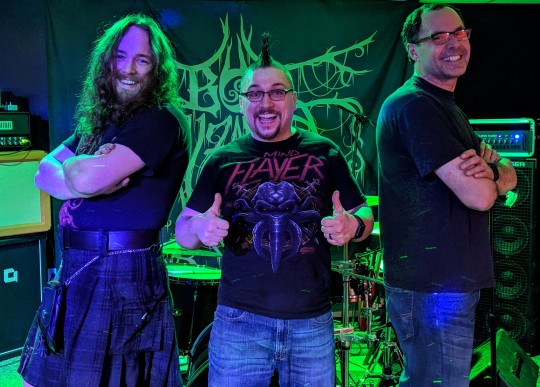
We worked with Max Schoenlein of MAS Audio (who also does shows with us, doing lighting usually) who ran the board. We worked with him on our original EP as a two-piece a few years ago. Our bassist Colby used to own a recording studio, and I've had experience mixing music, as I've dabbled a bunch in the past on various projects and mixed/ mastered our EP, so collectively we had all the pieces to self produce this full length album.
We recorded the whole thing over the course of 4 weekends in January 2020, and Colby and I passed a few early mixes of one song back and forth for awhile before settling in on a rough template to apply to the rest of the album, doing a massive amount of iterating and adjusting over the next few months, finishing the process of mixing and mastering in May. It was a pretty great learning experience, and I think the end result turned out great for what was a pretty thrown together studio. We're very proud of it.
Our bassist joined in November of 2018, and we've been working on writing this album since then, in addition to learning some covers and doing live shows locally. Ben and I tend to split the writing between the two of us, with one of us coming up with a few cool riffs and concepts, and jamming on it to figure out where it takes us. We tend to improv jam a lot of our new ideas and record everything we do, going back and listening to what we did and picking out the good parts to apply to a more structured song that we refine over time.
Thematically, we have a focus on fantasy/Dungeons & Dragons, as well as spoofing off of the '80s Satanic Panic era, but role playing games have a pretty big influence on how we go about writing our lyrics as well. I'm credited in the liner notes as "DM" or Dungeon Master, which in D&D context is the person who runs the game and story that plays out, with the players interacting with it. And while I do usually handle running our games outside of the music, we also apply this dynamic to our lyrical writing process.
Often I'll lay out a rough idea or story we want to make our song about, and Ben and I will talk through where it heads, with me leading the narrative and Ben refining it, and eventually writing the lyrics to fit the idea. While not all of our songs are handled this way, the ones that are end up as very linear story based songs.

One example, the song "City in the Mountain" tells a tale of a visitor experiencing the wonder of a sprawling underground city, with the lyrics seeming to be from almost a tour guide describing the city to them as they enter. The song has this looming theme of misearned wealth and power accumulated in the city, culminating in the reveal of an ancient magical creature contained under it that is driving it's growth, and the sacrifice of the listener being the final step of their trip deeper into the city, to placate the creature.
Or "Submission in Defiance," which the first act of the song is about an adventurer setting out to confront a highly intelligent mind-controlling enemy, and their realization that the only way to get close is to allow this creature to take control of them, and the existential struggle that a decision like that requires. However, the second half of the song describes their new mental state after this happens, which is complete submission to the enemy, doing the entities rage-filled bidding as almost part of a hive mind, with an implied complete failure of their original intended goal.
Overall, our From the Mire takes heavy fantasy influence, a few songs being straight up retellings of D&D games we have played together in the past ("Shapeshifter" being the most notable example of that, which is actually a game that had a character my daughter ended up getting named after), but we do sprinkle in our fair share of social commentary and deeper thoughts about the world applied to the setting.
From the Mire by Bog Wizard
The Bog Wizard himself is a recurring character in the album, a crotchety old bastard of wizard, living in isolation in his swamp, who doesn't take kindly to trespassers. Our single "Swamp Golem" is a song about the conjuring of a massive hulking creature created from swamp muck (featured on the cover of the album and CD itself, drawn by Al Seamer) to enact revenge on a nearby village for that very sin. He's a very "get off my lawn" type, taken to the extreme.
Follow The Band
Get Their Music
#D&S Debuts#Bog Wizard#Michigan#Doom#Metal#Fantasy#Doom Metal#Sludge#Dungeons and Dragons#D&D#D&S Reviews#Doomed & Stoned
5 notes
·
View notes
Note
Where do you think Norman's arc will go from now (that he's met Emma and Ray)? Also, how do you think the story will end?
So, the two most important facts about Norman’s arc is that one, he’s the character of the trio between Ray and Emma with the least flaws, and two the majority of his arc has taken place offscreen. This is not a criticism, this is pointing out where the subversion with his character is going to come from.
So when analyzing Norman you have to take into account that both Ray, and Emma sort of believe Norman to have been the best of the group. Even if Emma is the moral fiber, it was Norman who did the vast majority of the planning for the escape. That was why Norman was taken away from them in the first place, for story purposes it was to show that it was in fact not all Norman which led to their success and both Ray and Emma are strong and capable in their own right. In the end all three of them are equals with equal capabilities.
However, the fact that Norman was taken from them and that he also chose to sacrifice himself resulted in both Ray and Emma sort of putting Norman on a pedestal. Especially when it came into terms with their perception of him and their assessment of themselves. While it makes sense for them to remember him in an idealized light when he sacrificed himself, now that it turns out he’s actually lived Norman the real person is going to compete with the image of Norman both of them have been carrying around this entire time in order to motivate their actions.
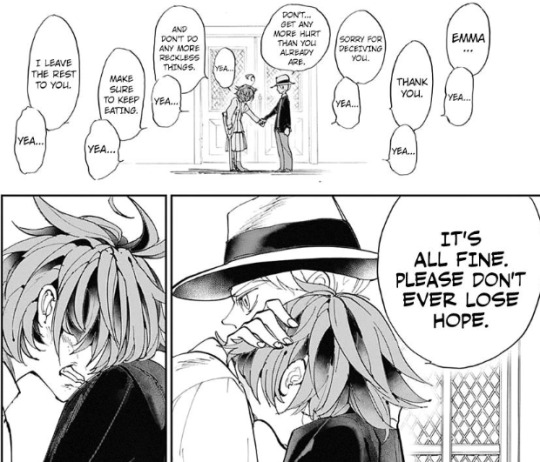
Norman not only put the finishing touches on him and Emma’s plan while knowing that he would die soon, but he also correctly predicted Ray’s actions and told Emma how to save him.
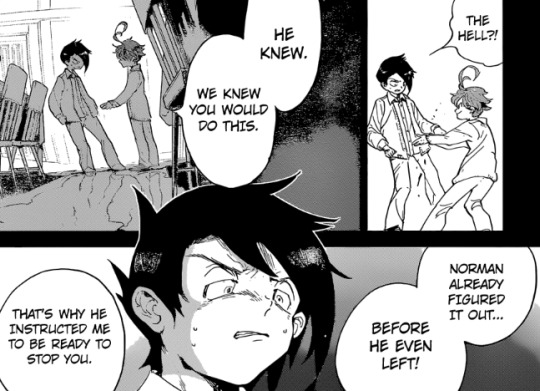

When they’re escaping, as he watches the scene in front of him Ray hallucinates Norman for a moment to come to terms with the reality of the situation. Norman also speaks what are probably just Ray’s own feelings on Emma that he himself can’t admit and can only see coming out of Norman’s mouth.


In the second arc when Emma has a near death experience after being shot, it’s Norman that she imagines as the one who stops her from falling and also swims up with her back to the surface. It’s his image that literally guides her back to life. Except, we know Norman is not a ghost that can magically appear to either of the two at the time because he’s still alive in both cases.

The trio is an extremely tight knit family, and they all believe in each other’s strengths of course, but of the trio we’re shown the least of Norman’s flaws, and that makes sense as both Ray and Emma admire him so much and this story is mainly told from the perspective of the children. Norman sort of becomes the symbol of their survival and escape, even though technically it’s never been Norman from the start, it was always Emma’s ideals of saving everyone, of escaping with their whole family that guided them and Norman was the one most driven to make those ideals a reality out of his love for Emma.
Not only do the characters in the story treat Norman as a symbol though, now Norman himself has taken on the role of a symbol leaving his original name aside and calling himself William Minerva instead. Someone who was a literal symbol, because he was a made up person that James Ratri created to inspire children to escape from the plantation system.
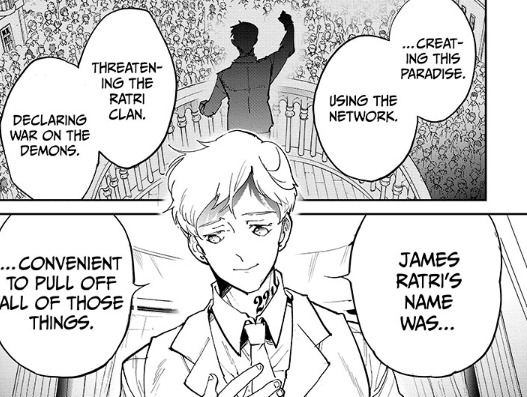
In the first chapter we’re reintroduced to Norman and his situation as posing as Minerva the entire chapter he’s drawn without a face while all of his followers for the most part are detailed. This is more than just to preserve the twist that Norman has taken to posing as William Minerva. It’s also symbolic of what Norman is doing, he’s casting his own identity aside and forcing himself to play a role which he thinks will be of greater benefit to everybody else in the long run.
He’s playing the role of an idealized hero, a children’s fairy tale hero when he still is just a child himself.
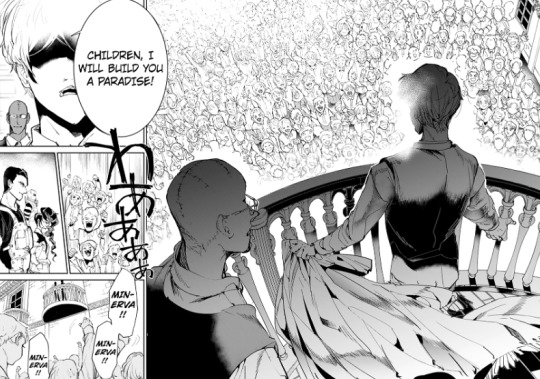
So, a lot of Norman’s role in the story is concealed but there’s some very important hints to take from the introduction of his character. While Emma is the ain character, remember it was originally Norman who was introduced as the supporting male lead, the one who found out about Connie at the same time, the one who promised to escape with Emma at the same time. It was originally Norman who made the promise to escape together with Emma.

And eventually instead it became Ray who escaped with Emma, while Norman sacrificed himself intending to die and be eaten there. What happened instead was a reversal of their situations. Ray had Emma, and the rest of his family as support while enduring the hardships of the next year, whereas Norman endured it all alone.
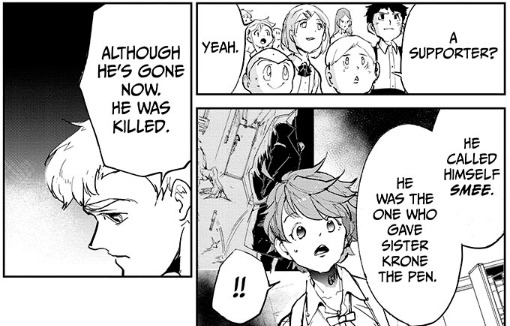
Norman had only one accomplice and even that person he failed to protect them during his escape, which he had to figure out how to escape from an entirely second plantation all on his own.
What I’m pointing at here is Norman is originally set up as the supporting character to Emma and the main one at her side, but he gets separated from her for the vast majority of the time after the first arc, and not only that but afterwards Norman had to endure a bunch of trauma all alone. His response to that however, has been to ascend to a position of power instead and make himself out to be the savior of the neverland, rather than showing any signs of being a traumatized kid who has been separated from his two closest friends and the rest of his family for a year and a half and forced through terrible human experimentation alone.
Now finally, returning again to the opening chapters, what exactly is Norman’s main flaw? Ray’s is his tendency to always rely on sacrifices, both himself and others and his willingness to dirty his hands, which combines with a low self image he has viewing himself as worth less than his two friends because of what he was willing to do and the guilt he had already carried. Emma’s flaw and strength are one in the same, her naivete and willingness to believe in others puts her in reckless danger but it also allows her to take paths that nobody else would try to take to save everyone, and also to not give up in circumstances where most others would give up. Emma is vulnerable and she constantly exposes herself to danger and that’s not something that can be brushed off easily in a world that’s constantly trying to kill them, but also it means that he wearing her vulnerability on her sleeve makes her the most emotionally developed and the empathic of the other two boys and because of that she’s able to easily imagine the situations of others and constantly tries to offer them to join her side. It’s Emma’s unrealistic dreams that drive the three to try to make the world into a better place.
Then, where are Norman’s flaws in that? In a way Norman seems to strike a perfect balance between the two. He’s calculating and cunning like Ray, and yet at the same time he also is somebody who wants to hold up Emma’s ideals. Even in the first chapter, Ray demonstrates that Norman has a critical thing when it comes to thinking that Emma is lacking.
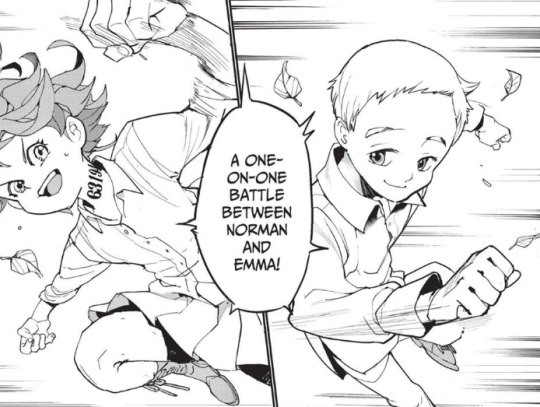


Norman’s the smartest of the three, Ray can compete with Norman in terms of brains but he’s the most well studied. Ray even says so later that it’s not like he has raw genius he just studied his hardest even though he hated studying because he wanted to be a tasty meal that he could deny the demons. and Emma of the three is the most flexible because she’s constantly changing her ideals.
Also, not only that but the first tag match in the first chapter ends with a one on one battle between Norman and Emma. Which is clear foreshadowing that while Norman and Emma start out as each other’s closest ally, and Norman as Emma’s supporting male lead that eventually the two are going to disagree with each other and probably have to compete with each other which is why Norman was separated from the plot for so long and so much of him still remains a mystery.
In the 4th chapter, Norman gets some more foreshadowing to establish his flaws. The first thing is Norman mentions over and over again his main motiation is Emma, who Norman sees as a better person than him. (This is a theme with the trio gosh guys stop comparing yourselves to each other). Norman feels guilty for being scared only of his own life when Emma was crying not for herself but for the sake of her family. From that moment forward he swore to be the one to bring Emma’s ideals into reality no matter how far fetched they are.
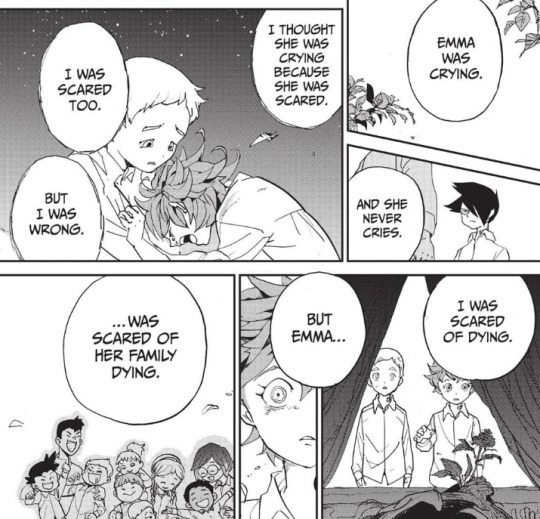


Norman’s actually more logical and more driven by cold blooded reason than Ray, however Norman doesn’t wish to be like that so he makes most of his actions for Emma’s sake rather than following his own ideals. Norman’s statements in chapter four are rife with foreshadowing.

“I’ll use myself to accomplish it.” “I’ve always managed to accomplish what I set out to do.” “So, what are you going to do? Emma and I are insane. We’ve completely lost it.”
All of these statements which seem perfectly innocent at the time because they’re a part of Norman’s speech to motivate Ray, and his declaration of Love for Emma, but they’re also words in a different context that could take a much darker turn. The Promised Neverland tends to play the long game when it came to foreshadowing, reveals about the demons taking on the characteristics of what they eat that became relevant this arc were foreshadowed as early as the Goldy Pond arc where one demon ate the brains of another and then started to hear two voices in its head instead of just its own.
“I’ll do anything…” is a recurring theme for Norman.

At which point I must mention, the difference between Norman and Ray’s flaws. Ray is a pragmatist, he believes sacrifices are necessary and is willing to dirty his own hands to make those sacrifices. The difference in the flaw then lies in the ideals. Ray is a pragmatist, whereas Norman is still an idealist because he believes in Emma’s ideals to this day. Whereas Ray makes sacrifices for the sake of survival and accomplishing realistic goals, Norman’s flaw is that he’ll sacrifice to bring Emma’s lofty ideals into reality. He’ll do it for the sake of ideals.
And as early as the first arc, Norman is referred to as willing to do “Anything”. However, that was when Norman was surrounded by his family and in a much mentally healthier situation, so his definition of “Anything” has probably changed between then and now.
See Norman’s flaw is that his ideals aren’t his own, they’re Emma’s. Not only that, Norman is constantly criticizing himself for not being as selfless as Emma is in his eyes. Which is not really fair criticism that Norman is levying on himself, for example he gets upset when he a child gets afraid of dying.
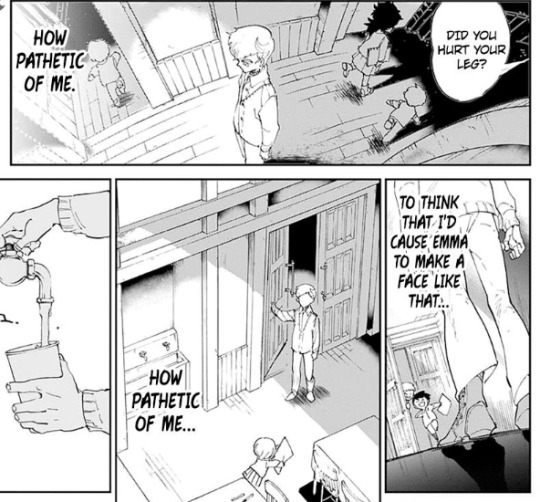

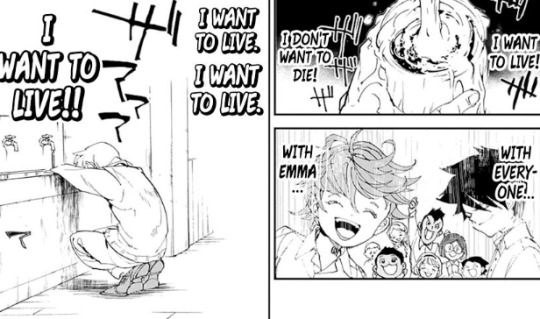
He has trouble seeing with himself individually as a person, and dealing with his own weakness. Especially when he’s usually relied upon to be the level headed one of the three, the best of the three, the leader of the three, etc. etc. And his way of coping with his feelings of powerlessness in those situations is to go back to tactics.

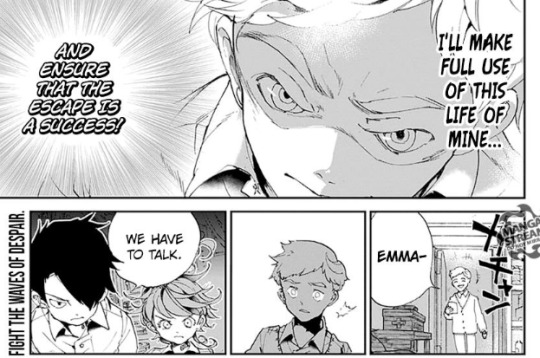
So, when Norman gets more and more upset he tends to instead of working through those feelings buckle down and see everything as pieces on the board. He believes absolutely in every situation he can overcome with tactics and making use of everything around him. Not only that his appointed task is not even for himself and his own ideas but rather to make Emma’s dreams a reality because Norman doesn’t see himself as good of a person as he sees Emma as.
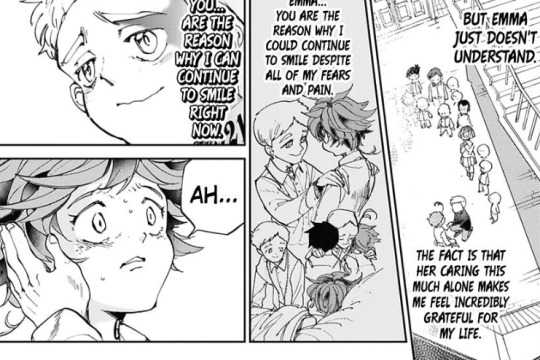
So, right away that’s a combination of 1) Norman having a natural tendency to go to extremes especially when it comes to using people, situations, and everything present to get what he wants out of a situation. and 2) somebody who adheres himself to ideals and is intensely dedicated to bringing those ideals into reality even if those ideals are not his own.
So, it’s easy to see why after being isolated from his two moral compasses and then traumatized in a child experimentation lab, that Norman’s way of dealing with this trauma and turning it into something productive another piece on the board has been to completely shed away his own identity as pose as someone else (Norman doesn’t really believe he’s a good person like Emma is), that person being the lofty ideal of William Minerva rather than an actual person, and two once again saying that he’s doing all of this to bring Emma’s ideals into reality.
Neither of these things are necessarily harmful on their own. WHen they’re together Norman and Emma make a good team, Emma being the one who makes the ideals and Norman the one who wants to use strategy and tactics to bring them to life. However, Norman has been separted from Emma for a long time and making these decisions all on his own, and there’s been a clear case in escalation in the stakes Norman is dealing with.
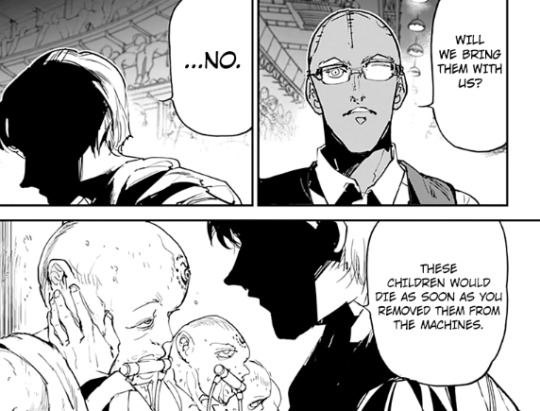

The first thing he does in the chapter he’s reintroduced in is burn a platnation to the ground with the comatose mass production children still inside. I’m not going to discuss the ethics of this, but Norman himself feels guilty for not being able to save those children which shows the weight he’s currently taking on his shoulders and the decisions he’s making.


So Norman in the year he’s been apart from his family has gone from, “I want all my family members to escape alive” to “Burn everything down to the ground and rebuild a paradise from the lost ashes”. I’m not making a moral judgement on Norman’s philosophy, especially since he’s rebelling against a fundamentally corrupt system based on child murder and human farming, however, his views are extreme and they’ve only become more extreme the more pressure he’s put on himself to carry out those ideals for every child he takes in.
So then you have the breakdown of the trio again. Emma, the reckless idealist, Ray the pragmatist, and Norman the extremist. Norman is now the most in the know, and the one of the group with the most resources but that doesn’t mean Emma and Ray are going to go along with him and follow out his plan.
Otherwise, the story would have been split up on focusing between Norman and Ray + Emma on their journey to reunite with one another. However, there’s one important thing to notice about this latest chapter.
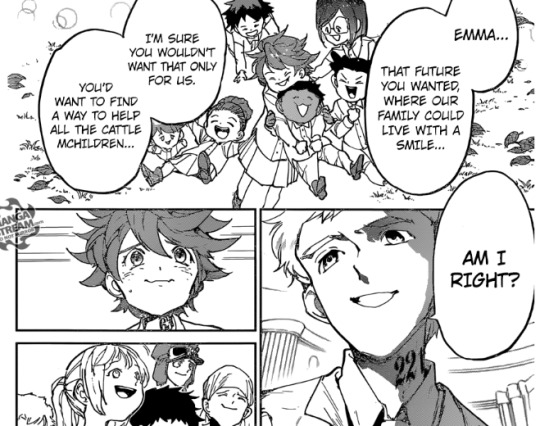
Norman talks about again in front of Emma that all he wants is to make her dream come true, living with her family and being able to care for them in a world that’s not actively trying to kill them. This brings a smile to Emma’s face.
Then Norman says that he’s been preparing all this time to make Emma’s dream a reality, and not only after losing their base does he have a plant to do it, but he also has resources, contacts, and measures in place to carry it out. It sounds too good to be true, after losing their hideout and Yugo and Lucas, they find Norman again and the same old Norman who seems to have everything figured out and only wants the best or his family.

Yet, this is what Norman suggests.

Genocide, to simply wipe out all the demons and make this second world a paradise for humans, because if all the demons were gone there would be no reason to feed on humans anymore. And the author even takes the time to panel out Emma’s changing reaction, from a smile, to a hesitant face, to a slow look of horror.

This isn’t what Emma wants to do. Norman’s strayed far from Emma’s ideals in his methodology. Emma is going to reject his answer, because Genocide of an intelligent species is a net wrong no matter what ends you’re trying to accomplish with those means.
The kids have been killing demons all along, but can they really kill every single demon in order to build a world better for them? When things such as child demons and demons families exist? That’s what is weighing on Emma’s face. Her ideals are clashing finally with Norman’s need to go to extremes to bring those ideals into a reality and it’s going to cause a conflict between the two of them. That’s what’s registering on her face right now as Norman says with complete confidence all they need to do is wipe out every last demon to get the happy ending they want.
That’s the direction I think Norman’s arc will go from now on! Thank you for sending the ask, anon.
1K notes
·
View notes
Text
03/13/2020 DAB Transcript
Numbers 19:1-20:29, Luke 1:1-25, Psalms 56:1-13, Proverbs 11:8
Today is the 13th day of March, welcome to the Daily Audio Bible I’m Brian it’s great to be here. It's great to be here with you today as we prepare to reach the conclusion of another one of our weeks together and draw our workweek to a close. And even as we do that, we’re going to be entering a new book today, the gospel of Luke when we get to the New Testament and we’ll talk about that when we get there, but first let's continue our journey through the book of Numbers. We’re reading from the Contemporary English Version this week. And today, Numbers 19 and 20.
Introduction to the book of Luke:
Okay. So, this brings us to the gospel of Luke. And Luke is a little bit more of an intriguing gospel. It's the third of the synoptic Gospels. And as we talked about as we encountered the other two Gospels, the synoptic Gospels are called that because they're very similar in the way they’re composed and they definitely share some of the same stories, even some of the same phrases, very similar in the way that their laid out, so similar that it…it's widely believed by scholars that one couldn't exist without the other. And even though they were written at different times and by two different people, they were…well…especially Mark was used as source material for the others. And we’ll enjoy the gospel of Luke tremendously because it’s the tightest, most concise of the Gospels. It's written well. It flows well and it’s a narrative style. Abd we’ll get used to this flow because we’ll see it again because Luke didn't only write the gospel of Luke, he also wrote the book of Acts that we’ll come to after we finish the Gospels. Now, we’ve read Matthew and Mark. We’re now gonna read Luke and we’ll encounter some of the same stories from a bit of a different perspective because the Gospels have a different perspective and a purpose. So, for example, when we read the Gospel of Matthew when we started our year together, and in Matthew we noticed Jesus was fulfilling prophecies. Like that was the point. This was done because it fulfilled this prophecy. And, so, Jesus is fulfilling all these prophecies letting us know that this is a narrative established to speak to Hebrew people. Luke will take us through these stories again that we’re familiar…that we’re familiar with, but Luke is written to a Gentile audience. And, so, it's revealing that the gospel is inclusive, is not a Hebrew only religion. It includes the whole world and welcomes all who believe into the family. And, so, with that in mind we begin the third gospel. Luke chapter 1 verses 1 to 25.
Commentary:
Okay, so it may not have seemed like it as we were reading through our…our reading from Numbers today but some pretty monumental shifts happened today in the Old Testament. So, let’s just look at those so…so we have context for where were going. The children of Israel have moved out. They've been disqualified from moving into the Promise Land. They’ve been turned back into the desert to wander until the whole first generation, the people who came out of Egypt dies leaving basically the conquest of the Promise Land to the second-generation, to the children who were supposed to grow up free in the land of promise. They’re gonna have to do what their parents didn't. And that's a pretty big deal. That's why there's a lot of this review going on about the laws. And one thing that we should gather is that God is expecting precision. He is expecting ultimate obedience here. They are in the wilderness where utter dependence upon God is being made more and more apparent to them and their complaining about it every time their faith gets stretched. And that sounds so familiar. Nevertheless, there out in the wilderness, and they need to get somewhere. And to get somewhere the best way that they can go that they're being led is through the land of Edom, but the Edomites are like, “absolutely not.” And we could…we could understand why they would have concerns. “Like a million people are going to come on this main road and walk through and they're gonna pay for their water and can do anything. Like that just doesn't quite add up. So, you can understand why they would have some pushback but the important piece about this is what Moses said, “we are family.” And that is true. The Hebrew people were the descendants of Jacob, the Edomites were the descendants of Esau - Jacob and Esau. And if we’ll remember the misdirection and trickery of Jacob that was visited on Esau., well we can sort of see that the family rift is centuries old and the Edomites won't let them pass. That's a mistake on the part of the Edomites and there are other things along the way that they do, and an entire book of minor prophecy will be devoted to the Edomites once we get near the end of our year together. But this is important. They turned to their family to get where they needed to go, and they were rejected. And, so, there's no water. The people are grumbling and complaining to Moses again, “we would've been better off if he died before the tent of meeting than to die of thirst out here in the desert. We would've been better off in Egypt.” And this becoming a recurring theme. “We’re in the wilderness going toward the Promise Land, but slavery was better. Let's go back to slavery again.” Sounds so familiar because we walk in these footsteps so often. God tells Moses to go out to a rock and command it to give water. He gathers the people together and gets his walking stick as God had told him to do and then he basically yells at the people, “you rebels. You, rebellious people.” Right? “You stiff necked people. Do we have to bring water out of this rock?” And then Moses hits the rock twice and water comes out, but that's not what God told Moses to do. He told Moses to go speak to the rock. He didn't tell him to yell at the people and ask them if he had to bring water out of the rock for them, and what a nuisance and all this, and show anger and strike the rock. So, God gave them the water that they needed to survive. Unfortunately, the anger and rebelliousness in Moses heart disqualified him from leading the people into the Promise Land. That will also be left for the next generation. And after that Moses and Aaron and his son Eliezer climbed Mount Hor. Eliezer was installed as the high priest and Aaron passed from the story. One interesting thing, one thing that was pointed out to me when I was much, much younger, that I’ve always held onto because the exclusion of Moses from leading the people into the Promise Land seems pretty…pretty harsh. Like he didn't get to go. Like he got to lead them, but he didn't get to go. But we do find Moses in the Promise Land. We find him along with Jesus at His transfiguration speaking to Jesus in the Promise Land.
And speaking of Jesus, we’re just…just getting going in the gospel of Luke. And, so, what’s being set up here is the story of Zechariah and his wife Elizabeth who were very old but were foretold that they would be having a child in their old age. And, of course, there’s some clear parallels here with Abraham and Sarah. And Zechariah was told as a priest of God in the temple offering incense before the Lord, he was told by an angelic visitation that he would have a son, that his son would be named John, that he would be a prophetic voice that would prepare the way of the Lord. And this prophetic voice would be really the first prophet in 400 years, the time that passes between the Old and New Testaments. So, we can often think that John shows up out of the wilderness wearing camel's hair and eating grasshoppers, and that's true, that's what the Bible says but he got there somehow. He's the son of a priest, a vision and angelic vision happened in the temple. And when John emerged from the temple. He couldn't speak. This wouldn’t go unnoticed until somebody just shows up out of the wilderness with a message of repentance. There would've been a lot of wondering about who this child might be, and we’ll pick up with that story tomorrow.
Prayer:
Father, we thank You for Your word. We thank You for its beauty in the way that it can touch so many parts of our lives, that it can touch us on so many levels and cause us to ponder and contemplate our own lives and our own path. And, so, we are so grateful for this and we are so grateful for one another. We are so grateful that we can do this together in community. So, come Holy Spirit and plant the words from the Scriptures into the soil of our lives today. And may they grow and yield fruit for Your kingdom. We ask this in the name of Jesus. Amen.
Announcements:
dailyaudiobible.com is home base, it’s the website, it’s where you find out what’s going on around here. So, stay connected.
You find all the different links to stay connected in the Community section. That’s where the Prayer Wall is. That's in the Community section as well.
The Daily Audio Bible Shop is there, resources are there. I guess one thing I haven’t talked about in a long time is coffee. Coffee…coffee and tea are part of my daily life and have been for I guess as long as I've been an adult. So, a long time. And we've been involved in coffee and tea for well over a decade. We have our own brand, roast our own coffee in Colorado, source our own tea. And you can have it delivered to you each month or you can just choose what you like, and have it sent to you. That all is in an effort to…well…to offer resources that we’re kinda gonna consume anyway. Usually like we’re gonna have a cup of coffee of some sort…maybe we’re gonna pay a premium for it. And we just started thinking, “you know, we’re lovers of these things, we consume these things. What if…what if we could create a superior product, fresher product, get it to people fresher and kinda like use the old monastic way of making things to support the monastery. You know, like maybe we could have a few of these things that were just gonna help out a little bit.” And, so, that’s kinda we’re coffee came from and it’s become a part of the fabric of the Global Campfire. Coffee and the Bible pair well together. So, just I mean, it's a relaxing kind of ritual to enjoy waking up, waking up spiritually, waking up physically, or winding down for that matter. So, those resources are available in the Daily Audio Bible Shop. Just look for coffee and tea. And you can have it sent each month. Oh…and we also have…we went in search of this…it was for a long time coming too. “What…what kind of a more instant…instantly available coffee could we provide?” Like we were kind of like, “could you do the K-Cup thing?” And we looked at that and we looked at how old that coffee is and how long and it's got a sit and how much of it you gotta make so that there’s no way it's gonna be fresh. But we did find a way of steeping coffee. It's like basically a coffee filter that you would pour your coffee through like in your coffee drip maker wrapped around coffee. You just steep it like tea. And, so, that its nitro sealed to push oxygen out, so it doesn't oxidize or doesn't break down and deteriorate and keeps…keeps well. And, so, those are great. Keep those with me wherever I go because a lot of times…a lot of times I find myself staying in hotels and that's not the greatest option for coffee. So, these are available just to kind of have at the office and such. And you'll find those in the Shop as well in the coffee and tea section. So, check those things out.
If you want to partner with the Daily Audio Bible, you can do that at dailyaudiobible.com. There's a link that lives on the homepage and I thank you for your partnership. If what we’re doing around this Global Campfire brings warmth and light into your life, then throw a log on from time to time. Thank you for your partnership. If you’re using the Daily Audio Bible app, you can press the Give button in the upper right-hand corner or, if you prefer, the mailing address is PO Box 1996 Spring Hill Tennessee 37174.
And, as always, if you have a prayer request or encouragement, you can hit the Hotline button, the little red button in the app or you can dial 877-942-4253.
And that is it for today. I’m Brian I love you and I'll be waiting for you here tomorrow.
1 note
·
View note
Text
Endgame
By basically any metric, Endgame was strictly inferior to Infinity War. It was a solid conclusion to he MCU, they wrapped things up nicely. But they really didn't meet the bar they set in the last movie. Visually, sound design, effects, all the technical aspects they nailed. As always. But the *story*? The plot, the meat and bones of it? Abysmal.
I don’t remember *exactly* how I felt leaving Infinity War. I know I did not like it as much as most, I felt they rushed too much into the one story, and they would have been better off with a trilogy [Guardians of the Galaxy 3 followed by Infinity War and Endgame]. I disliked Thor’s sequence in the film in particular, and thought the Snap was poorly handled because it was obviously going to be undone in the next movie so there was no emotional punch [although Peter Parker sure tried, even knowing he’s not really dead that scene stings]. Despite the flaws, though, I felt the movie was largely solid. The writers crammed too much into one film, but most narrative threads were fully realized and the ones that weren’t have a whole nother movie to wrap up. Upon a couple rewatches, my opinion has grown. The tightness of it all is much more apparent, and Thor’s sequence is now my favorite in the movie, despite basically being a retread of his arc in Ragnarok.
So maybe once I will reevaluate this once its on DVD. But I suspect my opinion isn’t going to change. The issues are more fundamental, and there’s no sequel planned to fix the problems. Honestly, I wonder how much of the writing team carried over, because this movie doesn’t feel like it was the planned sequel to Infinity War.
Also, it seems clear that there was some executive meddling in places that would suggest the problems of Ms Marvel are going to carry forward.
I don’t want to say its a bad movie. Ms Marvel was a bad movie. Iron Man 2 was a bad movie. For the first two thirds of the movie, it had its issues but nothing irredeemable. And the stuff it did right it did really really right. The last act, though, really dragged the whole thing down.
Spoilers abound after the break.
First of all, I never watched so much as a trailer for this movie. I wanted to go in completely free from assumptions. I'm glad I did, but I don't know what other people took from different scenes with that additional context.
Movie opens with Hawkeye's family getting dusted. I hate Hawkeye so that was immensely satisfying.
Next scene less so. Why did Tony and Nebula get on the damaged ship? What was their end game (no pun intended)? Not a huge deal but right off the bat I'm questioning character motives. Not a good sign.
Oh, it's because if they're on a ship it's easier for Ms Marvel to save the day. How did she find them? Was she specifically looking for Stark? Why? Nobody on Earth knew what happened with him. Was there a distress signal? Can she sense those now? Nobody knows, and we're not going to find out. The only thing we learn about Ms Marvel is that she didn't help out during the previous movies because she was busy on other planets. I mean, come on.
The sequence between Stark and Rogers back on Earth was spot on and I loved it. This will be a recurring theme, specific scenes being perfect with the surrounding material being crud.
They then kill Thanos and we time skip five years. That was actually pretty cool, and an unexpected turn of events. Take notes, Rian Johnson. My expectations were subverted but it didn't make me want to murder the Russo's. It does sort of abandon the child Gamora scenes from Infinity War. Everybody thought that was supposed to be her actual soul in the soul stone, but the Soul Stone is now destroyed so maybe it was just Thanos being crazy? Maybe it’ll come up later in the movie [Ron Howard: It won’t.]
Commence exposition. Couple thoughts. One, I hated Bruce Banner. The Hulk was a separate, unique personality. Banner killed him, and took over his body. We can debate the morality of it, but I just found it unsatisfying. It all happened off camera, and they never really explain why The Hulk refused to fight in Infinity War. I assumed it was because he was afraid, the Russo's claim it was because he was tired of being Banner's lap dog. Either way, that character was killed unceremoniously during a time skip and never mentioned again.
Two, Banner’s pretty confident in how Time Travel is going to work. Time Travel has never been a thing except with Dr Strange, and the two never sat down to discuss the subject before the later was turned to dust. So where is his confidence coming from? Their entire plan hinges on him being correct. What really bugs me about this is that, with about thirty seconds of actual discussion [rather than the comic relief listing time travel movies and Banner shutting them down], they could have reached the same conclusion. “Why don’t we prevent the snap from happening in the first place?” “Because that would be a paradox, and we don’t know how time responds to paradoxes. Maybe we all live happily ever after, maybe time itself implodes. But if we undo the snap in the present, we know exactly what will happen.” But instead he just knows. And, oh, also he’s wrong. We figure that out later in the movie, but never really address it.
Tony with his daughter was perfect and I loved it. It was a little unsatisfying that he just sort of tinkered with time travel for an afternoon and figured everything out, but that’s sort of his thing so it works.
Thor... less perfect. Look, this is the third movie in a row now that is about Thor losing everything then regaining his power. They did it in Ragnarok. They did it better in Infinity War. Do they really need to do it again in End Game? In fact, it occurs to me just now as I’m writing this that was the plot to the first Thor as well. So this is four times now that we’ve been in this exact situation. I’m just done with it, you know? The scenes were funny enough, and I certainly understand *why* the character is in that place, emotionally, but being understandable is no excuse for retreading old ground.
So now we’re time traveling. This was like 90% great, but the 10% really drags the whole thing down.
We’ll start with the Power Stone. Having Nebula reconnect to the interstellar wifi was inspired. Obviously they need Thanos to figure out the plan and move to stop it, otherwise there’s no climax. Obviously there’s no present day Thanos to do that, so it has to be past Thanos. This also wraps up one of the nagging threads from the first movie. Thanos has been hunting for these things for years, then just stumbles upon all of them in a couple months? It seemed a little convenient, but now they’ve shown that he had inspiration from the future telling him exactly where he could find them all. Just wow. Then having past Nebula take present Nebula’s place? I loved it.
Next, time stone. Remember my annoyance with Banner’s overconfidence earlier? Here Banner being told he’s full of shit, but they just sort of ignore it. Its not that you can’t change the past, its that when you change the past you create an alternate reality, and that alternate reality might be super shitty so you shouldn’t do it. But they hand wave it away with a promise to return the stones back to where they belong on the timeline, so that the timeline doesn’t “branch” and Banner ends up technically correct. So it works, I’ll put this in the 90% great category.
But here’s the 10% shit: how did The Sorcerous Supreme know how great Dr. Strange was going to be? She can’t see past her own death, but she knows how powerful Strange becomes after she dies? But she doesn’t know about the Snap, so they’re definitely sticking to the original rules, this isn’t a retcon. But Strange is dead, so how does he know everything works out? In fact, not only is Strange dead, the time stone is dead too. He used the time stone to go further into the future than the time stone itself exists. This would have been a perfect opportunity to close some loose threads, but they missed them.
Also the scene after they arrive in New York where Banner half heartedly destroys some stuff was pretty cringe. I think they were playing it as a joke, and people in the audience definitely laughed, but it really drove home the earlier point about how they killed off The Hulk and replaced him with a Green Bruce Banner.
Next up: Space and Mind Stones. Talk about important McGuffins. Studying the Tesseract lead to the creation of SHIELD and Hydra and Captain America and eventually Ms Marvel. Studying Captain America lead to the creation of The Hulk. The Mind Stone created Vision, Quicksilver, and the Scarlett Witch. Important stuff here.
But anyhow, 90% good. Everything was great right up until the end. The plan, the banter, everything worked for me. I even loved the bit about “America’s Ass.” I do wonder if that wasn’t a response to criticisms of Brie Larson’s ass in Ms Marvel? Or just commentary on comics drawing attention to asses in general? I’m not sure but I liked it.
10% shit: the plan goes sideways at the last minute, and Loki escapes with the Tesseract. Ok, now, its been a while since I watched the first Avengers movie, but I don’t remember Loki escaping with the Tesseract? Isn’t that exactly what Banner said can’t happen, and the Sorcerous Supreme made Banner promise he wouldn’t let happen? A branch in he timeline? That’s a pretty goddamn significant change in history. But whatever, we’re never going to comment on it. A rogue infinity stone, in the hands of a crazy person, NBD.
So Stark and Rogers go further into the past to steal the Tesseract from SHIELD before Loki could steal it from Rogers stealing it from Hydra stealing it from the Avengers. No complaints here, Some nice foreshadowing for Rogers, and Stark gets closure with his father. It was great.
Finally, Soul Stone. Look, I have always hated Hawkeye, since the first Thor, and love Black Widow so that’s all I have to say about that. Except that Nat doesn’t get the sort of closure Stark and Rogers do. Can’t really blame the writers on this one, they didn’t have a lot to work with, but its still disappointing. At least it wasn’t a pointless death and her and Barton got some time together.
Finally: the Ether/Reality Stone. This was just an extension of the previous “we’ve covered this already why is this here?” issue around Thor. Him getting Mjolnir was pretty tight, though, not gonna lie.
So now we’re back in the present, we have all the Stones and past Nebula has infiltrated the group. First of all: this would have been a great place for an Intermission. Like, seriously, There are literally no dangling story lines, everything’s come back together to one location, and you’ve got a couple minutes of downtime before the action starts anyhow. Just give people ten minutes to piss, please.
First of all, how did Past Nebula bring an entire fucking battle ship into the present? Like, they had just enough Pym Particles to get their team back once. Sure, they picked up some extras but she couldn’t have been expecting that, and the memories she got from Present Nebula should have made that clear. So what was her end game (no pun intended)? And if they could send a ship full of people all at once, why didn’t the Avengers do that? Take the entire team back at once, leaving themselves with eight more doses if they fail.
Moving on, the scene were they use the stone worked for me, given what they’ve done so far. Specifically, with respect to the Hulk. But bear with me here: what if they hadn’t fucked up the Hulk? Imagine a movie where Banner doesn’t kill a character off camera. He’s just a regular guy the entire movie. Maybe they ask him if he still has issues with Hulking out and he says “no, I guess he got tired of cleaning up my messes so now he refuses to come out even when I need him to.” Then, as Thor is about to don the glove, Banner transforms and everybody is certain he’s about to ruin everything when he puts the glove on himself and snaps his fingers. After, his body is still green but its Bruce talking. He doesn’t sense the Hulk inside him anymore. He sacrificed himself because he knew he could do it and Thor couldn’t.
Just a thought. As I said, the scene works as it is.
We establish the plan works, then suddenly THANOS. Opportunity #2 for an intermission. They launch the barrage of missiles, then fade to black, see you in ten minutes. Would have been epic.
So we get a nice, super satisfying scene with the three original Avengers fighting Thanos. Thor is fucking dual wielding, yes please. And the scene where Steve catches Mjolnir? I was literally hard. But Thanos is even more powerful than he was in Infinity War. Remember Infinity War, that movie a YEAR OLD written and directed by THE SAME PEOPLE? In that one, Stark went toe to toe with Thanos in control of the Infinity Stones and held his own. In this one, Thanos has no problem taking down a dual wielding Thor, and literally destroys Cap’s Shield without even the use of the Power Stone. Its just... blah.
Now, when things are at their worse: MAGIC. Literally, Dr Strange uses magic to save the day. Its not a complaint, its just what happens. Again, SUPER satisfying. But lots of things stick out. One, half the Wakandan army just woke up from being dusted. As far as they’re concerned its been like half an hour since Infinity War, but they’re all in pretty good shape. Even if you assume the Wakandan army was made up of survivors, they sure mobilized quickly. That’s impressive. Two, where did Valkyrie get a fucking Pegasus? They’re all dead, remember? Hela killed them thousands of years ago, it was kind of a big deal. Yeah, neat scene, loved seeing it, but it doesn't belong. Third, Pepper Potts shows up. She abandoned her five year old child to fight alongside Tony. I get there’s an end of the world argument to be made, but it still doesn’t seem in character. Both for her to do it, and for Tony to not call her out for it.
Still, nice satisfying fight scene. Things still kind of go south, though, they just can’t seem to beat Thanos’s army. Wouldn’t it be convenient if a flying god were to show up for no reason and destroy the battleship causing all the trouble? That would be convenient, but they’re better writers than that. [Ron Howard: they were not]
To add insult to injury, they literally divide the heroes by sex and have a scene where all the women are together launching an attack. It wasn’t even like a natural progression of the battle, where the women are thrown together. Just the one shot of all them showing up for no reason.
There was no corresponding scene with the male heroes.
But I’m sure that’s just a coincidence and they weren’t pandering for woke points.
At one point Thanos grabs the Power Stone with his bare hands and uses it to blast somebody [I think Ms Marvel but I don’t remember]. He doesn’t appear to suffer any ill affects,
Finally, Tony Stark’s big moment. People were literally weeping in the theater. I loved it so much. It was honestly perfect. Killing everybody wasn’t what I expected, I thought they’d be sent back to the past to preserve the timeline or whatever, but this way it mirrored the end of Infinity War so thematically this works better.
Everything after that was basically shit.
First of all, this movie suffers from a serious case of Return of the King Syndrome. There was like half an hour of movie left after Thanos died the second time. Christ.
Past Gamora might or might not still be alive in the present? She kicks Star Lord in the nuts then kind of vanishes. There’s no reason to assume Tony’s snap wouldn’t have killed her along with the rest of the past army, but they also didn’t resurrect Present Gamora so she probably survived for Guardians 3. Starlord is using the computer to search for her at the end, but Thor keeps trying to stop him because I guess he’s a prick now?
Also Thor retires. Just quits. Names Valkyrie Queen of the Asgardians. That’s the conclusion of his story. He just goes off to find himself, gonna spend some time with the Guardians of the Galaxy see where life takes him. Because that’s satisfying.
They still have to return the infinity stones, along with Mjolnir. Rogers gets to do the honors, and he makes it pretty clear to everybody that he’s saying his goodbyes. Somehow, nobody notices, and everybody’s super surprised when he doesn’t come back after. Apparently, he choses to return to the 40s and live out his life with Peggy. I liked this, it was a satisfying conclusion to his story. He found a way back to the love of his life. Nice.
Here’s what’s not nice. Bucky and Falcon see old Steve sitting near by. Bucky, Steve’s childhood friend who owes his life to the fact Steve never stopped believing in him, sends Falcon over to talk to him. Because...I don’t fucking know. Why didn’t they both just go talk to him? Why didn’t they call over Bruce, who was standing right there trying to figure out what went wrong? No, its Falcon’s time.
But more importantly: HOW IS STEVE THERE? You can’t change the past. Bruce tells us that. The Sorcerous Supreme shows us that changes in the past create alternate timelines leaving the original in tact. They pulled Thanos into the present and killed him before he could collect the Infinity Stones, but the snap still happened. Present Nebula shot Past Nebula in the heart but didn’t wink out of existence.
But somehow, when Steve goes into the past, he doesn’t create an alternate timeline where Captain America survives the war. He just inserted himself into the prime timeline, and waited until he had a chance to say hi to his old friend Falcon.
Oh, also he had a second Shield made at some point?
Look, I liked Steve’s story. I liked that they passed on the title to Falcon, a nice nod to the source material. I’m thrilled that Peggy got the dance he promised her all those years ago. But that scene ruined the core premise behind the entire movie. Time Travel stories are hard, but if you agree on how they work and stick to those rules its fine. This movie did neither.
Also: how did Steve return the Soul Stone? How shocked was he to discover the stone was guarded by Red Skull? Did he just drop it off the cliff and hope the ancient magic would handle the rest? Will Thanos still have to sacrifice Gamora or does Nat’s sacrifice still count?
There’s other issues. Ms Marvel and Wanda both just sort of vanish. Wanda especially should have gotten more story, but they just gave her one angry woman scene then she was forgotten about. They sort of gloss over the massive issues they’d have faced with half the population dead. They show one overgrown neighborhood, but by and large everything seems to be exactly the same as it was pre-snap. Just with everybody sadder. We never see Rocket meet a racoon. Hawkeye was in the movie. Nothing really huge.
So that’s all I have to say about that. Thank you for coming to my TED talk.
1 note
·
View note
Text
Visions of Hell...
This second part to my Visions of Paradise Essay was unfortunately a LONG time coming. I hope it will not disappoint.
HELL IS A PLACE ON EARTH... sorry, on a galaxy far far away
So let’s go to Hell in Star Wars and see where it takes us. You can, at first, think of the obvious depictions of Hell, and, oftentimes, Star Wars plays by the rules by delivering your graphic vision of Hell: ie, in the collective mind, and as represented for centuries, as a place, filled with fire, brimstone, lava, suffering, dismembering, torture, with an emphasis on black and red colors. In paintings, this is how it translates:
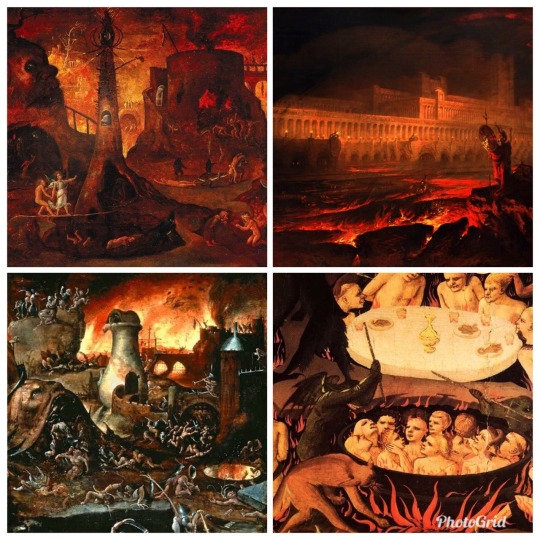
So, with this visual in mind, this is what you immediately relate to Hell, as a space, in Star Wars:
In the PT, Geonosis (ep 2) and Mustafar (ep 3). You have the fire, the dismemberment (assembly line, C3P0; Anakin loses an arm; Anakin loses both arms and legs and gets burned to a crisp), the psychological and physical suffering, the heavy coded color palette... Visually, Mustafar has been conspicuously designed to look like an archetypal Inferno. It is, after all, supposed to be the lowest point of the saga, the Fall, echoing Dante’s first part of his journey.

In the OT, with Bespin (ep 5) and Jabba’s Palace (ep 6), the visual imagery is more subtle, with some surprising twists and subversions.

Bespin is very interesting because it starts visually as a celestial place, normally coded as Heaven. But this is the place of treachery, and entrapment, which is already suggested by the color coding of the place as the MF lands on Cloud City:
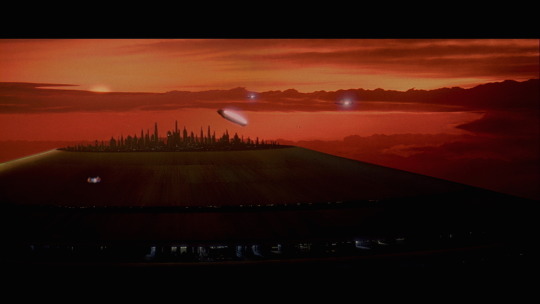
It is a place of betrayal for Han and Leia, sold by Lando to the Empire; where C3P0 is, once again, in the same installment as Trilogy 1, dismembered; where Han is tortured and frozen in carbonite; where Luke is cornered by Vader, loses a hand, and gets the big reveal; a place of psychological and physical pain. Note that there are very few table/dinner scenes in the saga, so this one becomes the Star Wars equivalent of the Last Supper with Lando as Judas, and Han turning into a sacrificial victim.

Jabba’s Palace, is, in my mind, the most interesting Hellish place of the saga. Visually, it does not look like the glorious operatic Hellfest of Mustafar, but it is actually a quite exhaustive take on sin and Hell as depicted by Dante. First, you have, quite as in the poem, two characters (C3PO and R2D2/ Dante and Virgil) entering a dark place to journey into the world of sins and punishment, and who are reminded, at the beginning to “abandon all hope”. This is C3P0 realizing that their master has “offered” them to Jabba as a gift. And what a wonderful and brilliant embodiment of the 7 deadly sins Jabba is!
Sloth and Gluttony

Pride
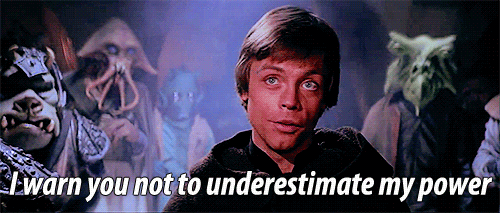
Greed
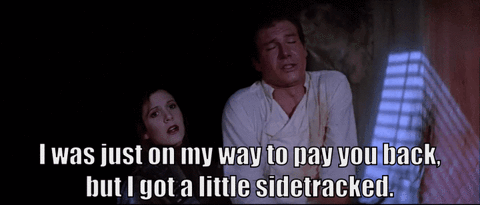
Lust
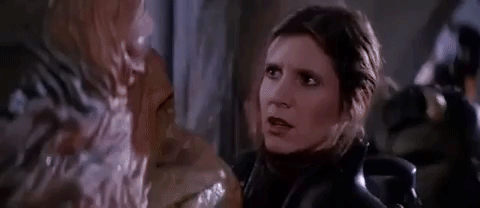
Anger
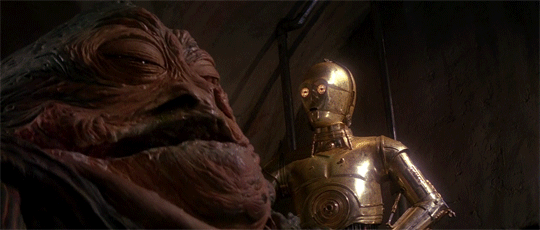
And envy, since when he sees Leia with Han he “covets” her.

Jabba’s Palace is quite the Pleasure Palace of all sins, between the boozing, singing, dancing, lusting, and killing people for entertainment. You can add to that the torture that he inflicts to the droids (again, dismemberment), the Rancor that is the equivalent of Cerberus as a Dog from Hell (his tamer’s reaction to its death is like that to the loss of a beloved pet), and the pit of the Sarlacc, which promises “ a new definition of pain and suffering as you are slowly digested over a thousand years”, so exactly like the promise of Hell to the sinners who are tortured forever... Jabba, and his palatial Hell, are very interesting because, for once, they are unrelated to the Empire and the schemes of the Emperor. This reminds us as the audience that Evil can take many forms and can often be found quite close to home, which sounds even truer in Luke’s case since Jabba’s Palace is on Tatooine, his home planet, and incidentally, that of Anakin/Vader’s as well. Jabba’s Palace was a bold interpretation of Hell. It is also very telling that all the characters (including Lando, in a rehabilitative process) are living the experience of Hell in Jabba’s Palace collectively, all facing the trials and overcoming them together. So it was not a one on one archetypal duel, the hero facing the villain.
In the ST, there is still of course ep 9 to reckon with, but in the meantime, we get mostly the Jakku opening scene, Starkiller base (ep 7) and the Supremacy and Crait (ep.8)...

We seem, at first glance, to return to a more litteral interpretation of Hell, more in the line of the PT than the OT, with flames, fire, smoke, the red and black color palette. But Hell, here, takes a "carry-on” form. It is less associated with a place than with a moment. Moments of Hell are created on different places, and are usually associated with the presence of Kylo. Hell is a place created by the characters. Like a bat out of Hell (his very distinctively shaped shuttle), Kylo brings Hell along with him, meaning that we have moved from a scenery, a background, to a more psychological interpretation of Hell. The inner turmoil that is tearing Kylo’s apart, his own inner Inferno, is released out on different places: the Jedi Temple, Jakku, Takodana, Starkiller, Crait...

The only place that exists as Hell in itself is possibly the throne Room on the Supremacy, and again, as mentioned before, this is movable Hell, since it is built on a ship...

Another character who seems closely associated with Hell and its representations is Finn, which puts him again in close relationship with Kylo (check the links between the two characters here). The experience of Hell on Jakku in the opening scene is lived through the eyes of Finn. On the Supremacy, in parallel with Kylo and Rey’s hellish experience in the throne room, Finn is here again also facing the Inferno, which takes a very litteral form as Phasma is sent to a fiery chasm (and “hopefully” this time around her death).

There is thus an interesting progression in the saga. From Hell as something very operatic that reflects the characters’ inner turmoils in the PT, but also exists visually on its own ; Hell as a place of trial for the characters, sort of to test their mettle in the OT; Hell as a place that comes from deep inside the characters’ pain and conflict in the ST and can appear at virtually any place.
There is also a recurring theme about Hell and what it brings to the characters in terms of love and romance in specifically each 2nd installment of the trilogies. In every trilogy, the characters find love or admit love at the gates of Hell: Anakin and Padmé on Geonosis as they are about to be sentenced to death; Han and Leia on Bespin before Han is frozen in carbonite; in the throne room scene through the duel and Kylo’s botched proposal, and on Crait when Rose admits her love to Finn. Love at the gates of Hell has quite an Orphean, poetic quality, admittedly... Twice, as for Orpheus, it is about love found and lost: for Han and Leia, and for Kylo and Rey... It can also echo the idea that, as Dante put it, “the path to Paradise begins in Hell”. Love has to be found in Hell of all places in order to lead the way to Paradise.

Not always in obvious places... “Hoth” as Hell
Hoth is a peculiar case. I do believe that it can qualify as a possible Hellish place... for one particular reason... In Dante’s Inferno, the very bottom of Hell, the place where Satan resides, is not a fiery pit, but rather a lake of Ice.

The first depictions of the Devil were not that of a red demon, but rather a blue angel, which for some time associated the devil with cold and ice, as depicted in this 6th century mosaic from a basilica in Ravenna (Italy):

So, taking a page from the history of the devil, ESB starts on a planet that is barely a haven (pun intended) for the Rebels. The middle chapter of the OT is really the “Hellish” chapter, from the opening on Hoth all the way to the Bespin finale. And I particularly appreciate the way they designed places that are supposed to symbolize Dante’s Inferno without once playing on the usual clichés: the “Hoth” (the word always struck me as odd) planet of Ice, and the celestial Bespin. Like Satan is trapped in ice in Dante’s poem, the Rebels are effectively trapped, paralyzed on their icy planet (and I am not hinting that the Rebels are evil, but rather that they fnd themselves caught up in a form of Hell). And they also end in a trap on Bespin, with Han this time literally frozen. Vader, the representation of evil here, is thus not sending Han (and possibly Luke) to a fiery pit of lava, but to a place that freezes them. Back on Hoth, this is a place where the rebels are hardly sheltered and live under constant threats of death due to the terrible climatic conditions or hostile hungry creatures. Note that when Han goes to get Luke, this is what he says:
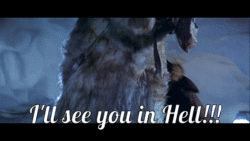
This is rare enough as an occurence to be highlighted. To my knowledge (feel free to pitch in), there are only two other instances where Hell is mentioned in the saga: by Uncle Owen in ep 3 ( “Well, if he doesn't have those condensers on the south ridge fixed by midday, there'll be hell to pay” ), and in episode 7, when Finn utters the infamous:
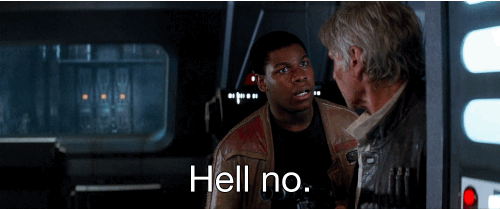
Finally Hoth can work as Hell notably because of the wampa figure, which rightly features among the potential satanic or hellish creatures in the very long list of bizarre Star Wars creatures.
Minions of the Devil, Evil Eye, and Satanic Creatures
Just like Hell as a space, some creatures are right in your face Satanic, or meant to embody evil. In the OT, ep 1, this is Darth Maul’s sole raison d’être.
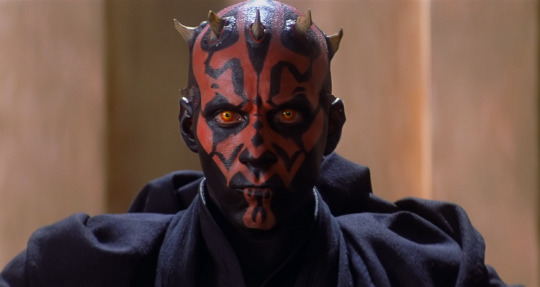
In this interview with Bill Moyers, this is what Lucas has to say about him:
BILL MOYERS: When I saw him, I thought of Satan and Lucifer in “Paradise Lost.” I thought of the devil in “Dante’s Inferno.” I mean, you’ve really — have brought from — it seems to me — from way down in our unconsciousness this image of — of — of evil, of the other.
GEORGE LUCAS: Well, yeah. We were trying to find somebody who could compete with Darth Vader, who’s one of the most, you know, famous evil characters now. And so we went back into representations of evil. Not only, the Christian, but also Hindu and Greek mythology and other religious icons and, obviously, then designed our own — our own character out of that. (...) A lot of — a lot of evil characters have horns. It’s very interesting. I mean, you’re trying to build a icon of evil, and you sort of wonder why the same images evoke the same emotions.
Ok, so basically, as avowed here, they just wanted a very visual embodiment of evil, something that could rival Vader in ep 4. Except that, as iconic and mesmerizing his look was, he didn’t say much, didn’t do much except jump about (indeed beautifully), and we know nothing about him, his motives, his purpose. Looking evil does not make for a great villain. And we knew this was not the big bad guy, just a henchman...So, not Satan, but a minion of the devil. And there are plenty of other aliens that dress the part just as well. Take for instance that cute as Hell guy from episode 4, found in Mos Eisley cantina:

He sure looks the part, complete with horns. He is just a cameo, though, to add to the list of nightmarish creatures from the cantina. To Luke and to the audence they were meant to be scary, shady, and strange. Were they truly evil? Obi-Wan had warned Luke: “You will never find a more wretched hive of scum and villainy”. So, I guess, yes? But this is also where they found Han and Chewbacca, and despite shooting Greedo first, Han turned out to be “nice men”. So maybe Satan horny guy would have been chummy on second thought?
Another interesting creature with horns is that one:
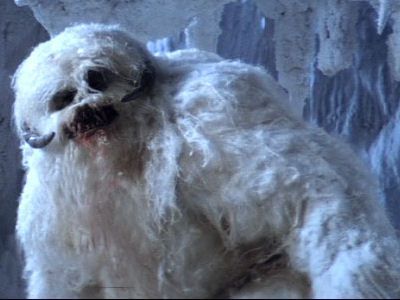
This is not a minion of the Devil, he could almost past as a furry fuzzy yeti. But the wampa, from planet Hoth can work as a hellish creature. It’s got the horns, it captures Luke, and threatens to eat him. Interestingly each first installment of the saga presents a scene where the heroes have to face creatures that seem to come straight from Hell and threaten to devour/eat the heroes: the aquatic monsters from the core of Naboo (note that Anakin IS NOT there), the creature from the trash compactor that attacks Luke, and the Rathtars that run loose on Han’s vessel and almost get to Finn... A reminder that Hell can take many different forms. And, if you think about classical representations of Hell, the Devil is often seen as devouring his victims:

Of course, you can also interpret these creatures, devouring exclusively men, as a representation of the threatening female mother/genitalia (vagina dentata) or you can think about the belly of the whale in Jonah’s story and take it as a rebirth... Talk about rebirth to Bobba Fett or those Kanjiklub dudes...
Other specimens that threaten to devour the heroes, and could be viewed as possible Hellish creatures:
The nexu and the acklay in AOTC

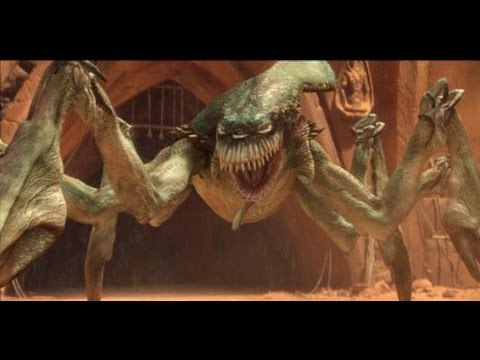
The space slug in ESB

The Rancor and Sarlaac in ROTJ


Not to mention the most dangerous of them all:

Yup, without the help of powerful magic (or snacks), this carnivorous savage furball will hunt you down and feast on your flesh!!! Need any proof besides Han tied up to get BBQed? They even did a Forces of Destiny episode where Leia was saving the lives of innocent stormtroopers about to become dinner:

Joke aside (for you Ewok lovers), meeting wild animals (possibly in a forest, I see you, damned Ewoks!) is also part of Dante’s journey to Hell. At the very beginning of the poem, before starting his descent, Dante is attacked by three wild animals: a leopard, a she-wolf, and a lion. With just a bit of a stretch, you can find this idea in the arena of Geonosis with the three alien beasts set upon Padmé, Obi-Wan, and Anakin.

The first two trilogies seem to play with the devouring beast trick more consistently than the ST which just offered the rathtar. Devouring beasts were conspicuously absent from TLJ. Even though there was the shadow of a threat through the gigantic sea creature that roamed the seas around Ahch-To, the animal remained distant. On the contrary, animals were feasted upon: the porg, the fish, the milk from the Thala siren, which was a strong departure from the usual trope. It will be interesting to see what episode IX offers in that scope, but if the devouring beast remains absent, I think it will go along the line that I already suggested about Hell. The devouring creature is no longer an OUTSIDE/OUTER threat to the heroes. Rather, the devouring creature, the one that can consume you inside and out, is WITHIN yourself, in your heart and soul. Moreover, the devouring beast in TLJ was also the role taken by Snoke on a symbolic level, as an echo to Palpatine who preys and feeds on people’s suffering and weaknesses.
I would like to come back to the Dianoga from episode 4 though, because, on the screen, it does not appear as a toothy fearsome creature, but as an eye. The concept of the “evil eye”, that is to say the idea that a mere glance could curse you and bring you harm, can be found in many cultures throughout the world. It is probably a corollary of the idea of the omnipotent everseeing eye of God. The evil eye is not necessarily associated with the Devil himself, it usually comes from a person who is envious. Nevertheless, in The Lord of the Rings, Sauron, who is Evil incarnate, is materialized as an Eye, red, fiery, reptilian shaped. Equivalent “evil eyes” can be found in Star Wars. It can take the form of just one eye, as with the Dianoga, the gatekeeper’s device in Jabba’s Palace, and more interestingly, Starkiller base, which, with its cannon, looks, especially on the posters, like a one-eyed monster and brings new massive meaning to the notion of “if looks could kill”...But it can also be materialized in the evil Sith eyes of Maul, Anakin, or Palpatine. But note that Anakin’s evil eyes come and go, and that not all the villainous characters get the evil eye treatment: it never shows up in Count Dooku, Snoke doesn’t have them, and Kylo never has them either...
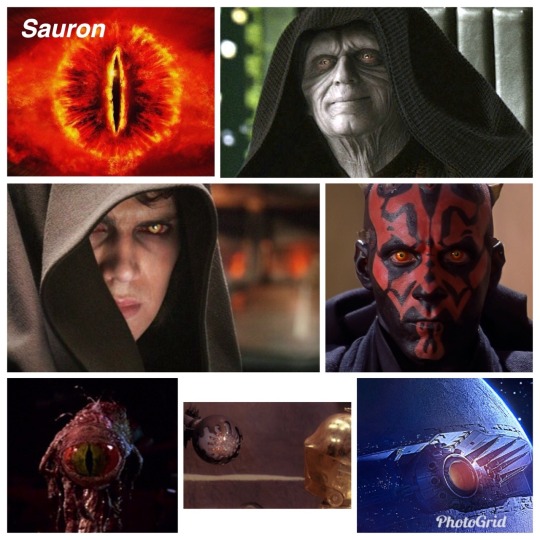
Who’s boss? Satan, Lucifer, and their Legions
As we have seen, there are many possible Hellish creatures in Star Wars, but, like Sauron’s ring, is there one to rule and bind them all? There is an important divide to mark here, a dual personality in Evil, that echoes the very way the figures of Lucifer or Satan have been evolving and developed. Most people now tend to fuse the two, but they can be viewed as two rather different entities. As this article sums up:
1.Lucifer is the highly favored angel created by God whereas Satan is his name when he was thrown away from heaven.
2.Lucifer is an angel of God whereas Satan is the name of the devil.
3.Lucifer is not the exact opposite of God whereas Satan is a name that pertains more to opposition.
4.Lucifer has a physical form whereas Satan does not have any.
Lucifer’s name comes from “the carrier of light”, an essential idea in the scope of Star Wars, and in this respect, Lucifer’s embodiments can be found in Anakin and Kylo. Anakin, like Lucifer, is a creature that comes straight from the highest power (God/the Force), and is the chosen one, the favorite, the most beautiful of all the angels. In his casting of actors for young Anakin, George Lucas picked a blond blue-eyed boy with cherubic potential (who incidentally is the only one of the saga talking about angels), and a hot up-and-coming young actor. Anakin is designed to be attractive. Like Lucifer, his tragic flaw is also his pride and hubris, and his desire to play God, which shows right at the beginning when he boasts himself of being the best pilot (he has never won or been in a podrace before) and the fact that he has designed, on his own, a sentient character (C3P0). Anakin rebels to the Jedi Council the same way Lucifer rebels to God: like angels he can’t marry or father children, he is not allowed the rank of master and must keep on bowing down to others while being better than them (Lucifer and the mortals). Anakin is clearly portrayed as a fallen angel, who, like Lucifer is punished and sent to the visual fiery Hell of Mustafar, and encased forever in his own personal Hell, the loss of the woman he loved, and probably endless physical suffering in the persona and armor of Darth Vader. But does Lucifer become Satan? Even though Vader was a striking embodiment of evil and a mesmerizing villain, he was immediately presented in ANH as a henchman and not the main boss. Even Leia was not afraid to tell it as it was:

And he appeared very subservient in front of the Emperor, which disqualifies him, in my view, as Evil incarnate. Vader is NOT the boss. This is the greatest irony about Vader: as a little boy, enslaved, he dreamed of living a free life, and he ended up bound up forever to his master, as well as to the apparatus that maintains him alive. You can call that survival, but this is truly a pathetic life. Though Milton chose the name Satan for his poem, his character is actually closer to Lucifer, the Fallen Angel, a tragic figure with undeniable seductive appeal through his intelligence, his infectious and passionate speeches, his sadness and torment, which make him, arguably, the perfect “anti-hero”,a romantic figure. Milton’s Satan claimed that it was “better to reign in Hell than serve in Heaven”. Maybe that was Anakin’s idea, but he never got to reign, even though the thought apparently stuck with him all these years, from his initial offer to Padmé to his offer to Luke to “rule the galaxy” together.
Enters Kylo, who presents striking similarities with Grandpa Vader. Like him, as a child he gets to struggle with a tremendous burden: Anakin is set out as the “chosen one”, Kylo as “the legacy child”, both with “raw, untamed power” that is unknown to any other Force sensitive, which makes them the beloved of the Force. Like Anakin, Kylo’s character is designed to be seductive, wavy hair and shirtless scene included. Like Anakin, he is a fallen angel, and his patricide aligns him with Lucifer’s attempt at defeating God (aka the Father). Kylo is not immune to pride or hubris either, but just like Anakin, he also finds himself ironically in a subservient position. Seductive in their youth, they both don the costume of evil and its outer signs (black, fiery red saber, satanic crossguard for Kylo, dehumanized mask), but the main difference is that evil has consumed physically Anakin. Vader is the ONLY persona he has left to survive, whereas Kylo merely plays the part. He is still very much human, and very much Ben Solo, as Snoke keeps reminding him.
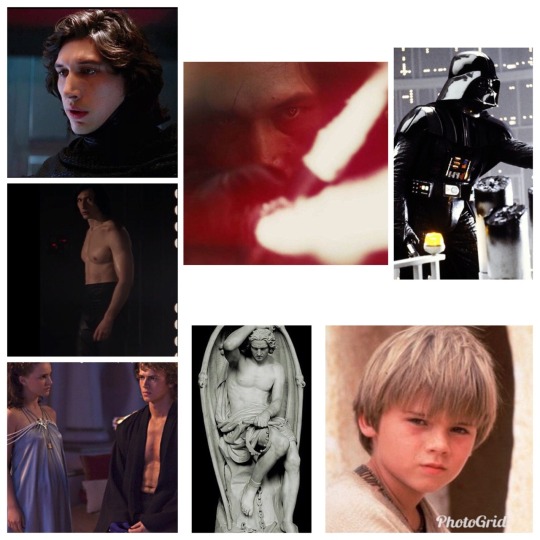
Both men have been manipulated since childhood by an older man/humanoid who has twisted their minds and hearts and finally gets them to contract a Faustian pact that -as all pacts with the Devil- never delivers. In both cases they do not become more powerful than they were before, and the price must be paid with the blood of their families/loved ones.
If we look at the distinction between Lucifer and Satan, Vader and Kylo can appear as the physical manifestation of Evil, ie Lucifer, the fallen angel, whereas Palpatine and Snoke, who incidentally most of the time appear under a holo form, are more like Satan, the ghost of Evil who needs to borrow/possess other physical forms to engineer his evil deeds. As French poet Charles Baudelaire penned in the 19th century (and quoted from in Th Usual Suspects): “ the loveliest trick of the Devil is to persuade you that he does not exist”. So both Snoke and Palpatine rely on holo forms, traveling, remaining away, hiding in the shadows or under a cloak. Even though the audience (who is familiar with the OT) know from PM that Palpatine is the elusive Darth Sidious, the Jedi Council is unable to identify him through 3 full length movies (!!!!). Like the Devil, he is the one whose very existence is constantly doubted, hiding behind different forms such as the Federation ViceRoys, Darth Maul, Count Dooku, General Grievous, finally Anakin/Vader, a form of demonic possession if ou will. Even Padmé and JarJar become hosts to Palpatine’s infectious powers, as they innocently do his bidding and become his puppets in the Senate. In the OT, the Emperor was conspicuously absent in ANH, and appears for the first time solely as a hologram in ESB. Disincarnated, the Emperor is the best embodiment of the spirit of Evil, nowhere to be found, and thus potentially everywhere, in his henchmen, but above all in the very satanic notion of his “legions”, aka the stormtroopers. Indeed, in Mark 5:1-20, Jesus exorcizes a man possessed by a demon and when asking the demon his name gets this all-too famous answer: “My name is Legion,” he replied, “for we are many”. Whereas the Emperor and Snoke in TFA remain hidden, the galaxy -and the screen- is filled with their legions, droid army, army of clones, stormtroopers, disposable, replacable...

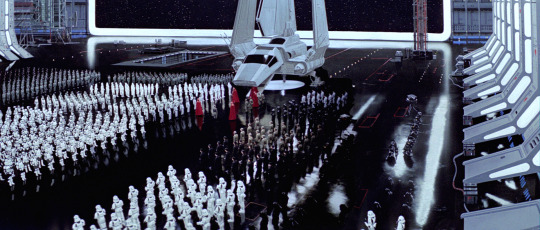
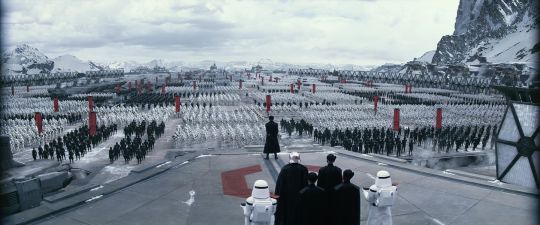
And indeed, when the Empire collapses, the First Order rises right away, evil ready to take another form, moving effortlessly from Palpatine to Snoke... When the figures of Palpatine and Snoke are revaled though, it is with all the usual Satanic codes and paraphernalia. In the PT, Palpatine gets the creepy treatment, with the maniacal laughter, the hooded robes, the evil eyes, the blue devil with horns at his side, the red room, AND the very not subtle art flair in the background that looks like a depiction of Hell:

In the OT, he gets the red guards by his side, and the spider web motif of the Death Star in the background.
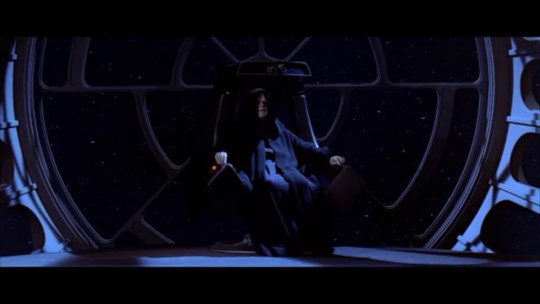
As for Snoke, he gets Satanic garrishness through red and gold, in the throne room scene.
Yet, both these satanic figures get defeated eventually, and, according to some critiques, rather quite easily. So what’s the point? Well, the point is how and by whom they get defeated in the first place! Every time it is by the Lucifer figure, ie Anakin and Kylo, the ones that were seduced and corrupted, highlighting once again the dual nature of evil, and meaning that evil is not something that is supposed to be found OUTSIDE of our nature, but WITHIN. Every time, the fight with Evil is first and foremost a fight with ourselves, our very nature. So it comes down to each and everyone to defeat the source of evil, no hero can come and do it for us. It is very important and revealing that neither Rey nor Luke were the ones actively killing Snoke/the Emperor. The “villains” have to become the agents of their own redemption. Even if this redemption is made possible through the love they feel for the heroes ready to die for their rescue.
It is even better that Snoke died earlier in the story of the ST than many had expected before. Because it forces us to question the nature of evil. It is easier and more comforting to lay the blame and point fingers at the very obvious figure of evil, the Satanic paraphernalia, the scarecrow, the snoke and mirrors if you will, as in The Wizard of Evil. As the obvious villains, Palpatine and Snoke serve a function: they are the gold villainous standard to which we are asked to compare our resident other villains, Vader and Kylo. And, of course, the very fact that Snoke and Palpatine are indubitably irredeemable means that, logically, the other two are indubitably redeemable.
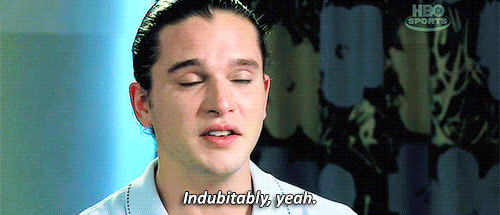
The position that Kylo finds himself in at the end of IX is a first, though. Vader did not survive his master, but again, he was too far gone for us to imagine him with a full redemption arc. He could die, but he could not be reborn. With Kylo, the potential is still very much in the open. What Kylo finds himself facing after defeating his inner demon (aka Snoke) is actually what remains after the fall of the scarecrow : the mundanity of evil (as Hanna Arendt called it). I would not necessarily call Hux mundane, but, just like the officers from the Death Star in ANH, they are not supposed to be the big “in your face” Fairy Talish villain. They are the legions, the brainwashed masses, the military honchos, the war profiteers, the obedient soldiers... Once the curtain is pulled (or burned down in the throne room scene), this is the harsh reality of evil that remains: the Huxes, the Tarkins... Yet, even there, hope remains. In introducing the character of Finn, the ST shows that, from within the very masses that represent the legions of evil, change can also come. The ST gives to the mundanity of evil a potential redemption. I was actually stunned when reading the Junior novelization of TFA by the importance given in chapter 1 to Finn as FN-2187 and his interactions with his comrades, who are given nicknames, voices, and an identity. We know that a scene was deleted in TLJ with more of these interactions. I wonder if episode IX is not going to be more straightforward about that and show how Finn was not, as Phasma called it, a mere “bug in the system”, but a foresign of deep structural changes...Fighting Hell and Evil is not just the stuff for mythical heroes facing dragons and monsters, it is, even in Star Wars, an individual quest (Anakin, Kylo), and something even a stormtrooper, or a nobody, can fight and possibly win.
If we go back to Dante’s Divine Comedy as a literary influence, we must remember that the progression is that of a descent followed by an ascension: first into the deepest pit of Hell, then up through Purgatory, to finally ascend into Heaven. Obviously, the purpose is supposed to be uplifting. It celebrates Redemption through the power of Love, and Faith in God. As much as a physical journey, it is also, of course, a spiritual journey. Something that resonates deeply in the star Wars saga. If each trilogy contains elements here and there, places of Paradise, places of Purgatory, and places of Hell, in order to make sense with the different mythical and religious themes embedded so far, the saga as a whole needs to follow the same path. So the PT is about the trip to Hell (Anakin’s fall), the OT can work as Purgatory as it is very much about expiation, cleansing, and purifying, and yes, normally, the ST is supposed to be about a spiritual ascension, and the redeeming power of love. In Dante’s final vision, women (through the Virgin Mary and Beatrice) and their compassion play an important part. It seems like women are taking a bigger part in the ST. And the last lines of Dante’s poem are really noteworthy in the scope of the saga as a whole :
But by now my desire and will were turned,
Like a balanced wheel rotated evenly,
By the Love that moves the sun and the other stars.
We could argue that the PT is very much about desire (Anakin), and the OT very much about will (Luke). And, in a way, the ST is very much about what happens when will and desire have to co-exist and balance each other out. Rey and Kylo are undeniably a mix of both. And, it is my personal belief, like so many other fellow bloggers, that the point of the saga is to be, like the final line of Dante’s poem, about balance. And I am quite partial about this idea that love will move the sun and the stars... like the Force. Moreover, when reading the quotation from The Journal of the Whills in the novelization of TFA, something really struck me: the “refined Jedi sight”. In Dante’s final vision, an emphasis is definitely put on eyesight, and the way eyes become “crystal clear”. Between Rogue One and TLJ, crystals seem to take more and more importance in the conclusion of the saga...
Remember, the path to Paradise is through Hell, and, guys, ascension is on the way . Buckle up!
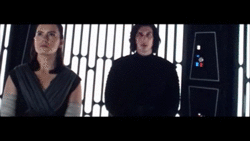
#reylo#reylo fandom#reylo fam#reylo meta#star wars meta#star wars parallels#paradise and hell in star wars#hell in star wars#satanic creatures in star wars#kylo and anakin
454 notes
·
View notes
Text
Our Favourite Albums of 2018
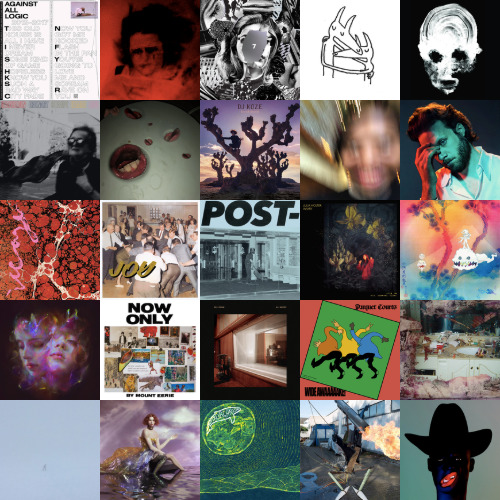
2012-2017 - Against All Logic
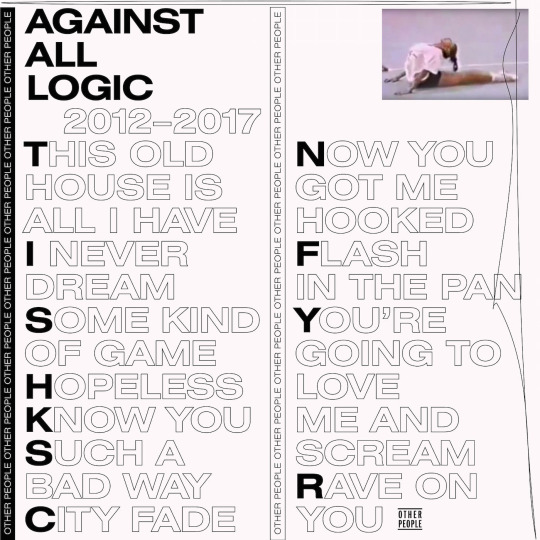
(Other People)
Whether Nicolas Jaar meant this to be an understated release or not, the deeply soulful samples, thunderous lo-fi aesthetic and immaculately timed and detailed track phasing of 2012-2017 make it one of the year’s most impressionistic and innovative electronic releases. Not pretending to be any more than a collection of house tracks, 2012-2017’s cohesion lies in its consistency of quality, as well as its lo-fi style. Jaar’s taste for extended, developmental dance songs is addictive and as fit for easy, danceable listening as it is for intense scrutiny. Every track begs repeated listens and rewards through revealing yet more hidden elements. It goes to show just how technically gifted Jaar is that an offhand collection of tracks can be so thoroughly excellent and make more of an impact than his more dedicated peers. -E
Dead Magic - Anna Von Hausswolff

(City Slang)
Dead Magic is Anna Von Hausswolff’s fourth full-length record in which she delves into the dark abyss in a purifying explosion of distressed emotion. A sinister ambience is maintained throughout, even during the more beautiful and uplifting moments – which are typically conveyed through Anna’s rich harmonies alongside powerful, yet unnerving, electronic drones. It is these moments that make Dark Magic what it is. Instead of wallowing in a pit of despair and desolation, Anna offers a way out, stressing that there is beauty even in the darkest of places. It is an exquisitely refined project which blends dark musical themes with emotive vocals to create a sonic soundscape that will leave you completely mesmerized. -M
7 - Beach House
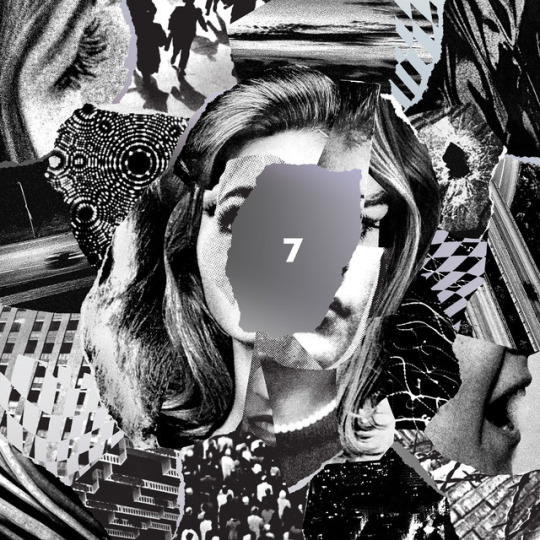
(Sub Pop)
Simplicity has always been Beach House’s charm and on 7, not only do they manage to revert back to the gorgeous, organic simplicity of Teen Dream and Bloom, but they do so while immensely expanding the breadth of their sound. 7 is only fingertips away from the untouchable timelessness of those two aforementioned records, and is one of Victoria Legrand and Alex Scally’s most ambitious artistic leaps and successful reinventions. This is an affirming record, demonstrating the duo alive-and-well, working with a still-evolving sound; and as easily as capable of producing indie-pop hits (‘Lemon Glow’, ‘Drunk in L.A.’) as they are of thoughtful, tender ballads (‘Black Car’, ‘Last Ride’). 7 has its fair share of career highs, cementing Beach House’s reputation as one of the finest indie acts of this decade. -E
Twin Fantasy - Car Seat Headrest
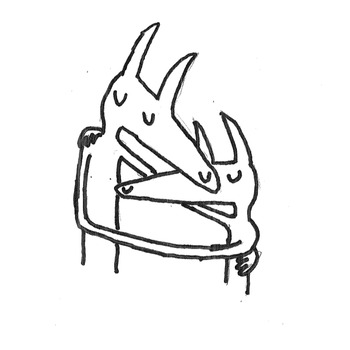
(Matador)
Will Toledo is perhaps the most inventive, boundary-pushing artist in modern indie rock; so when he turned his hand to remaking his own 2012 Bandcamp release Twin Fantasy, the result was always going be interesting. With two ten-minute-plus songs, extensive spoken-word passages, and a distinctly self-aware tone, nothing of the charm of the original was forsaken. A hi-fi recording, reportedly utilising seven musicians and a hell of a lot of retrospective adjustment to the source material, 2018’s Twin Fantasy is everything you felt the original had the potential to be, and more. Instead of a messy, chaotic cacophony, here Toledo’s project is revealed as an intensely personal, momentous opera of indie rock, with Toledo as a proclamatory main protagonist, an idol of teenage angst and confusion. Twin Fantasy is epic and indulgent, flawed and truly excellent. Indie rock hasn’t seen anything as promising as Car Seat Headrest since its heyday in the 90s, and this band are still yet to disappoint. -E
You Won’t Get What You Want - Daughters
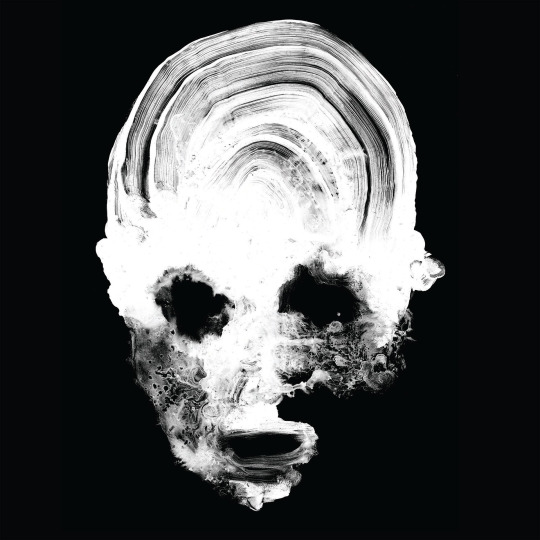
(Ipecac Recordings)
Bleak, harrowing and violent – three words that are often tossed around to describe bands loitering around the darker offshoots of noise rock; yet Daughters’ You Won’t Get What You Want accentuates those descriptors in their fullest definition. Like an atrocity one can’t seem to look away from, the Rhode Island band take the same uncompromising swathes of noise from their 2010 self-titled record but warp and extend it. Swallowing the rest is a manufactured, engrossing silence of negative space that underlies everything from the pulsating waves of distortion to Alexis S.F. Marshall’s vocals; from the clattering, dictatorial drumming to the smatterings of dramatic piano. Daughters’ thoroughly austere ethos has no release; You Won’t Get What You Want is uncompromising in its walls of thick, violent sound and thorough in its sheer immersivity. This is music unlike anything else released this year, and a revival statement for a genre that’s been largely stale for years. -E
Ordinary Corrupt Human Love - Deafheaven

(-ANTI)
With their fourth release, Deafheaven give their critics the middle finger with an uncompromising statement of intent and self-determination. 2015’s New Bermuda hinted that the band had taken the critique of 2013’s Sunbather by metal purists to heart, as they went for a darker, more aggressive sound. With Human Love, however, we see Deafheaven position themselves in-between these two contrasting sounds, as they get the best of both. The hard-hitting aggression of tracks like ‘Honeycomb’ and ‘Yellow Canary’ will satisfy the most committed metal heads, whilst the hazy shoegaze of the shorter tracks, ‘Near’ and ‘Night People’, will enchant the Sunbather converts. As always, the juxtaposition of George Clarke’s piercing screeches paired with the beautifully aggressive guitar hooks of Kerry McCoy is something to behold. With the addition, this time of a heavily post-rock influence, the progression to an explosive climax has never been so poignant on a Deafheaven project. The LA outfit have switched up their sound flawlessly, finding the perfect balance of style and aggression in a masterwork of emotion and intensity. -M
Year of the Snitch - Death Grips
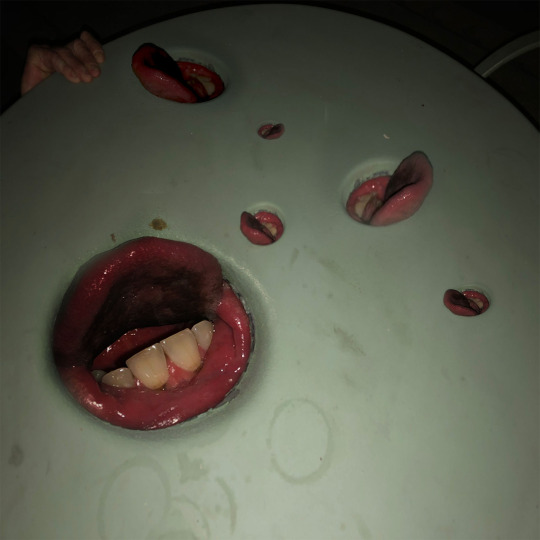
(Third Worlds)
How do they do it? This is Death Grips’ sixth studio album in as many years, and each one has been as exhilarating and unique as the next. Year of the Snitch is perhaps their most out-there project to date, and that’s saying something. This time out the trio go for a more experimental rock approach. The familiar elements of industrial hip-hop are of course still there, but they are dominated by heavy synths and guitar riffs to create a soundscape that is both unfamiliar, yet somehow typical of Death Grips. That, for me, is the beauty of Death Grips; no matter what direction they take their sound, they completely own it. Year of the Snitch is not going to dethrone Exmilitary or The Money Store, but it’s also not a runner up; it’s in a different world altogether. A typically unapologetic adventure through pop music from the Sacramento trio. -M
Knock Knock – DJ Koze

(Pampa Records)
knock knock is a house album that manages to escape the rather utilitarian nature of the genre, and is instead an artful and diverse project from the German. Koze is clearly a master of his class, as he effortlessly floats between hip-hop, soul, disco, house, and even folk, to create a project that is not merely a compilation of bangers, but a versatile playground of sounds, similar to that of [i]Wildflower[/i] by The Avalanches. The features on here are just as puzzling as the multitude of genres, with the likes of Bon Iver and Roison Murphey making appearences, but, of course, Koze manages to slot them in effortlessly. At 19 tracks, one would expect this album to feel like it had overstayed its welcome, but thanks to the wealth of ideas, it is a perfectly judged, captivating record. -M
Some Rap Songs – Earl Sweatshirt
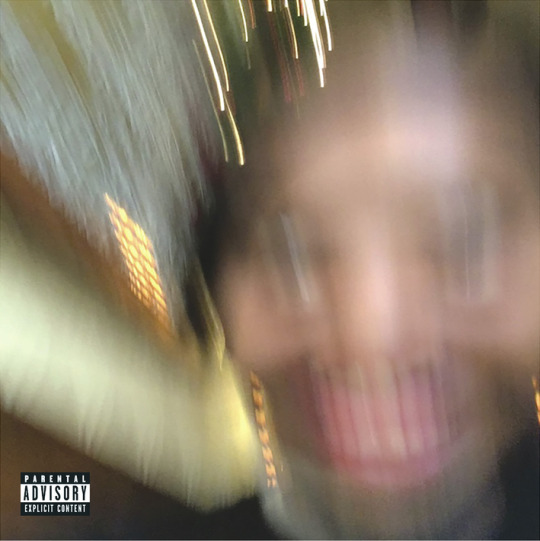
(Tan Cressida)
Earl’s transformation from the “hot and bothered astronaut” we were introduced to eight years ago, into the mature, yet despondent 24-year-old he is today has been and interesting and difficult experience to observe. His fourth full length album picks up where his latest EP, Solace, left off, as he continues to improve his craft, whilst simultaneously sees his mental health decline. Just like his earlier releases, the Madvilliany and Donuts influences are obvious, but this time take the form of production and song structure. Verses begin and end abruptly, choruses are essentially non-existant, and most of the beats consist of just a roughly looped sample. The result is that it feels as if we’re getting a peak into Earl’s musical sketchbook. Nothing feels finished or even polished, which gives the project a raw and intimate feel. Earl’s lyrics add to this feeling as he explores his state of mind by discussing his struggles with depression and the passing of his late father, displaying a maturity beyond his years. Some Rap Songs is a delicate and honest project from a talented and troubled artist, focused on the improvement of his art. -M
God’s Favorite Customer - Father John Misty

(Bella Union/Sub Pop)
Attuning his touch to more tender, less ironic pastures suits Josh Tillman to the tee. God’s Favorite Customer is a significant scaling-down from the grandeur of last year’s Pure Comedy, but the novelty of hearing Tillman’s actual emotions proves an adequate substitute. The metaphysical is, as always, a dominant, recurring theme, but the engrossing topics of failed relationships, suicidal thoughts and substance abuse combine for a stirring sort of listen that long-time listeners of his haven’t really had the opportunity to divulge in. As much as records need pacing, careers do too - whereas on I Love You, Honeybear and Pure Comedy Tillman is feeling sorry for us as a society and suffering with us along the way, God’s Favorite Customer sees him looking inward and finding a certain personal relatability. He’s a man who makes mistakes, and not so much the hip-swinging, foot-stomping unstoppable rock star he’s always seemed to be. Unmistakeably pitch-perfect vocals, supported by his usual excessively stellar songwriting and lush arrangements of horns, strings and so on, all make for yet another impeccable record from a man who can seemingly do no wrong. –E
Beyondless - Iceage
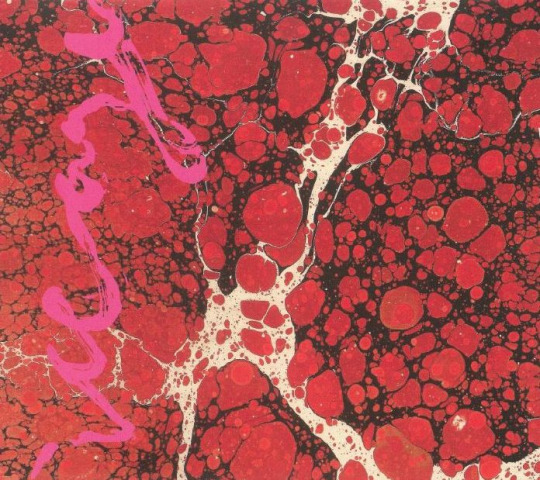
(Matador)
There’s a certain magnitude to the overall sound of Beyondless that takes your ears off; the culmination of four records of growth for Iceage from which they’ve emerged masterful, tasteful manipulators of their own terrifically refined chaos. The Danish art punk quartet edge closer to almost entirely orchestral noise rock (‘The Day the Music Dies), while also never straying too far from pop (‘Pain Killer’, ‘Catch It’). More a refinement of the style initiated on Plowing into the Fields of Love than its own bold stylistic turn, Beyondless reveals Iceage as a much-needed successor to the angrier days of the Bad Seeds. Gritty and throttling but eloquent too, their particular brand of post-punk isn’t just vastly noisy and technically excellent, but distinctive, promising and unlike anything else in the current scene. –E
Joy as an Act of Resistance - Idles

(Partisan)
Not one for the Tory snowflakes. Forty-odd minutes of Joe Talbot unrestrainedly slapping down the hypocrisy in the British right wing, taking pleasure in exposing the ridiculousness of all things bigoted, from Brexit to anti-immigrant sentiment, toxic masculinity to class hierarchy and general snobbery. It’s a piledriving critical punk commentary on Britain’s 2018, but more than just Brutalism updated for this year’s current affairs. Joy has some impressive musical developments, from more ambitious slow cuts like ‘Colossus’ to more emotional instrumentals, such as the heart-breaking ‘June’. Talbot isn’t the most subtle of political commentators but that’s precisely his point; and instrumentally Idles make sure every track is immaculately and brutishly performed, with nods to various strands of British punk dotted throughout. All the perks of Brutalism plus clear improvement, Joy is one of the finest punk records of the decade, from one of this year’s most essential bands. -E
POST- - Jeff Rosenstock
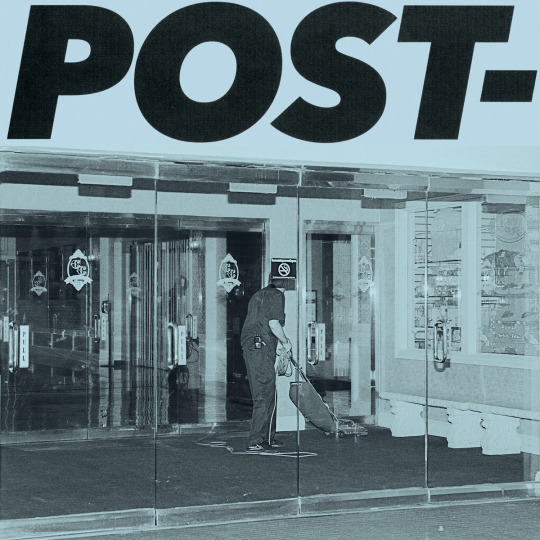
(Polyvinyl)
Jeff Rosenstock follows up his 2016 record, WORRY., with a similarly hostile and exhilarating showcase of pop-punk as it should be done. On POST-, Jeff’s dense style really shines through as the fierce melodic punk music is paired with cynical and somewhat depressing lyrics to create a perplexing, yet rousing juxtaposition. The lyrics are as catchy as they are striking, with many notable chants that will get stuck in your head for days. “ET TU USA, ET TU, ET TU USA!” It is unfortunate for Jeff that the success of WORRY. has somewhat degraded the standing of the record with most critics. POST- should not be overlooked as it is still an incredibly fun album, full of memorable chants and defiant sentiments. -M
Aviary – Julia Holter

(Domino)
With such a change of direction from her previous effort, Julia Holter’s fifth full length release, Aviary, rejects traditional pop song structures, and offers us a work of art which is as beautiful as it is mad. It is perhaps the most uncompromising album released this year, with no regard for its accessibility or its reach. There are four-minute bagpipe spectaculars, howling choral compositions and moments of arduous free jazz. It is, indeed, a difficult listen at times, but we are rewarded with moments of sheer beauty. This is exactly the point Julia wants to make. She wants to portray the mayhem and hysteria of modern life, describing Aviary as “the cacophony of the mind in a melting world”, but also gives us an important message of hope and the resolve to look for an answer. That is why this album is so important; it is a vessel for empathy that invites disparate people to join in her euphoria.-M
Kids See Ghosts - Kids See Ghosts
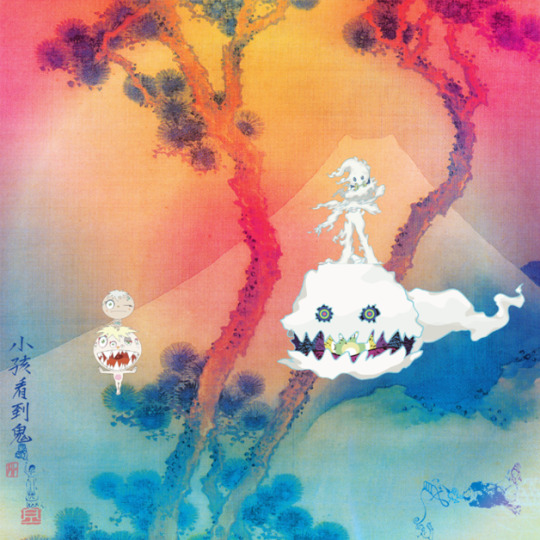
(G.O.O.D. Music/Def Jam)
Kids See Ghosts is a rare, rare breed of album that manages to take two artists and exact them both at the pinnacle of each of their abilities. Take Kanye West, at his most creatively unsettled, apparently cramming as many production ideas as he can into twenty-four minutes. Add Kid Cudi, and his apparently perfect range of singing, humming, harmonising and hook-crafting. Kids See Ghosts not only has them both at their creative peaks, but at their most lyrically relevant. West’s verses are incredible, eloquent and playful, reminding listeners exactly why he’s more than just a talented producer. He’s less confrontational and hubristic, while Cudi offers sensitive and deeply personal verses on his own journey through mental health problems. This is easily both artists’ best work this decade, an endlessly relistenable treasure-trove of a record that feels like more than just a genuine accomplishment, but justification that neither of these artists deserve any less reverence than they were deserving of in the first place. -E
I’m All Ears - Let’s Eat Grandma

(Transgressive Records)
British teenage duo Let’s Eat Grandma’s debut is enthralling, accomplished, experimental stuff. Channelling a broad range 80s synth pop idols such as Soft Cell and George Michael, but also taking obvious influences from modern pop artists like SOPHIE and The xx (not to mention Pink Floyd on ‘Calm and Collected’); Jenny Hollingworth and Rosa Walton’s ambitious songwriting, endearing lyrics and knack for poppy hooks aren’t just immaculately written and arranged, but make for some of 2018’s most addictive tracks. Virtually every track feeling like a single; the emotionally heavy ‘I Will Be Waiting’ or the jumpy ‘It’s Not Just Me’ are just as easily radio-friendly as the slow cut ‘Ava’, or the Oil Of Every Pearl’s Un-Insides run-off ‘Hot Pink’. Add to the mix the two long cuts, ‘Cool and Collected’ and ‘Donnie Darko’, and I’m All Ears gives a broad definition of the duo’s ambitions and talents, indicating their fondness for extended instrumental phases and ability for writing well-structured, impressively mature tracks. -E
Now Only - Mount Eerie
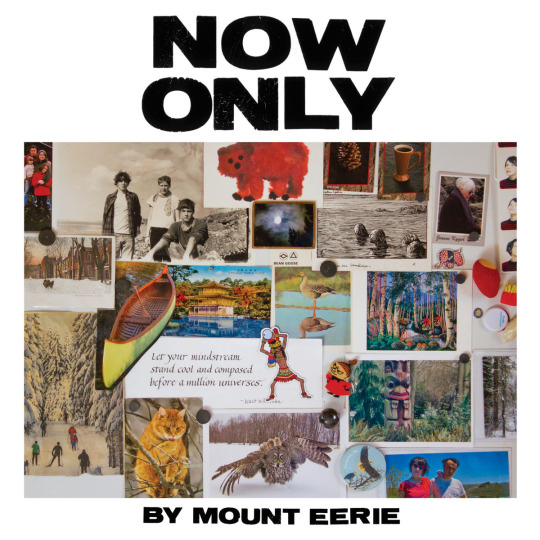
(P.W. Elverum and Sun)
Now Only, as a companion to last year’s A Crow Looked At Me, feels just as poignant a documentation of the process of one man’s grief as that record did. Slightly brighter and more reminiscent than purely devastated, Now Only shows improvements in Phil’s mental health not only through its themes and lyrics, but in how it expands instrumentally and structurally far beyond Crow, further toward the territory of the Mount Eerie work of old. Phil still has an unerring ability to chillingly plunge his listener back down to Earth with the utterance of a single, understated line, always having the reality of death looming over his vocals, no matter how wistful and optimistic they may seem. Phil can (like Kozelek, Malkmus, and few others before him) sing regardless of rhyme or pace, transcending lines and effortlessly fitting instrumental structures that occasionally err towards his work on Wind’s Poem or Clear Moon. Now Only is anything but another A Crow Looked At Me, an intense, documentary listen that demonstrates musical recovery as a metaphor for personal progress, that will (along with its companion live album, After) surely go down as one of the most profound artistic commentaries on death in popular music. -E
All Melody – Nils Frahm
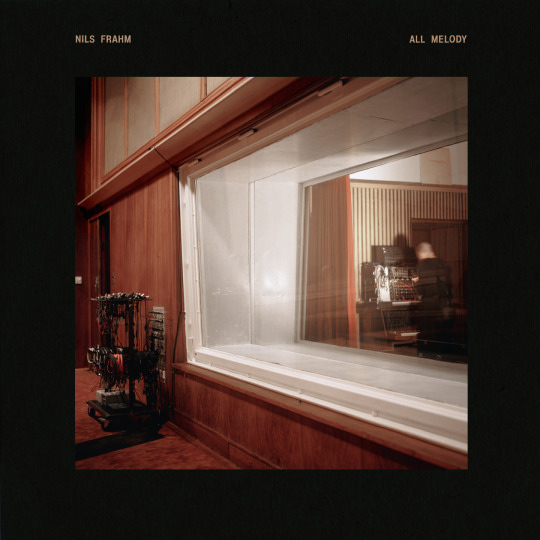
(Erased Tapes)
Nils Frahm’s All Melody is a real masterclass in progressive electronica. Following the atmospheric opener, ‘Sunson’ really kicks things off; a nine-minute rhythm-driven epic, with the pulsating hits of the bass marimba intertwined with pan-flutes and delicate synth melodies. From here we get an assortment of climactic electronic tracks, intense choral compositions and beautiful piano pieces, which somehow manages to maintain an impressive sense of cohesion and flow despite the disparities of sound. All Melody remains calm and meditative throughout, with a melancholic mood, but you never lose interest; each track is as captivating as the next. The attention to detail and texture, really make this album what it is; the nuances and subtleties give it the depth that an album with such ambition needs to stay interesting and emotionally compelling. A remarkably well rounded and unique album, incorporating qualities of techno, ambient and classical music to a devastating effect. -M
Wide Awaaaake! – Parquet Courts
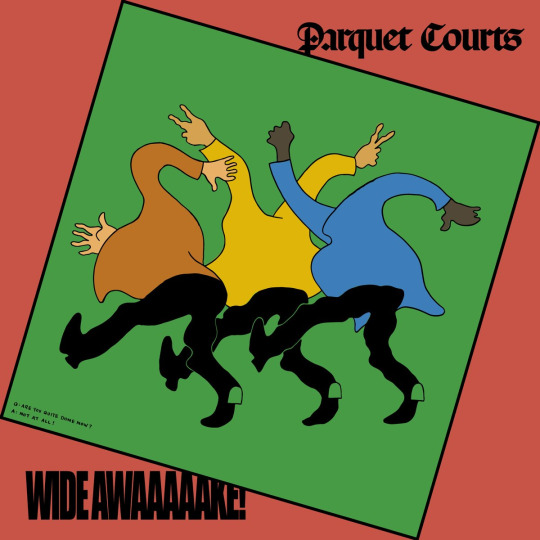
(Rough Trade)
Wide Awaaaaake! is a fantastic leap forward for Parquet Courts. The record is produced by Danger Mouse, a match that doesn’t necessarily make much sense on paper. However, the Grammy award winning producer allows Parquet Courts to run free, only adding his signature touches when completely appropriate. The result is that Wide Awaaaaake! is the groups most diverse record to date, with a wonderful sonic range from aggressive indie-punk to afro-groves reminiscent of Remain in Light. And the songwriting on this record is amazing. Savage and Brown hit gold with a dynamic blend of their classic art-punk rages and a more contemporary commentary. These lyrics are politically charged and socially conscious, yet done with such taste and style that nearly all pretension is avoided. Wide Awaaaaake! is a success on all accounts; Parquet Courts have experimented with their sound just enough to create something that sounds familiar but also entirely different. -M
DAYTONA – Pusha T

(G.O.O.D Music)
I think we’ve all been waiting for this for a very long time. Since Clipse broke up in 2010 and Pusha T started his solo career, there have been glimpses of brilliance, but his full-length projects have never truly delivered. Daytona, however is the perfect mix of his cocaine kingpin persona, political art rap, and gritty, challenging beats. All of these factors are typical of a Pusha project, but, under the direction of Kanye, there is a real sense of cohesion and focus which has been missing throughout Pusha’s solo career. The ending, Infrared is a particular highlight, as Pusha addresses the unscrupulous history of mainstream hip-hop, whilst also cementing his integrity within the genre; he truly is the ‘rapper’s rapper’. At a mere 21 minutes, this album will be one of the shortest in terms of run time you will hear all year, but it makes for an airtight listen, with no fillers – just straight bangers. -M
Compro – Skee Mask
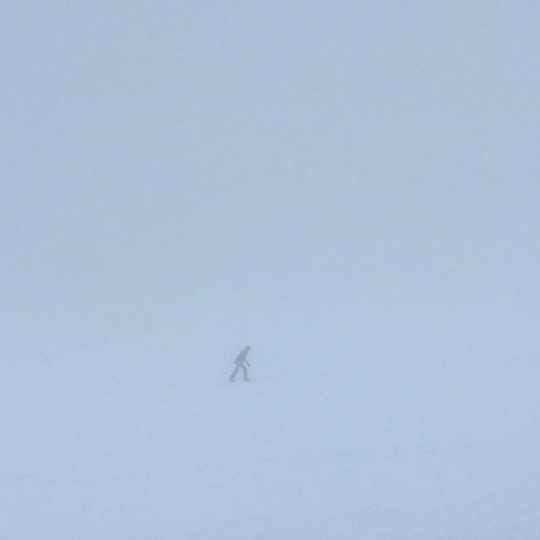
(Ilian Tape)
On Compro, Skee Mask takes us on a trancelike adventure into the heart of the arctic tundra and out the other side. The opener ‘Cerroverb’ sets the scene as reversed samples are paired alongside occasional bass flickers to create a cold, dreamy atmosphere. From here on in there is a subtle exploration through 90’s dance music, with influences including trip-hop, jungle, and everything in between. Through his keen ear for a melody, and ability to bring his drums to life, Skee Mask reminds us how devastatingly sensual the fundamentals of dance music can be. Compro is a masterwork of simplicity and perfectly timed progression. The subtle changes to the texture and the slow build-up of the breakbeats throughout results in a vastly nuanced record capable of mixing these cold ambient scores with the energetic breaks and techno beats. -M
Oil of Every Pearl’s Un-Insides - SOPHIE
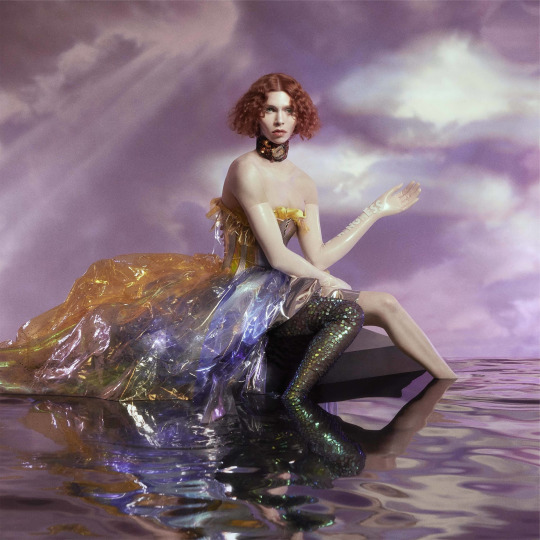
(MSMSMSM/Future Classic/Transgressive)
SOPHIE’s full length debut is as beautiful, beguiling and absurd as expected. Humorous and sincerely insane, Oil of Every Pearl’s Un-Insides ranges from achingly, tentatively soft to thunderously, tectonically loud, from dystopic drone to tongue-in-cheek BDSM references. It’s extravagant and knows it, and we wouldn’t have expected any less from the debut of one of contemporary electronic music’s most promising and revolutionary pioneers. Everything about Oil of Every Pearl’s Un-Insides is postmodern and glorious, displaying an excellence down both ends of the intensity spectrum; from the enveloping atmosphere of opener ‘It’s Okay to Cry’ to bombacity of EDM banger ‘Immaterial’. It feels exploratory of the capabilities of electronic music, seemingly including a take on Top40 pop, glitch, ambient and many, many other styles. A deliberately confusing listen, this is easily one of the most interesting albums of the year and one that I hope becomes a blueprint for others to copy in the years to come. –E
Superorganism - Superorganism
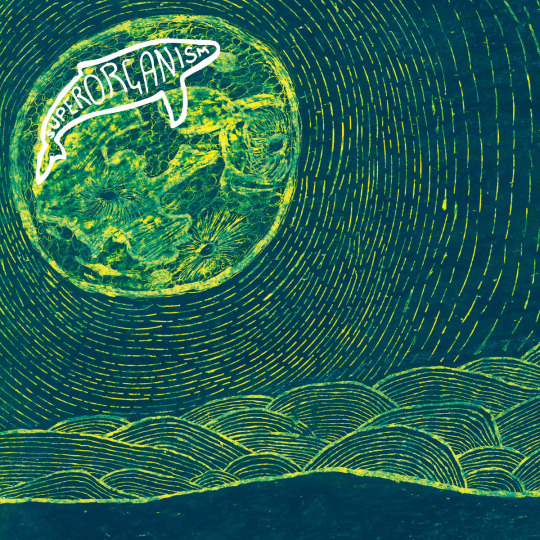
(Domino)
No one quite knows exactly what a “Superorganism” is (in musical terms), but if it’s some kind of eclectic creature churning out broad, slightly-left field and all-fun pop tracks, then this London-based, multi-continental eight-piece bedroom-pop collective fit the description pretty well. Don’t think too much when listening to Superorganism and it’s a joyous and bouncy, accessible indie pop album brimming with catchy choruses and ear-worming melodies. Listen deeper, and it’s jumpy and rich, glitchy and noisy; laden with quirky “found-sounds” like car horns and screeches, and playfully complex and layered. Playful, fresh and fun, the octet’s debut proves that mainstream pop doesn’t have to be mundane and formulaic, and that there’s a potential future in interesting, inventive pop music. -E
Konoyo – Tim Hecker
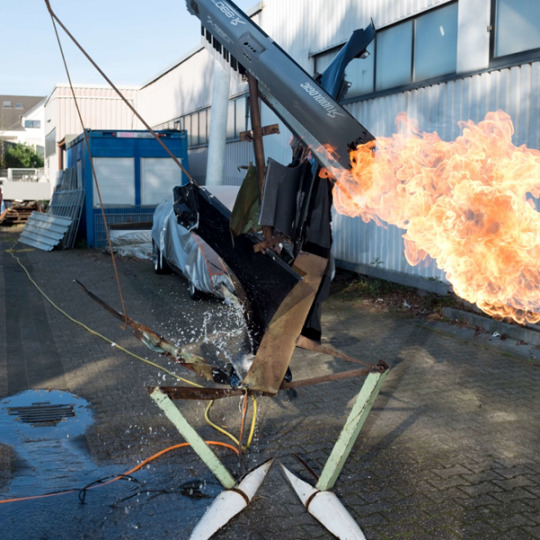
(Kranky)
Following the somewhat disappointing Love Streams, Tim Hecker is back on top, as he turns to Japan for inspiration – in particular the ancient courtly music known as [i]gagaku[/i]. The archetypal flutes, drums and strings of this traditional genre are contorted and manipulated, and eventually swept away into the cold and eerie electronic drones typical of Tim’s previous work. What emerges are vast soundscapes that are both minimal and monumental. Tim knows exactly what he is going for and is in complete control, able to fuse points of extreme simplicity and intense noise together so seamlessly. Konoyo is one of the most immersive listening experience you will have all year, and certainly puts itself forward as contender for ambient album of the decade. -M
Cocoa Sugar - Young Fathers
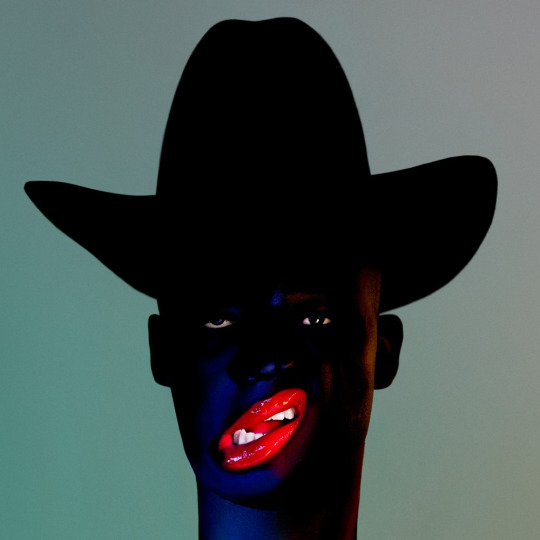
(Ninja Tune)
There aren’t many sounds in modern R’n’B as soothing as the three Scottish voices of Young Fathers, pining in tandem with their signature hypnotic, larger-than-life harmonies. Cocoa Sugar brings together the trio’s expansive, hymnal vocals and impassioned performances over instrumentals constructed of bass-heavy beats and minimalist melodic injections; crafting dense tunes with emotional weight and political potency. There’s an ardent politicism running throughout tracks like ‘In My View’, ‘Toy’ and ‘Border Girl’, as well as an undeniably British perspective that makes Cocoa Sugar relatable, relevant and important. On top of all that, it’s also impressively experimental; Young Fathers’ freedom from traditional song structures, accompanied by their distinctively alternative beat style, feels abstract and purposeful and unlike anyone else. This is their finest release yet, a brilliant demonstration of their stylistic breadth as well as their ability to work politics into their very particular niche of R’n’B. -E
2 notes
·
View notes